#he has 5 offspring with three different characters
Text
Watching Before and After and is there a character that Tom Paris DOESN'T have kids with???
#the ultimate dad#the most father#he has 5 offspring with three different characters#WILD#but also ya that tracks#tom paris#star trek voyager
24 notes
·
View notes
Note
Can we hear your opinions on why Ranni's ending is futile? It's really just too interesting to hear any opinions that aren't the mainstream "best ending, even has waifu" stuff.
I should start by pointing out that I don't believe in The Greater Will as a deity with goals of their own and this belief too extends to the other Outer Gods. For me, the Outer Gods of Elden Ring are at best higher beings that just exist, whose mere presence are capable of influencing the Lands Between, an influence not directly intended on their part – beings with no morality, who simply are. At worst, which is what I'm leaning more towards after the DLC, the Outer Gods are simply the deification of scientific phenomena. I'm currently working on a full theory regarding the gods of Elden Ring but it'll take a while as there’s just so much to gather and put together; besides, this is not the focus here.
So, let's talk about Ranni.
First, what is an Empyrean? Ranni answers this herself:
“(...) I was once an Empyrean. Of the demigods, only I, Miquella, and Malenia could claim that title. Each of us was chosen by our own Two Fingers, as a candidate to succeed Queen Marika, to become the new god of the coming age. (...)” [Speaking to Miniature Ranni at Nokstella, Eternal City]
An Empyrean is, to put it simply, a candidate to godhood. There are 5 in total we know of from base game: Marika, The Gloam-Eyed Queen, Miquella, Malenia and Ranni (the DLC opened up the possibility of two new Empyreans – Messmer and Melina, but this too is a conversation for another time). What I want to focus on is the word candidate. We know very little of the age before Marika ascended, much less about The Gloam-Eyed Queen's own ascension to godhood (if she ascended at all) but we never hear of more than one candidate to godhood – if there were, their existence was completely erased from history. From here, it's simple math: there's only one throne, but three candidates.
(...) No wonder, as one god, and one king consort, is all the world needs. [Light of Miquella]
There's an argument to be made about the possibility of these three ruling one after the other. Say, Miquella ascends to godhood but eventually his age comes to an end, Ranni could then ascend to godhood and start a new age herself. However, nothing is stopping new Empyreans from being chosen, not to mention Miquella's offspring if he chooses to do as Marika did. Ranni might never have needed to ascend to godhood herself. And everything points to her not having to – Miquella was the most likely successor, even without taking the DLC into account. From trying to grow his own divine tree to the Oracle Envoys present in only two locations: Leyndell and the Haligtree; there’s little doubt that, without interference, the next coming age would be his. But there’s someone we’re forgetting, someone who’s existence should put into question some things.
Miquella and Malenia are both the children of a single god. As such they are both Empyreans, but suffered afflictions from birth. One was cursed with eternal childhood, and the other harbored rot within. [Remembrance of the Rot Goddess]
Malenia's character has always fascinated me. She, too, is an Empyrean but, like Ranni, harbored no plans to ascend to godhood, although for completely different reasons. However, Malenia's condition is quite special. Without the help of her brother, the poor thing would have long since rotted away – how could she become a god? Except, she does, does she not? Time and time again Malenia is referred to as a goddess – by NPCs, by item descriptions, by her own second phase title. But she did not become the new vessel of the Elden Ring nor did she ascend to the Gate of Divinity – how can she have become a god? Interestingly enough, the term "god" seems to be used quite loosely in the world of Elden Ring. What exactly is a god? At first, it seemed that to become a god one must become the vessel of the Elden Ring. Then, in the DLC we learn that's not necessary and one must use the Gate of Divinity. But what about the Gloam-Eyed Queen? If she did ascended to godhood, there's no evidence of she ever going near Belurat. What about Placidussax's god?
The Dragonlord whose seat lies at the heart of the storm beyond time is said to have been Elden Lord in the age before the Erdtree. Once his god was fled, the lord continued to await its return. [Remembrance of the Dragonlord]
If the age before Marika's was Placidussax's god's, then how come we too have no traces of it in Belurat? How did it ascend to godhood, then? What does it even mean to become a god? I see it more as a symbolic title than anything – a title above that of a common monarch. In Imperial China, they had something called the Mandade of Heaven – the emperor was given the right to rule by a higher divine power and would be its representative on Earth. In European Christianity, they had something similar with the Divine Right of Kings. Doesn't this sound familiar? A person supposedly chosen by a higher power to become its representative and rule on their behalf? Isn't this Marika's ascent to godhood? But if this higher power doesn't exist at all, what then? If there is no Greater Will or it has long abandoned the Lands Between, then on whose behalf is Marika ruling if not her own?
But back to Ranni. We already established that she was unlikely to directly succeed Marika with Miquella still in the picture. Now, let's talk about another interesting subject in the world of Elden Ring – fate.
“(...) The stars alter the fate of the Carian royal family. And the fate of your mistress, Ranni. But long ago, General Radahn challenged the swirling constellations, and in a crushing victory, arrested their cycles. Now, he is the force that repulses the stars. If General Radahn were to die, the stars would resume their movement. And so, too, would Ranni's destiny.” [Giving Seluvis's Introduction to Sellen]
“The fate of the Carian royal family is guided by the stars. As is the fate of Lady Ranni, first heir in the Carian royal line. But General Radahn is the conqueror of the stars. Who stood up to the swirling constellations, halting their movement in a smashing victory. And so, if General Radahn were defeated, the stars would once again resume their movement. As would Lady Ranni's destiny. Perhaps, even, revealing the elusive path. That leads to Nokron.” [Meeting with Jerren then talking to Iji]
“Well, I am much obliged. I can hardly believe it, he’s divested himself of his very eye… Tender Miquella’s eye is no mere morsel of flesh. It is a vessel of soaring grace. Proof of his Empyrean lineage. I wonder, does Miquella the Kind intend to sever his very birthright? His fate as a child of the Erdtree?” [Speak of the cross where the eye was abandoned to Ansbach]
(...) Miquella set off for the tower enshrouded by shadow, abandoning everything—his golden flesh, his blinding strength, even his fate. (...) [Miquella's Great Rune]
(...) The fate of the one who sounds the hanging bell will be guided by the stars. [Hole-Laden Necklace]
The subject of fate, as shown above, is a recurrent one in Elden Ring. But does it exist? I won’t be discussing the topic of Miquella’s fate because that would derail the conversation and also make an already huge post a lot bigger, so let’s talk about Ranni’s fate. Supposedly Ranni’s fate is to ascend to godhood and bring forth a new age, dictated by her title as an Empyrean. However, this is when things get even more interesting. According to Iji and Sellen, as a member of the Carian royal family, Ranni’s fate is dictated by the stars. Once we defeat Radahn, the stars resume their movement and so does Ranni’s fate. But wait a second. Ranni is on a quest to sever her fate as an Empyrean and to slay her Two Fingers but if her fate is in fact ascending to godhood and said fate is resumed once the stars are released, then how come these very stars open the way to the tool she needs to sever her fate? Wasn’t her fate to become a god? Then how come it's working in favor of her severing her fate as an Empyrean? On the other end, if her fate was instead to slay her fingers and free herself of the title of Empyrean, then wouldn’t halting her fate be counterproductive? Wouldn’t it be better staying put? However, if she did so then she wouldn’t have slain her own Two Fingers and she’d remain an Empyrean, and her fate supposedly wouldn’t come to pass. Great, we’ve landed ourselves on a paradox. This, however, can be easily solved by the conclusion that fate does not exist. The stars weren’t actually holding back Ranni’s fate, they were merely the only way to open up a path to Nokron. If the hole on the ground wasn’t open, we never could have reached the Fingerslayer Blade.
So, we’ve established that Ranni was unlikely to succeed Marika, that “god” is more of a title than anything, and that fate might not even exist. What’s left is discussing The Age of Stars ending.
"(...) To every living being, and every living soul. Now cometh the age of the stars. (...)" [Age of Stars ending cutscene]
"(...) Mine will be an order not of gold, but the stars and moon of the chill night. (...) Which is why I would abandon this soil, with mine order. (...)" [Speaking to Miniature Ranni at her chambers]
In her ending, Ranni restores the Elden Ring, takes the Tarnished as her (Elden) Lord, and together they go off to space, bringing forth the Age of Stars.
Huh, this is so weird. I could swear I’ve heard of a type of person capable of bringing forth a new age before.
“But Ranni did not ascend to godhood!” Does it matter? We’ve already established that godhood seems more of a status thing than anything. What does it matter if she didn’t go through the formalities? Just like Marika, she is now responsible for the Elden Ring, just not the direct vessel of it. She also took a consort, like Marika, Miquella and Placidussax’s god. She also brought forth a new age, the Age of Stars. So, what exactly is she doing different? The Empyrean title never came with direct instructions of what kind of age they must bring. Bringing forth her Age of Stars is no different than bringing forth the Age of Order or the Age of the Duskborn. Their purposes are different but their core model is the same.
This is why I say Ranni’s struggle with her “fate” as Empyrean is futile, in the end. Had she settled on just slaying her flesh and Two Fingers, she’d have her complete freedom. But her insistence in supposedly pursuing everyone else’s freedom as well is what made her relinquish her own. I’m sorry but you can’t convince me that her ending is the freedom she envisioned for herself. Everything she did to free herself just so she would spend the rest of her days isolated from the rest of the world? Yes, no one has power over her now but at what cost?
#to me ranni's story is one huge dramatic irony#girl was so focused on setting herself free she did a whole 360° and landed herself right where she started#elden ring#ranni#ask#luca.txt
4 notes
·
View notes
Note
(TW- fictional incest) What do you think about the possibility of a romantic relationship between Sam & Mary? Like not in a 'I ship this' way, but rather in a 'that's something that would be interesting to see explored in thr story' way. I am aware that SPN, for all it’s blood and blasphemy, was not a grownup enough show to handle that dynamic in a sophisticated way. Thoughts?
Thank you for your question and wow, this is a really big one, I’m not sure I can answer in a satisfying way but I’ll do my best!
I’ve broken down your question in three parts, let’s start from the easiest :P
"The show was not grownup enough to handle that dynamic in a sophisticated way":
I think one of the reasons why SPN is so loved and has inspired so many people to write *things (fanfics, articles, metas, you name it)* about it is because it’s so rich in terms of myths it’s insane. I’m not simply referring to “the lore” but, from a storytelling pov, you can explore so many themes it’s difficult to choose from: two brothers’ rivalry, the spouse’s blind vengeance for their partner’s death, the mother dying to protect her son, offspring carrying the sins of their parents (just to name a few)… I mean, literally it’s crazy, this is the stuff ancient mythology is made of.
So, on one hand, I give credit where credit is due and, in this case, to SPN writers because they somehow managed to weave (not always successfully) all these difficult threads together. The show lasted for 15 seasons because the actors were hot, yes, but also because the storytelling foundations were solid. On the other hand, it was maybe “a little bit of everything all of the time” and this translated sometimes into superficiality, some other times into “let’s sacrifice the plot on the altar of X theme” and it didn’t always work out.
I’m saying all this because, after s5, the biggest event in terms of foundational themes is the return of Mary. Carver spent his tenure as showrunner to reach that apex and it was a pity that he wasn’t the one who completed that arc. I think he was an interesting writer and he was clearly heavily invested into exploring the theme of family and the taboos pertaining to it. To sum it up: the show could’ve handled Mary and Sam’s relationship, they had all the raw materials ready to use and indeed they used them. How? Let’s see…
“that's something that would be interesting to see explored in the story”:
I think that they’ve explored their relationship in s12. One of the possible readings for Mary in that season is that they basically gave her the 101 of s1-5 Sam’s arc. Mary is similar to Sam, like a lot. At least she's so narratively speaking. She starts off being thrown back in a world she didn’t want to be part of anymore and ends up in a different dimension with Lucifer. Sounds familiar?
The relationship between Sam and Mary, however, is not so much portrayed in much needed screen-time between the two characters (to my distress) but it’s prevalently mirrored in their MOTW episodes. And, let me tell you, it’s not a good one. I’d like to explore each episode but I don’t want to kidnap your precious time on this planet so I’ll just use “American Nightmare” as an example (also because it’s a great episode).
Yes, Magda has psychic abilities so the parallel with Sam is blatant. She is also considered The Devil by her mother. Oh-oh. She’s also a prisoner who’s forced to torture herself and bleed for her sins. Oh shit. Sam is pissed at Gail, Magda’s mother (“God didn't kill your daughter. You did”). Later, Gail will try to murder her whole family, her husband’s the first to go, then her son steps in to protect Magda and, eventually, Sam manages to convince Magda not to kill her mother. Meanwhile, Sam is tied up to a chair, unable to do anything but screaming. I thinks he feels a bit castrated. Interesting. From what I can infer, Sam is subconsciously livid at this mother. He hasn’t healed his separation wound. This is why he’s the first to smell something’s off with Mary even though she’s basically a stranger to him. This is also why he doesn’t even make an attempt at reaching her, the ties between them are very much severed. Of course, consciously he wants to know his mother and play the good-kid role for her. But scratch that surface and Sam’s totally not okay with Mary. And what about her? She feels guilty. Guilty for her past actions and guilty because she understandably doesn’t feel a real connection with the two adults in front of her. So she does the Sammest thing ever (but levelled-up) and asks for space to breathe. You see, it’s very very complicated.
The show has explored their relationship but only in the foreground and only via the MOTW episodes. Dean’s got his moment with Mary because, of course, this is also about him and he had to have it but, from the story pov, he was also the reason why she was back on earth so, you know, they had to complete that arc for him. That was okay with me as I was hoping that s13 had something more in store but it was a total disappointment as far as Mary and Sam’s relationship is concerned (well, tbh, it was a disappointment as far as everything is concerned but okay). So, again, to sum it up: I think the show explored Sam and Mary’s relationship specifically in s12 but what we’re offered is nothing exceptionally encouraging because there is a rift between them (seriously, s12 ends with a literal rift: symbolically it represents birth as both coming into the world and being separated from the world: the ties between The Mother and The Son are forever severed).
"a romantic relationship between Sam & Mary":
It’s time for the difficult part. Surprisingly, it’s also something I think about a lot.
Short premise: I adhere to a school of thought according to which stories are ways to explore our conscious and unconscious mind (mostly the second). Characters in a story play the role of some of the parts of our mind we cannot reach. For instance, I believe that it’s possible to interpret siblings in a story as the different side of the same coin representing a single part of our mind. Basically, siblings in story symbolize opposite things that must be integrated in order to move on. In a word, everything I’ll say from now on must be interpreted as symbolical.
As I said, I think that Sam and Mary’s relationship’s main feature is separation. Interestingly, there’s an ancient myth that combines the themes of motherhood, separation, romantic union and… castration. I’m talking about the myth of Attis which, I believe, could’ve been a way to explore Sam and Mary’s relationship.
Like all ancient myths revolving around the archetype of the Great Mother there are many different versions of this story. This is one of them (I apologize in advance for the deplorable retelling of such an ancient and fascinating myth): Agdistis was an ancient hermaphrodite deity closely related to the cult of The Great Mother of whom other deities were afraid of. They decided to tie them to a tree and evirate them. From their male genitalia an almond tree was born. Nana, the daughter of a river-god, picked one almond and became pregnant with Attis. He was later abandoned and raised by goats. Agdistis met him and fell in love with him. Attis was supposed to marry the king’s daughter and Agdistis, in the grip of jealousy, made Attis go insane and he ended up evirating himself by a tree.
Why am I talking about castration and mothers? Well, because this is a story about the separation wound, specifically pertaining to virility. It’s also a story that ends where it begins and this is exactly there s12 starts and ends too. Imo, it can be applied to Sam and Mary, too. Agdistis (Mary) being The Great Mother, the Alpha and the Omega, is separated from something that’s theirs in a brutal and coercive way. They are tied up and dismembered. Attis is born because of a violent act of separation that he’s forced to repeat. Sam as Attis also ends up tied up and dismembered in a brutal and coercive way. He has no voice at all. The two are basically the same person because they were the same person before separation happened. I know this all sounds sad but in ancient Rome they used to have a festival in Attis honor where people whipped themselves (just like Magda, come to think of it) to symbolize Attis’ castration and consequent death and, the next day, they would celebrate his resurrection (it’s a festival closely associated with Easter and it was celebrated around the same period, i.e. spring equinox).
To sum up: romantic relationship can’t even begin to cover how messed up Sam and Mary’s relationship is. We’re talking about The Love Above All, the unconditional love, something that, unfortunately, Sam has never discovered in the series. Mary was an opportunity for him to integrate this part and be able to move on a little with his life. Mary’s a bit different because in s13 we see that her guilt eases up a bit as she sees the world where she didn’t make the choices she made. Still, in terms of her relationship with Sam, working together, getting to know him would have maybe worked wonders in accepting that a part of her life was taken from her forever but that didn’t mean that all is lost. Reconnection and reunion are always possibilities.
Okay, wow, that was a lot. I still don’t know if I was up to the task, I did my best! Thanks again for your question, again, it’s a big one but I loved writing about it! I hope you enjoyed reading it (fingers crossed)!
2 notes
·
View notes
Text
FRESH MANNA
PRAISE HIS NAME!
Psalm 145
It is good to give thanks to the Lord, to sing praises to the Most High declares Psalm 92:1 and our text is an incomparable Psalm of praise that the Jews have such high estimation for that they assert that, if one reads it with sincerity of heart repeatedly three times daily, one will enjoy the infallible blessings of the world to come.
How can one extol and magnify God’s majestic splendour?
This marvellous psalm is bursting with attributes of God and revelations of his character:
He is compassionate to all his creations.
He is gracious, generous, loving, all-powerful, righteous, watchful, protective, near to us, great and good, and ever faithful.
The passage also reveals some of God’s titles: Judge, King, and Lord.
Think of the Saviour: Jesus is the Bread of Life, the Light of the World, our Counsellor, our Good Shepherd. Prayerfully studying and meditating on the character traits and names of God is one of the most faith-building, encouraging things you can do for your spiritual life.
Praise will dispel your anxiety, boost your faith and help you trust God more.
Knowing the true character of God will renew and transform your mind with the truth, dissolve any doubt you may have, and breathe life into your soul.
The Lord is good to all—There is not a soul in the world that is not continually under God’s merciful love.
His tender mercies—His bowels of compassion are over all His works; He feels for His intelligent offspring, as the most affectionate mother does for the child of her bosom. And through this matchless mercy, these bowels of compassion, His son Jesus tasted death for every one of us.
David was praising and celebrating God for His goodness and generosity toward His creatures, especially His people. One remarkable feature is the way David used so many different words for “praise”: “extol”; “bless”; “praise”; “commend”; “declare”; “meditate”; “speak”; “pour forth”; “sing aloud”; and “give thanks, can you think of a better way to praise and celebrate the name of your Father, creator, and God?
Hallelujah! What we all shout in worship is the English word for Hālal, a Hebrew word for "to praise." It is to boast in, glorify, extol, and celebrate the Lord who is most "worthy of praise," and David seemed to have had a standard of boasting in his God and praising Him in everything and all circumstances.
Will you dare to praise God?
Praise His name! We don’t have to wait for victory before we praise the Lord as learnt from David and as directed by Paul in 1 Thessalonians 5:18, let praise and thanksgiving be your lifestyle.
Giving thanks and praise to God is required of all believers in acknowledgement of God’s sovereignty and gratitude for all the goods that come from his hands and then give Him the praise due for His grace and mercy.
Leah was so full of gratitude and praise to God that she named her son Judah! A confession of God’s goodness to her in Genesis 29:35.
How do you confess your gratitude and praise to God?
Consider how great God is, then consider how sinful and mortal we are. Then consider how great God’s love is for you. How can we help but praise him? He is powerful enough to sustain the universe and loving enough to redeem it.
Loudly declaring the attributes of God while thinking about how you’ve experienced different aspects of his character is a powerful act of worship. Praise His name!
Take a few moments to pray this psalm aloud. Ask God to reveal Himself to you in greater clarity than you’ve ever experienced before and PRAISE HIS NAME!
PRAYER: The Lord is my strength and my song; he has become my victory. He is my God, and I will praise him; he is my father’s God, and I will exalt him for creating and loving me enough to be my God through Christ Jesus. Amen.
Shalom
WOMEN OF LIGHT INT. PRAYER MIN.
#spotify#devotional#christianpost#women's ministry#biblestudy#biblestudy christianpost women's ministry#biblestudy christianpost 'women's ministry#conference#family#prayer meeting
0 notes
Text

What Kind Are You?
“God said, Let Us [Father, Son, and Holy Spirit] make MANKIND in Our image, after Our likeness…” Genesis 1:26AMPC (emphasis mine)
Within Genesis 1 Moses used the word ‘kind’ ten times — ‘kind’ definition [noun] —‘character; nature; a group of people or things having similar characteristics,’ to identify what type creatures’— sort-type of-kind that were to reproduce each after their own kind. Three ‘kinds’ He created were Bovines — cattle, Canines— dogs, Loxodontas— elephants— all which were to reproduce after their ‘kind.’ Not intermixing reproducing to become cow-dogs. In our text verse, another ‘kind’ of species is introduced. Humans were created to be “MANKIND,” the EXACT ‘KIND’ of reproduction, the ‘model’ of Yahweh-Jesus-Holy Spirit.
According to our text, “mankind” was made to be the “image”— per dictionary image is— ‘a physical likeness or representation of a person.’ Slightly different from the image is “after Our likeness” —‘likeness’ per dictionary— ‘the semblance or appearance of something.’ We were created, above the angels and only slightly lower than Yahweh’s Trinity. Mind boggling.
Everyone has seen model cars— those really classy, metal, model cars show the auto undercarriage, which looks like the real auto, even the steering wheel will turn the front wheels. On the box is usually written ‘1/32,’ meaning the real auto is 32 times larger. God said He was making humans as miniature models of the real deal— Himself-His-Trinity— exciting.
All of my childhood, and a good portion of adulthood, I saw myself as less than other people. Even born again, I saw myself as an inferior Believer to other Believers and just general people. Until I taught a Bible study at church on Breaking Through To Spiritual Maturity I listened to and believed those lies of satan. Then I learned, I am made in His image, and supposed to look and act like Papa God. I am God’s little princess because He is the King of kings and my Father.
For the believer in Christ, we are to be far above our worldly counterparts. Our spirits are alive inside of us. We’re to hunger and thirst for righteousness, (Matthew 5:6), reading His Bible and praising Him is our natural state of being— “for “In Him we live and move and have our being’; as even some of your own poets have said, “‘For we are indeed His offspring.’ Being then God’s offspring, we ought not to think that the divine being is like gold or silver or stone, an image formed by the art and imagination of man” Acts 17:28-29ESV. Without Him we would be the empty— dead ‘kind.’
What ‘KIND’ are you? People walk around using drugs, drinking alcohol, steeped in sin with wealth, poverty, health, sickness, the good life, the worst life— all the while knowing something is wrong. For these people something is missing. What’s missing is God. Their spirit is dead, that part which makes them the God-‘kind’ because Jesus isn't living in their spirit. Nothing replaces or fills God’s place within us, except Jesus-God-Himself.
If you are walking around never being satisfied; always feeling like part of you is missing— you’re probably right. You are missing your species of the God ‘kind.’ This problem is easily changed by repenting. Repent per Mark 1:15AMPC “…the kingdom of God is at hand; repent (have a change of mind which issues in regret for past sins and in change of conduct for the better) and believe (trust in, rely on, and adhere to) the good news (the Gospel)” Will you repent now and ask Jesus to come into your heart, changing your mind, will and emotion, bringing life to your soul to recreate you into the God ‘kind?’ It’s your choice. You choose.
LET’S PRAY: Heavenly Father thank You for making us in Your image, just a little lower than You in authority and likeness. Help us to begin to resemble You in all we say and do, in the name of Jesus Christ I pray.
by Debbie Veilleux
Copyright 2023 You have my permission to reblog this devotional for others. Please keep my name with this devotional, as author. Thank you.
#Jesus Christ#lord of lords#word of god#Holy Spirit#God#it's your choice#devotional#what kind#image#likeness#exact#authority#believer#characteristic#love#hope#faith
0 notes
Text
Some more or less common Greek mythology misconceptions that I am particularly annoyed by/tired of seeing (not including misconceptions concerning the personalities of the major gods or else I’d be here all day typing this):
1. Chaos is male
- Chaos is not personified in the way Gaia, Ouranos, Nyx or other so-called primordials are, so in this sense we can hardly call it either male or female. In fact, the word is neuter in gender, though considering that Chaos seems to sort of “conceive” (with or without a partner) and “give birth”, it behaves more like a female deity. Nonnos does seem to refer to it as a male though, so it’s not entirely baseless.
2. Chaos is some kind of all-powerful being, the creator of everything and akin to the Christian god
- Uhm, not at all? In Hesiod’s Theogony Chaos is the first being to come into existence, that much is true, but the only deities that emerge from it are Erebos and Nyx. The passage in Hesiod describing the cosmogony is often interpreted in a way that makes it look like the other actually self-generated beings (Gaia, Tartaros, Eros) were born from Chaos rather than simply after it and with no connection to it, but the text definitely doesn’t say this. Look at any translation of the Theogony and compare the way Gaia and Nyx are described as coming into existence. In the more or less parodic cosmogony from Aristophanes’ Birds, all that chaos “creates”, not alone but mating with Eros, is the race of the birds. In the different Orphic cosmogonies and the cosmogony of Pherekydes, the first being in existence is called Chronos (Time), or Nyx (Night) sometimes even Hydros (Water), with Chaos being usually simply one of the offspring of Chronos and the actual creator deity being Phanes/Protogonos. Differing genealogies aside, there is absolutely no evidence of Chaos being a particularly powerful, revered or feared deity, let alone omnipotent or the like.
3. The Titans are a different species than the gods
- The Titans are a subcategory of gods: all Titans are gods, but not all gods are called Titans, just like all Olympians are gods but not all gods are called Olympian. The Titans are often referred to as “Titan gods” and those of them who receive worship are worshiped just like any other god. That said, if we restrict the word god to only actual religious figures, then indeed quite a few Titans aren't gods, since they don't receive any worship and are just literary characters.
4. Kronos is the god of time
- Kronos the king of the Titans was identified/confused with Chronos (Time) in later ancient texts, especially in the context of philosophy, but Kronos has nothing to do with time in either myth or cult and Chronos was generally acknowledged as a different being, the god (sometimes described as a three-headed serpent) who generated the great cosmic egg.
5. Only the sons of Kronos fought in the Titanomachia, his daughters sat idly by and cheered from the sidelines... or something
- It is true that, unlike their brothers, Hestia, Demeter and Hera are never said to receive any weapons or magical items from the Kyklopes. However, Hesiod clearly mentions both males and females among the combatants: “So he said: and the gods, givers of good things, applauded when they heard his word, and their spirit longed for war even more than before, and they all, both male and female, stirred up hated battle that day, the Titan gods, and all that were born of Cronos together with those dread, mighty ones of overwhelming strength whom Zeus brought up to the light from Erebus beneath the earth.” and Nonnos has Hera claim that she “took strong part in the war against Kronos her father and helped Zeus in his fight.”
6. As the oldest son Of Kronos, Hades should have been the rightful king of the gods
- primogeniture is not a thing among the Greek gods. Ouranos was not the eldest primordial, and Kronos was explicitly the youngest Titan god.
7. Zeus became the king of the gods unfairly and/or he cheated during the division of the cosmos
- in all the accounts we have regarding the Titanomachia and the events immediately preceding and following it, Zeus has by the far the most numerous and important contributions. He, among other things, freed his siblings from Kronos, found allies among the older gods and their children, liberated the Hekatoncheires and the Kyklopes and thus gained vital assistance from them in the war, and even personally fought Kronos for the throne (Pausanias 5. 7. 10). According to Hesiod he became king at the urging of the other gods and with the support of Gaia, and Kallimachos says on the subject that “Lots did not make you (Zeus) king of the gods, but the works of your hands, your strength and power, which you have set by your throne.). As for the casting of lots which Homer and other authors mention, there is no indication that it was rigged in Zeus’s favour..
8. Poseidon is more powerful than Zeus
- Poseidon doesn’t seem to agree, judging by what he tells Hera in Book VIII of the Iliad: “‘Wild words, Hera, ever reckless in your speech! I’d wish none of us to quarrel with Zeus, the son of Cronos, mightiest of us by far.’”.
9. Hera never wanted to marry Zeus, she had to be tricked into it or she only married him out of shame after he raped her
- in the one account in which Hera refuses to marry Zeus, she is persuaded by a son of Gaia and there is not the slightest suggestion of rape or trickery or anything of the sort; in the one account where Hera refuses to have sex with Zeus because of their mother, he promises to make her his wife in response and there is no indication that she keeps refusing him after this, though there is no mention of her accepting either, and the one account that seems to involve assault makes no mention of marriage.
10. Hera takes issue with and persecutes all or most of Zeus’s side pieces and children
- Nowhere near close to that. Leto, Io, Semele and Kallisto are the only women she is consistently shown to punish in varying accounts. As for children, she is angry at the birth of Athena in several sources, in multiple accounts tries to prevent the birth of Apollon, and famously persecuted Dionysos and Herakles from their birth onward. Needless to say that Zeus had sex with far more women and fathered far more children than these
11. Hera persecuted Leto even though Zeus’s relationship with her took place before he married Hera
- there is precisely one single source in which Zeus’s relationship with Leto precedes that with Hera, and it so happens that this particular source says nothing about any persecution of Leto at Hera’s hand. In Apollon’s Homeric Hymn, the oldest detailed account of his birth, Hera is not only already involved with Zeus at the time of Leto’s pregnancy, but she also has at least one child with him, Eileithyia, whom she uses against Leto causing her to suffer the pains of labour for nine days and nine nights. In Kallimachos Hymn to Delos, again a very detailed account of Leto’s pregnancy, Hera is quite clearly Zeus’s wife and Leto his mistress. In this account, too, Hera already has at least one child with Zeus, Ares, and she uses him (and Iris) to harass and make life difficult for the pregnant Leto. In fact, in this source, Hera is upset by Leto's pregnancy precisely because she is about to bear a son who will be dearer to Zeus than the son he already has by Hera.
12. Hera doesn’t hate Athena because she was the product of a previous marriage of Zeus, so before Hera became his wife
- Be wary of any generalisations of this sort, as they are usually seriously reductive takes on complex and often contradictory traditions, not to mention that, in this instance, such an idea is not actually supported by any source. Indeed Hera doesn’t seem to hate Athena, but there is no evidence that she hates most of the other children of Zeus, either. The idea that Athena is somehow an exception to Hera’s universal hatred for everything sired by Zeus is born from misconception #10. As a matter of fact, the birth of Athena makes Hera exceptionally angry in those literary sources in which her reaction is mentioned, regardless of whether Metis is said to be Athena’s mother or not. Like in the case of Leto, there is precisely one source where Zeus’s relationship with Metis precedes his marriage to Hera, not that it has any relevance, since even in that account Hera is absolutely furious and quarrels with Zeus after he “gives birth” to Athena, and she has Hephaistos on her own. In the Homeric Hymn to Apollon her anger is made even more explicit than in Hesiod’s Theogony -- she outright states her offense at Zeus giving birth to Athena by himself, after which she plans to have a child on her own; not Hephaistos this time, as in this account he already exists when Athena is born and was rejected by Hera who compares him unfavourably to Zeus’s new daughter. Not only does she have a child on her own like in Hesiod’s Theogony, but she actually leaves Olympos, specifically prays for a child stronger than Zeus and stays away from the other gods for an entire year during which “never at all she came to the bed of great Zeus of the counsels, never at all she took the elaborate throne where aforetimes she had been seated, devising for him grave counsels of prudence;”. This is the most extreme reaction she ever had to the birth of any child of Zeus. Speaking of complex and contradictory, in the Bibliotheke of Apollodoros Zeus is already married to Hera when he has sex with Metis, yet Hera is not mentioned here to give a damn about Athena’s birth. Meanwhile in a fragment attributed to Hesiod, a quarrel between Zeus and Hera is the catalyst for the engendering of both Hephaistos and Athena: “Out of this strife she [Hera] bore a glorious son by her devices, without Zeus who holds the aegis, Hephaestus, who excelled all the sons of Heaven with his skilled hands. But he [Zeus] lay with the daughter of Ocean and beautiful-haired Tethys, apart from fair-cheeked Hera, deceiving Metis, shrewd though she was.”. In short, Hera sometimes is angered by Athena��s birth, sometimes she doesn’t seem to care, in one tradition (attested in art rather than in literature) she apparently rejoiced as if Athena were her daughter too. Whether Zeus’s relationship with Metis takes place before or after his marriage to Hera, or even whether or not Athena is said to have a mother at all, has no bearing on Hera’s anger.
13. Hera threw Hephaistos from Olympos because he was ugly
- Both Hera (Homeric Hymn 3) and Hephaistos (the Iliad) make it clear that Hera wanted to get rid of this son of hers because he was disabled.
14. In another version, it was Zeus who tossed Hephaistos off the mountain, not Hera
- yes, but in the version where Hera is responsible for this deed, Hephaistos is a baby rejected because of his deformity, while in the accounts where Zeus is responsible for his fall, Hephaistos is grown and incurs Zeus’s anger by trying to interfere with Hera’s punishment. There is no version in which Zeus tosses Hephaistos from Olympos as a baby, or in which he is motivated in doing it by his deformity or by the fact that he is only Hera’s child.
15. Poseidon raped Medusa in Athena’s temple and the goddess transformed her into a gorgon in punishment
- this is the Roman poet Ovid’s reimagining of Medusa and it has no basis in ancient Greek sources. In the Greek texts Medusa is born a gorgon, albeit a mortal one and has sex with Poseidon “in a soft meadow and among spring flowers”, according to Hesiod.
16. Athena turned Medusa into a gorgon in order to protect her
- absolutely baseless and revisionistic idea, which also conveniently ignores the fact that Athena helped Perseus Kill Medusa.
17. Hera cursed Echo
- Again, Ovid’s tale. I have never found any ancient Greek source that connects Echo with Hera in any way. Instead, the one responsible for Echo’s predicament is Pan, whose sexual advances she refused and in revenge she was torn into pieces.
18. In some versions, Persephone went willingly with Hades
- This is an old one and people just adore it, but no one has yet managed to find any actual evidence supporting this idea.
19. In the original version of the myth
- Just no.
20. Hekate is Hades’ friend and/or underling
- Nope. Hekate is associated with Demeter and Persephone, not with Hades. She helps Demeter in the search for her daughter and becomes Persephone’s companion in the underworld.
21. Ares and Eris (or Enyo) are twins
- There is no evidence for this. Eris is called the sister of Ares in the Iliad, Enyo is called his sister in Quintus Smyrnaeus’ The Fall of Troy, but there is no indication whatsoever that either of them is his twin.
22. Hera, Poseidon, Athena and Apollon attempted and failed to overthrow Zeus. Hera, Poseidon and Apollon were punished for it (she by being suspended in chains from her wrists, the other two by being “made into mortals” and being forced to build the walls of Troy), but Athena received no punishment because of parental favoritism
- The only primary Greek source that mentions this event in some detail and names the participants is Homer’s Iliad, where Apollon is not mentioned alongside the other three and where no punishment is talked about for any of them in the context of this rebellion. We hear in Book XV of Hera’s infamous punishment at Zeus’s hand, but the reason for it is her persecution of Herakles, not her participation in any coup against her husband. Later we learn of Poseidon and Apollon building the walls of Troy (or Poseidon building the walls and Apollon herding Laomedon’s cattle) at Zeus’s command, but Homer never gives a reason for this. In the Bibliotheke of Apollodoros, Hera’s hanging is likewise attributed to Zeus’s anger for her persecution of Herakles, and Poseidon and Apollon are said to have built the walls of Troy in order to test Laomedon. Some scholiasts, it is true, have added Apollon to the list of rebel gods mentioned in the Iliad and have attributed punishments to them. However, since Homer says nothing about them being punished for that particular reason, the scholiasts had to take the punishments of gods mentioned in the Iliad and 1) in the case of Hera, entirely change the motivation for her punishment; 2) in the case of Poseidon and Apollon, attribute a reason for their service for Laomedon; 3) in the case of Athena, leave her without a punishment because, loyal to her father as she is in all but this particular story of rebellion with Hera and Poseidon, there were no instances of her being punished to use here.
23. Goddesses are shamed for having sex
- It is true that goddesses seem to be far more restricted than the gods in this sense, but nowhere near as restricted as mortal women. Aphrodite, Demeter and Eos all have sexual relationships with multiple people and are not judged (Hephaistos making a public scandal over Aphrodite and Ares and Aphrodite punishing Eos for sleeping with her lover are exceptions based on the relationships between the characters) or considered lesser for it, nor do they suffer any personal consequences, though their mortal partners might.
24. Ares is so often portrayed negatively because he was the patron god of Sparta. The Athenians weren't on good terms with the Spartans and since most myths come from Athens, Ares is the victim of Athenian propaganda and this is why Athena is always portrayed as being superior to him.
- First of all, the negative portrayal of Ares as compared to Athena precedes the conflicts between ancient Sparta and Athens. Moreover, other gods were actually more important for the Spartans than Ares and the Athenians respected and worshipped those gods all the same. And funnily enough, that story that people like to bring up when arguing about how Ares is actually a better person than other gods, the one about him killing the man who assaulted his daughter and being put on trial as a result, is an Athenian myth.
25. Makaria, the daughter of Hades, is married to Thanatos
- Good luck finding any legitimate sources claiming this.
#this post could go on forever#these are just a few I see most often or which I find most egregious#there's more to be added#ramblings#pet peeve#greek mythology#misconceptions
37 notes
·
View notes
Text
Restless Rewatch: Nirvana in Fire - A Primer
(Masterpost)
Warning: Mild spoilers for the first 5 or 6 episodes
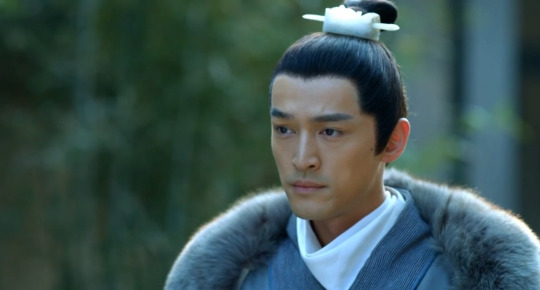
I have injected all 54 episodes of Nirvana in Fire (The TOS/first series, not the TNG/second series) directly into my neck vein in the past week, having initially bounced off the first episode the three previous times I tried to watch it. I thought a primer might be useful for people who are undecided about watching it, or who are finding the first episode as confusing as I initially did.
This will be followed by Episode recap posts, although not (I hope) at the pace or word count of my Untamed recaps (which are ongoing!). (Edit: see masterpost for more)
I watched it on Viki but I think it’s on Youtube as well.
What is Nirvana in Fire and Why Should I Watch It?
Nirvana in Fire (aka Langya Bang) is about this guy, Mei Changsu.
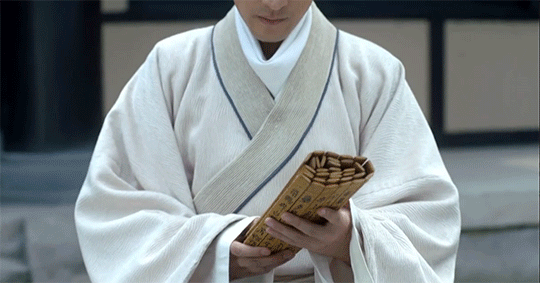
He goes by various names in the drama but we're just going to call him Mei Changsu for simplicity. He's looking for justice and he's very very clever. He's also sickly and obviously dying possibly doesn't have very long to live.
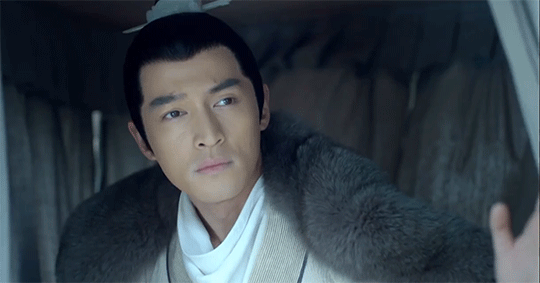
He's secretly a member of the royal family, and all of his old friends think he's dead. He had a medical trauma that turned him into a different actor, so most of his friends can't recognize him. In order to get justice, he needs to shake some things up in the capital, so he goes there and starts manipulating people.
The Pugilist World
He's also, conveniently, the head of a Wuxia ("pugilist" in most subs) society that's like the CIA of the Warring States Period. This gives him a good supply of friendly minions.
His main people from the Pugilist side of things are:
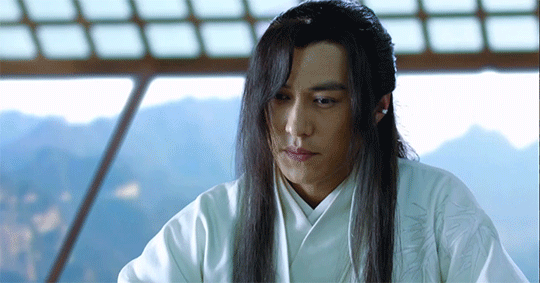
Sarcastic Kung Fu doctor. He's important in the first episode and then we don't see him for like 40 episodes and then he's important again.
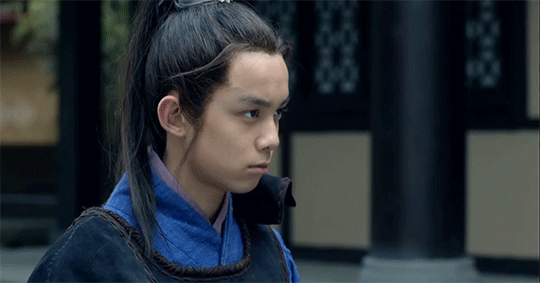
Sullen/adorable Kung Fu adolescent, who is nearly unbeatable and is played by the kid from Tomb of the Sea & Fights Break Sphere. He is with Mei Changsu throughout the story as his bodyguard and reminder that MCS has a soft heart sidekick.
(more after the cut!)
The Court
Over on the court side of things, there's an emperor, who is a paranoid jerk, but also has some layers to his personality. He’s not a cartoonish villain.
Happily, the show doesn’t lean too hard into the whole “I dare not!” thing where nobody can talk normally to anybody in the court because they’re afraid of being executed.

Chinese emperors got to choose the next emperor from among their offspring, rather than being constrained by primogeniture like European monarchies, so sibling rivalry basically reached its apotheosis in Chinese Imperial families. Among this emperor’s progeny are four princes who actually matter.
1. Prince Qi was executed as a traitor, but wasn't a traitor, and Mei Changsu wants to clear his name, along with the names of all of his supposed followers who were also executed.
2. The Crown Prince, who is in favor. He is dumb. He looks like this:
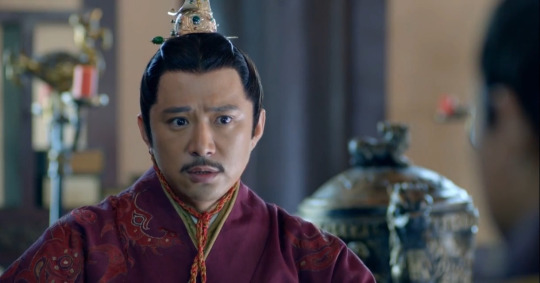
3. The not-crown Prince, who is in favor and wants to become crown prince. He is smarter than the Crown Prince but not as smart as Mei Changsu. Nobody is as smart as Mei Changsu. He looks like this:
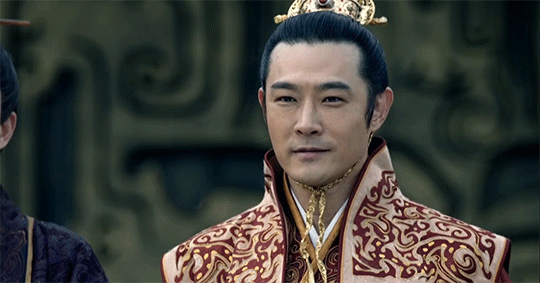
4. Prince Jing also wants to clear Prince Qi's name and insists he was innocent, so he is out of favor. Prince Jing is a fine upstanding moral heroic dude, who has a temper and can’t keep his mouth shut.
Prince Jing looks like this.
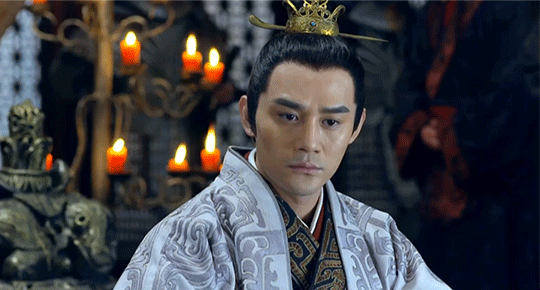
So, we're rooting for prince Jing, obviously.
Mei Changsu is also rooting for Prince Jing because
They were best friends back when Mei Changsu was a young, different-actor guy without a medical trauma
He'll be a good ruler
He, like Mei Changsu, wants to clear up this whole traitor situation
He looks like this:
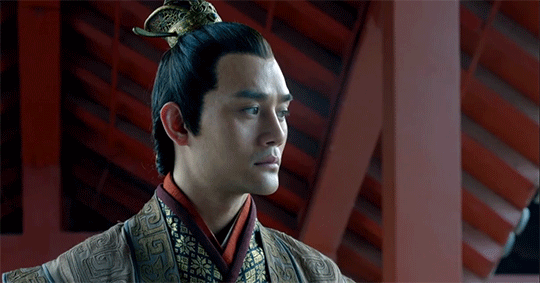
The Friendships
In the current time, Prince Jing doesn't know who Mei Changsu is so he doesn't fully trust him, and talks smack about his values. At the same time he just *feels* an affinity for him and they look at each other like this.
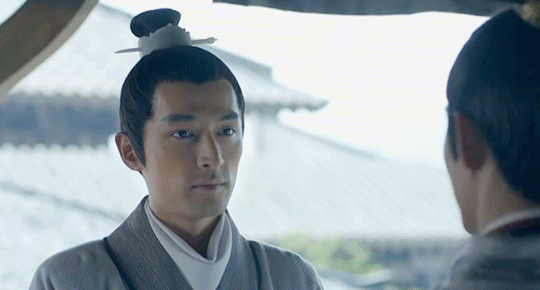
Do they lock eyes like that for the entirety of every conversation? Yep, pretty much.
Also Mei Changsu's old girlfriend is in the picture, and she's fucking awesome, which makes the shipping situation complicated when the Changsu x Prince Jing energy is so strong.
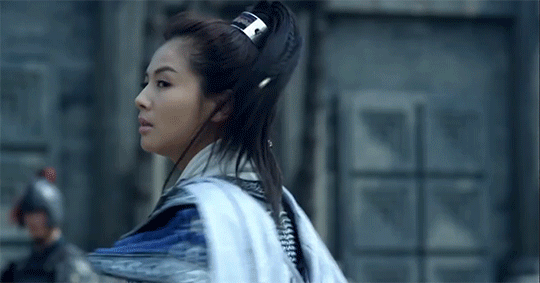
This is how she gets onto a horse:
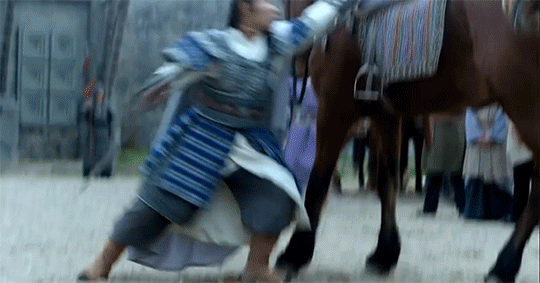
Here Mei Changsu is pretending that he is a dude she just met, rather than her long-lost fiance (who, reminder, had a medical trauma resulting in a totally different actor changed appearance).

Gazing heatedly and with maximum intensity at a person is a good way to pretend you don’t know them.
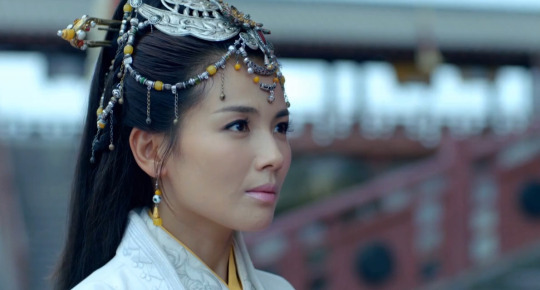
I think she’s fooled, don’t you?
She conveniently disappears for like 25 episodes in the middle of the show, which uncomplicates the shipping situation a bit, for a while, anyway.
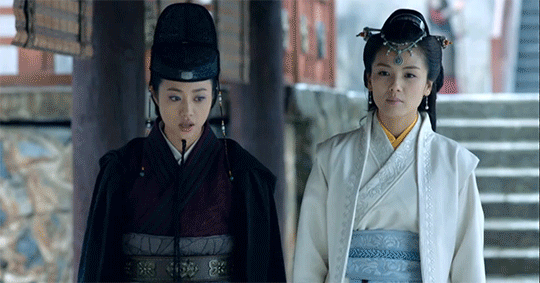
She has a best friend who's the Wuxia version of a tough lady cop, speaking of shipping.
There are a pair of young friends who share one brain cell and hang out with Mei Changsu, and who develop in interesting ways as the story progresses.
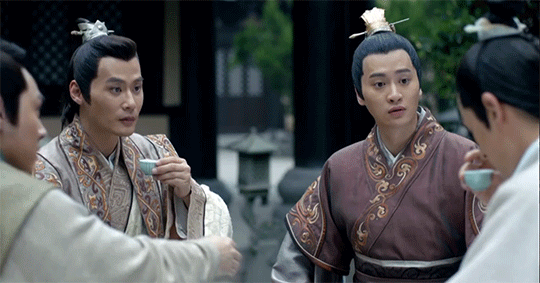
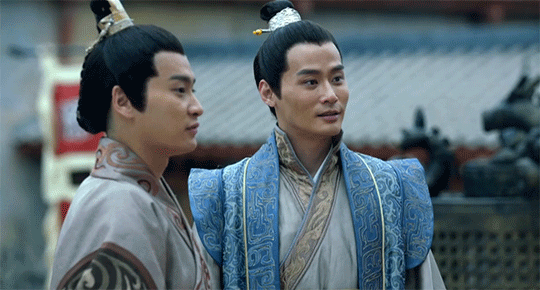
Then there's the guard captain who is an old friend who DOES know who Mei Changsu is, who's super hot and...not the sharpest nail in the horseshoe.
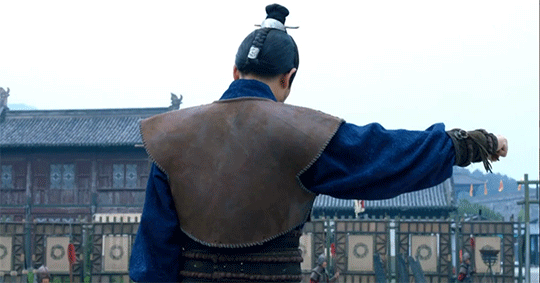
Captain Handsome is the only guy who can beat the Kung Fu kid.
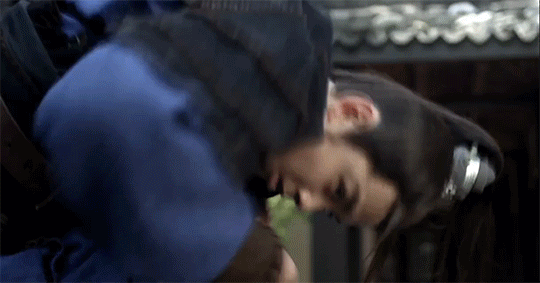
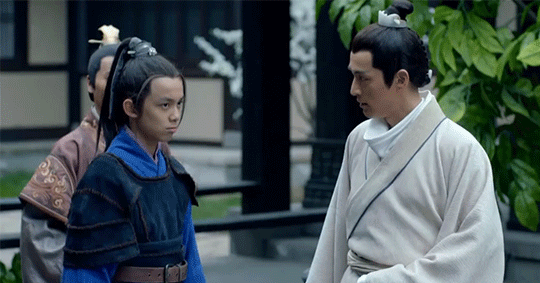
The Plot
Mei Changsu wants to clear the names and restore the honor of a whole lot of dead people--an entire army full of them--and the best way to do that is to put his friend in a position of power.
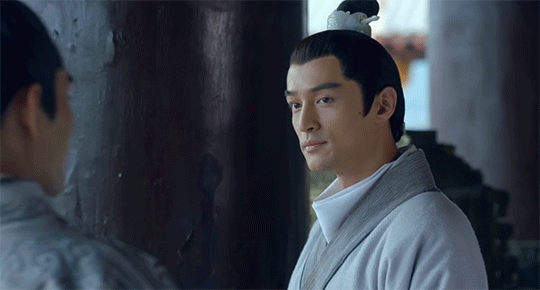
He assembles a bat-team and then starts playing an extremely complex game of political Weiqi, driving opponents into impossible situations and taking them off the board one by one, while they work to do the same thing to his forces.

The emotional connection between Mei Changsu and Prince Jing is hugely important to the story, but they don't spend most of their time together - they're working in different spheres toward a single goal, touching base often but not sharing many lighthearted moments or spending a lot of time socializing.
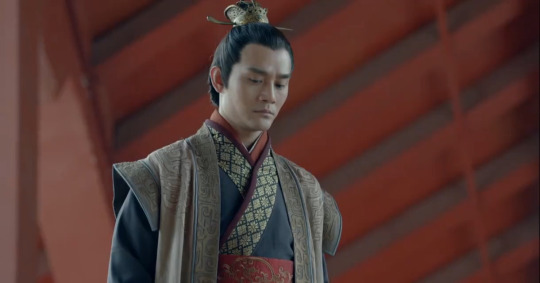
So if you're craving a best-friends adventure story or a (covert) BL romance story, this isn't it. But the emotional journeys of the two main dudes are incredibly deep, and each of those journeys gets ample screen time.
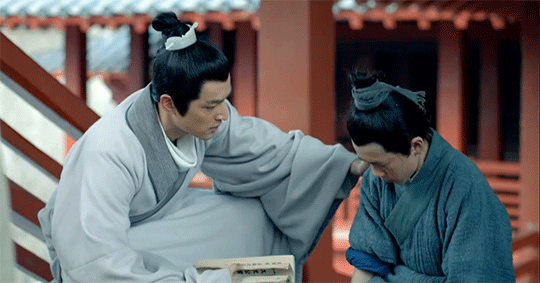
The M/F romance is also deeply important to the characters’ journeys but it’s not primarily about being together; it’s about working together toward a higher purpose.
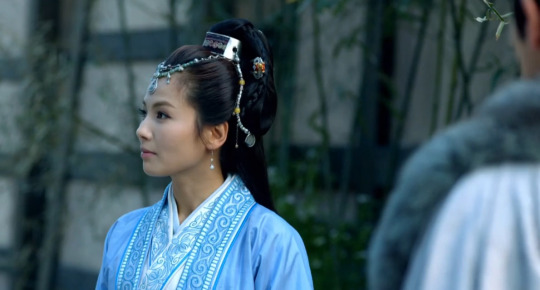
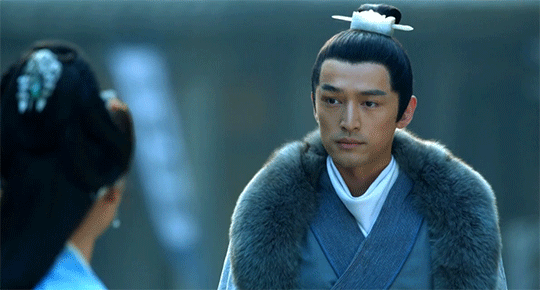
Is this a normal way to react when a woman you don’t really know brings you to visit the empty house of a condemned criminal you never met? Sure. Is it normal of her to randomly bring you to your own abandoned house when she just met you? Probably!
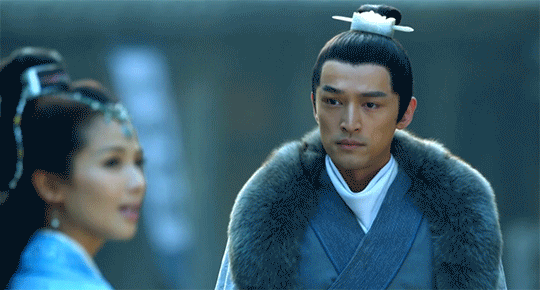
Is it reasonable for a man to look this good in blue fur? No!
Fundamentally this is a plot-driven story, with really no filler -- story threads that seem unrelated all weave back into the main story, and stories about side characters tell us important information about the main characters.
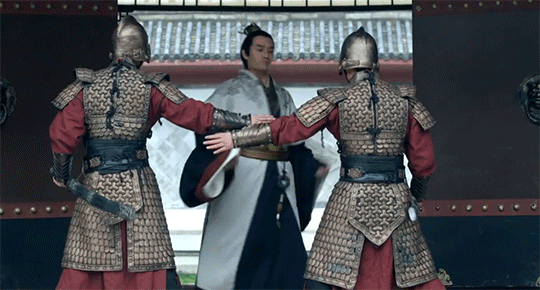
It’s a truly beautiful story about seeking justice and bringing peace to the souls of the dead--it’s not a revenge story, and Mei Changsu has a surprising amount of compassion for the people he opposes, even while he’s manipulating them into ruining their lives.
It's. Freaking. Awesome.
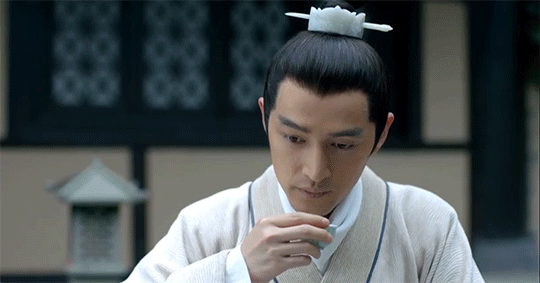
#nirvana in fire#langya bang#mei changsu#cdrama#wuxia#nirvana in fire spoilers#restless rewatch nirvana in fire#canary3d-original#my gifs
667 notes
·
View notes
Text
To celebrate Loki being confirmed as canonically queer in the Loki series, please enjoy this 12,000 word, fully referenced dissertation exploring Loki’s genderfluidity in Norse Mythology and Marvel comics....
Myth-gendering Loki: Changing attitudes to gender non-binary in the afterlives of the Prose Edda.
Abstract
This dissertation focuses on the character of Loki in the Prose Edda and in Marvel Comics as a way of exploring non-binary gender. The first chapter will use myths involving Loki as case studies through which a queer reading of the Prose Edda can be performed. Developing on the notion that the gender ambiguity in the Edda sets the foundation for Loki being a queer character, the second chapter will acknowledge how some of the most recent interpretations of Loki have fully embraced this aspect of his character and will therefore examine how this is presented through the two different mediums of comics and novels. The value of queer reading means that greater representation can be found not just in modern texts but can be sought out in the historical as well. Through the course of this dissertation, the importance of queer representation has been argued with regards to its place in history and to young adult audiences.
List of Illustrations
Figure Page
1. Stan Lee et al Journey into Mystery (New York: Marvel Comics, 1952), #85 35
2. Al Ewing et al Loki: Agent of Asgard (New York: Marvel Comics, 2020), #2 35
3. Al Ewing et al Loki: Agent of Asgard (New York: Marvel Comics, 2020), #14 35
4. Al Ewing et al Loki: Agent of Asgard (New York: Marvel Comics, 2020), #2 35
5. Al Ewing et al Loki: Agent of Asgard (New York: Marvel Comics, 2020), #5 36
6. Al Ewing et al Loki: Agent of Asgard (New York: Marvel Comics, 2020), #16 36
7. Walter Simonson et al, Thor (New York: Marvel Comics, 1966). #353 36
Contents
List of Illustrations
Introduction: ……………………………………………………………………………………………………………… 1
Chapter One: Loki in the Edda: ………………………………………………………………………………….. 4
Gender Ambiguity: ………………………………………………………………………………………… 5
Sexual Deviance: …………………………………………………………………………………………… 10
Race: ……………………………………………………………………………………………………………… 15
Chapter Two: Loki in Marvel: ……………………………………………………………………………………. 20
Genderfluidity: ………………………………………………………………………………………………. 21
Existing as Queer: ………………………………………………………………………………………….. 28
Identity: …………………………………………………………………………………………………………. 30
Conclusion: ………………………………………………………………………………………………………………… 37
Bibliography: ……………………………………………………………………………………………………………… 39
Introduction
‘The greatest power of myth: it never stops changing, yet its appeal is eternal’.[1]
Mythology is not something which is set. With every telling and retelling it changes over and over. Even before Snorri Sturluson wrote the Prose Edda in C.1220, the myths he would commit to paper had undergone countless changes innumerable times. Once they had found their way onto the page, the assumption that they would remain there, unchanged, is therefore unwarranted. As Christopher Abram states: ‘Myths of the Pagan North have grown, changed and developed to meet the needs of the new situations in which they find themselves’.[2] With regards to this concept of changeable mythology, this dissertation sets out to examine how the Prose Edda has been changed and developed to adapt to the requirements of modern societies. Using the character of Loki as a point of entry, this dissertation will examine how the Prose Edda has been interpreted to meet these requirements, centring around the concept of non-binary gender. To achieve this, both the original text and Marvel Comic’s interpretation of Loki will be examined through a critical gender and queer perspective.
Gender as something else which is not fixed is an idea first suggested by Judith Butler. Her 1990 book Gender Trouble theorises the concept of performative gender, suggesting that masculinity and femininity are not fixed and are instead performed identities which are acted out constantly. In short gender is not a matter of biology, but instead something governed by the arbitrary rules of a heteronormative ethos. These rules, therefore, can be broken leading to the rise of gender identities that exist outside the sphere of heteronormativity. Genderfluidity and non-binarism define themselves as resistive to the conformed ideas of a binary between masculine and feminine. These terms are not only useful for defining gender identities found in our modern societies but can also be used as tools to re-examine the Edda with, using a queer lens to scrutinize gender performance in this text.
The queer lends itself effectively to the Edda because of the numerous examples of gender inversions. The Poetic Edda especially features gender deviance, with Thor crossdressing in the Thrymskviða,[3] and the questioning of Odin’s masculinity in the Lokasenna.[4] However, for the purpose of this dissertation, only Loki’s role in the Prose Edda will be examined due to it being the most consistent in terms of gender ambiguity and elements of the queer. Although Loki changes between male and female in both this text and the Marvel texts, the pronouns of he/ him will be used to remain consistent with the primary texts. Queer scholarship of the Edda does have some recent precedents, with critics like Brit Solli examining the role of Odin as a queer god, but historically the queer elements of the Edda have been explained away.[5] The main reason cited for this is the difference between the perception of the queer today and of its perception during the composing of the Edda. Although it is true that placing modern terms onto historical texts and forcing certain characters into categories that did not exist at the time can be problematic, this does not mean that a queer reading does not have relevance. Instead, it opens a new way of understanding a culturally significant text.
The Edda has experienced multiple literary afterlives, from Wagner’s Ring Cycle to a significant influence on Tolkien’s work. Most people, however, will first encounter Norse mythology through the medium of Marvel, especially after the phenomenon of the Marvel Cinematic Universe. This is why two Marvel texts, Al Ewing’s 2014-15 comic series Loki: Agent of Asgard and Mackenzi Lee’s 2019 Young Adult novel Loki: Where Mischief Lies, have been selected as examples of how mythology has been adapted to meet the needs of their new situation, namely queer representation. Loki is canonically queer in these texts, both in his sexual orientation and gender identity. Increasing diversity has been a clear part of Marvel’s agenda over the last decade, though usually through the introductions of new characters, like Kamala Khan as Ms Marvel. Loki is one of the few already established characters to be reinvented as queer. Although Marvel’s Loki is an entirely separate character to the one found in the Edda, he retains the same archetypical characteristics ensuring he resonates with the original. Whether queerness is one of these innate to Loki and is therefore essential to his character will be examined.
Why Loki so effortlessly lends himself to queer interpretations, evidence of his genderfluidity as well as the intersection of the queer, gender and race will be explored in the first chapter. Marvel’s interpretation and embracement of Loki as a genderfluid and queer character will be the focus of the second, examining how genderfluidity is presented, the pressure to conform to heteronormative societies, and the overarching issue of identity. More widely, this dissertation will argue for the queering of characters from the Edda in modern adaptations.
Chapter One: Loki in the Edda
The Prose Edda is one of our main sources for Norse Mythology. However, as it was written in Iceland around C.1220, the Edda was composed several centuries after Norse paganism had been widely practiced with Christianity replacing it as Iceland’s main religion.[6] The author Snorri Sturluson himself was a Christian and, according to Robert Kellogg, ‘largely functions as a collector or reteller’.[7] I mention this not to question the authenticity of the Edda, but to demonstrate that mythology is always subjected to change. Jan de Vries argues that Norse Mythology has undergone three different stages; a period without Christian influence, suppression from Christian forces, and a final version corrupted by a Christian presence.[8] Those backlashing against diversifying mythological figures often cite ‘original’ texts like the Edda, suggesting diversifying is corrupting the ‘real’ version of this figure. If the oldest existing version of Loki was changed to fit a Christian narrative, why should he not be changed again in modern texts to fit a narrative of queer representation? Nevertheless, this chapter will use the Edda as a way of finding evidence that even this version of Loki has innate queerness.
In the Gylfaginning, where Snorri lists all the main gods, Loki is positioned in between the male Æsir and female Asyniur.[9] Anna Birgitta Rooth refers to this position as a ‘special appendix’[10] which separates Loki from the Æsir gods he is ‘reckoned among’.[11] He is listed after the minor Æsir, making him the last of all the male gods, as this denotes his position as an outsider in the gods society. It also places him in between the male and female categories, hinting at his gender ambiguity. Snorri makes sure that Loki’s sexual deviancy is presented to his audience by listing Loki’s monstrous offspring alongside him, ‘One was Fenriswolf, the second Iormungand (i.e. the Midgard serpent), the third is Hel’, in addition to his mixed racial heritage. [12] When stating Loki’s name, ‘He is Loki or Lopt, son of the giant Fabauti’, Snorri identifies him as the child of the enemies of the gods. [13]
In Loki’s first significant appearance in the Edda, it is possible to read gender ambiguity, queer sexual deviance, and racial anxiety. Some readings of the Edda will try to explain these elements of Loki away. [14] For example, Rooth argues against examples of Loki sexual ambiguity as ‘a motif used to produce comical effects and situations’.[15] This dissertation will instead embrace queerness in the Edda, using Loki as a focal point that intersects gender ambiguity, sexual deviance, and racial anxiety. These three elements of Loki will form the structure of this queer reading of the Edda.
Gender Ambiguity
Before analysing the gender binary found in the Edda, it is important to establish what this meant to medieval Scandinavian societies. For the time of the Edda’s creation and the subsequent oral tradition of Norse myths, Thomas Laqueur defines a ‘one sex model’ where ‘to be a man or a woman was to hold a social rank, a place in society, to assume a cultural role, not to be organically one or the other of two incommensurable sexes.’[16] With regards to this model, Carol J. Clover argues that male and female were not considered opposite in the way modern societies tend to view them. Instead there was ‘a social binary, a set of two categories, into which all persons were divided, the fault line runs not between males and females per se, but between able-bodied men (and the exceptional woman) on one hand and, on the other, a kind of rainbow coalition of everyone else’.[17] This meant that gender was not necessarily assigned to biological characteristics but social ones and, consequently, fluctuated with social status. This can be linked to modern gender theories regarding the connection, or lack of, between biological sex and gender identity. Butler’s theory is particularly notable, arguing that ‘there is no gender identity behind the expressions of gender; that identity is performatively constituted by the very “expressions” that are said to be its results’.[18] However, during the Norse period, Clover notes the peril that came with this one-sex system: ‘Not only losable by men, but achievable by women, masculinity was in a kind of double jeopardy for the Norse man’.[19]
The notion of losable and achievable masculinity is illustrated by a story found in the Skaldskaparmal section of the Edda. After the kidnapping of Idunn (which Loki both caused and remedied), the giantess Skadi ‘took helmet and mail-coat and all weapons of war and went to Asgard to avenge her father’ the giant Thassi, who had been killed by the Æsir gods. [20] As part of her compensation for this, Skadi demanded that the gods made her laugh, believing this would be impossible. The task fell to Loki who uses a rather unconventional method: ‘he tied a cord round the beard of a certain nanny-goat and the end round his testicles, and they drew each other back and forth and both squealed loudly. Then Loki let himself drop into Skadi’s lap, and she laughed’.[21] Each character in this tale represents a different aspect of fluidity within the Norse gender binary: Loki represents the loss of masculinity; Skadi represents the gaining of masculinity and the goat itself represents a kind of sexual ambivalence.
Loki’s loss of symbolic masculinity is demonstrated through physical loss in this mock castration. Stefanie von Schnurbein describes this as ‘an act that places his dubious sexuality and gender identity in a grotesque light’.[22] Loki is not only physically sacrificing his masculinity, but his symbolic masculinity simultaneously. This demonstrates ‘dubious sexuality’ because Loki is displaying his testicles in a show of masculinity only to have them symbolically removed by an animal. This willingness to sacrifice his physical gender characteristics supports Butler’s concept that gender is performative and therefore has no relation to biological sex because Loki takes on a performative role, playing a sexually impotent male. Consequently, he is placed into the gendered jeopardy that Clover suggests since he loses his maleness and, therefore, his social status. This reduction in status is a fitting punishment for Loki who betrays both the gods and the giants earlier in this myth so ends up being humiliated for their entertainment. Clover notes how in Medieval Scandinavian society ‘there was finally just one "gender," one standard by which persons were judged adequate or inadequate, and it was something like masculine’.[23] In this system, Loki is undoubtedly found inadequate, and fails to meet the standard of masculinity, placing him on the opposite side of the binary.
Evidence of this decreased masculinity can be found in the position Loki ends up in. He falls into Skadi’s lap, thus ends up sitting on top of her which, in addition to his exposed genitals, creates a sexually charged image.[24] However, Loki is in the female position while Skadi is in the male for this pseudo sex position.[25] Clover notes how, despite gender not being connected to biological sex, the Norse gender system has a ‘dependence on sexual imagery’, meaning that Loki being positioned sexually as female adds to his decreased masculine status. [26] This demonstrates not only how Loki has lost his masculine status, but how Skadi has gained her own masculinity.
This increase in masculinity therefore increases Skadi’s status. She wears a helmet and mail-coat to take on the celebrated masculine image of a warrior; a position that was accessible to women in medieval Scandinavian society as long as they gained the necessarily masculine traits and became, as Clover states, ‘exceptional’.[27] It is this embodiment of the ‘exceptional woman’ that allows Skadi to take revenge in the first place. Preben Meulengracht Sørensen argues that in Medieval Scandinavian society ‘a woman cannot herself take revenge; she must do so through the agency of a man’.[28] Skadi refutes this. Although she does not repay the death of her father in violence, she succeeds avenging her loss through the humiliation of Loki, whose betrayal led to her father’s demise. On the other hand, Sørensen may be right to say only men can take revenge. Skadi has gained enough masculinity to be perceived as socially male within the Norse gender binary. She takes on the image of a warrior and goes to Asgard to demand compensation to restore her family’s honour. The fact her biological sex is female makes little difference. Clover explains that Medieval Scandinavian society was ‘a world in which a physical woman could become a social man’, and this is what Skadi achieves. [29] In later myths, such as the Lokasenna, she is seen feasting with the gods demonstrating her heightened status considering she is not only female, but a giant as well. Moreover, Skadi lives independently without a male guardian. Although she may replace her father with Niord, the husband she gains as part of her compensation for her father’s death, this marriage fails and Skadi lives alone. According to Clover, Medieval Scandinavian society was ‘a universe in which maleness and femaleness were always negotiable, always up for grabs, always susceptible to ‘conditions’.[30] Snorri’s literature provided a safe space to explore these ideas and push the limits of this system. A system that accepted a certain fluidity between genders, but the condition was always one that supported a transition from female to social male but derided the reverse.
The final and most surprising character in this myth is the goat itself. Although seemingly playing only a minor role, the goat symbolises sexual ambiguity and the transition between genders. The nanny-goat is a female animal with male characteristics such as a beard thus combines masculine and feminine in one form, making it a symbol of gender non-conformity. Beards particularly in Norse literature are symbolic of male vitality.[31] There is a connection, quite literally, between Loki and the goat which implies Loki himself is sexual ambiguous. The goat is the one who removes Loki’s masculinity, and therefore, is the vessel through which Loki transitions from physically male to socially female. Margaret Clunies Ross highlights the ‘symbolic equation here between Loki, who plays at his own castration and has a reputation for sex changing, and the sexually ambivalent nanny-goat with the beard and horns’.[32] John Lindow also suggests the presence of the nanny-goat creates doubt over Loki’s perceived masculinity: ‘if the beard attached to one end of the rope is here a false symbol of masculinity, what are we to make of the genitals attached to the other end?’.[33] It is important to remember that Loki himself ties the goat around his testicles. He chooses this method to make Skadi laugh and does so willingly. This disproves Rooth’s notion that Loki’s gender ambivalence is depicted by ‘the epic course of events’[34] since the feminine display here is Loki’s choice and raises the question: why would Loki willingly sacrifice his own physical and symbolic masculinity? Perhaps he does not. It would only be a sacrifice of masculinity if Loki had already embodied the ideals of a Norse man. Loki famously takes on physical female forms throughout the Prose Edda, such as during Baldur’s death[35] and The Fortification of Asgard[36] myths, meaning his masculinity is already questionable. If Loki is prepared to become physically female, becoming socially female matters little by comparison. Loki, after all, is the trickster god; he will use whatever shape, form, or gender to his advantage.
Clover describes the Norse sexual system as a ‘permeable membrane’[37] and stresses an interest in the ‘fluidity implied by that system’.[38] This is a system in which a person can choose to move between feminine and masculine if they do not care about the social consequences for their actions. As discussed previously with reference to Loki’s position in Snorri’s list of gods, Loki is already socially at the bottom of the male Æsir and his status places him in between them and the female Asyniur. With a status already this low, Loki loses nothing when he reduces his masculinity and embraces his position as a social female. To navigate the Norse universe with such a diminished status, Loki uses everything to his advantage, including embracing his own femininity.
Sexual Deviancy
There are multiple terms in Old Norse relating to sexual deviancy with ergi, nið, ragr, and argr, as the most common. Although their meanings do differ slightly, essentially, they are all insults declaring someone as cowardly, weak, and unmanly due to an association with queer sexuality. Ergi especially encapsulates this idea of weakness being associated with sexual deviance, making it the most fitting term to use in this subsection. It fits within Laqueur’s one sex model aligning courage and strength with the masculine, and weakness with the non-masculine. Evidence of the seriousness of these insults can be found within Icelandic law. Grágás, the oldest Icelandic law text to survive, states that ‘one is entitled to kill on account of these words’. [39] Floke Ström also states that ‘the law prescribes its most severe penalty, outlawry, for anyone who imputes womanly behaviour to another in the form of nið’.[40] The severity of the punishment highlights just how negatively sexual deviancy was viewed. Those guilty could be anything from accused magic users, effeminate men or those taking the receptive position in homosexual intercourse, referred to problematically as ‘passive homosexuality’ by some Norse scholars. Loki is associated with all three of these elements, even exhibiting all at same time in the myth of the Fortification of Asgard.
This myth is found Gylfaginning chapter of the Edda. To prevent a disguised giant builder from completing the fortifications around Asgard and claiming the sun, moon and Freyia as his payment, Loki transformed into a mare to seduce the builder’s horse Svadilfæri, which stopped the completion of the wall. However, ‘Loki had such dealings with Svadilfæri that somewhat later he gave birth to a foal’ called Sleipnir who becomes Odin’s own horse. [41] In this myth Loki is clearly ergi; he uses magic to become a female, is sexually penetrated leading to pregnancy thus proving his unmanliness.
Magic, or seiðr to use the Norse term, is associated with the feminine to the extent that ‘males are forbidden to practice seiðr because of its power to damage their essential, defining qualities as males’, according to Ross, and male gods use ‘its power at the price of moral impairment and symbolic feminisation’. [42] It is this moral impairment that closely links Loki and his ergi nature, raising an interesting debate surrounding this association. Is ergi considered immoral because of its association with Loki, or is Loki considered immoral because of he is ergi? Despite also being a seiðr user, Odin escapes most of its negative association with being ergi. It is not mentioned in the Gylfaginning and Kathleen Self explains Odin ‘is made more masculine through the omission of his performance of seiðr, and the distinction between masculine and feminine is maintained’.[43] It is no coincidence that the Gylfaginning, the part of the Edda that contains the introductions of the gods, omits Odin’s magic use while containing myths that highlight Loki’s morally dubious nature. This is the chapter that sets the expectations and conventions for the rest of the Edda and Snorri makes certain that his audience takes away these specified associations. It is only in the Lokasenna that Odin’s dubious use of feminine magic is addressed by Loki himself. Accusations of sexual deviance of are exchanged between the two of them, yet only appears to have a negative effect on Odin.[44] Ström describes Loki as ‘a shameless ergi’.[45] It is this word ‘shameless’ that is the distinguishing difference between the two gods. Like the previous myth, Loki embraces his dubious gender to his advantage, and it is this acceptance that makes Loki so problematic in the Norse conceptual universe. As von Schnurbein notes “(Loki) represents the "effeminate" man and, for that reason, not necessarily because of his malevolence, is subject to derision and considered evil’.[46] He threatens the gods by undermining their one sex system. By embracing magic and resulting unmanliness, Loki challenges the concept that masculine is the pinnacle gender to which members of both genders should strive to achieve.
Further challenge to this system is seen in Loki through the connection his ergi nature has to femininity, specifically effeminate men. According to Ström, if the term was used to insult a woman, it was ‘virtually synonymous with nymphomania, which was a characteristic as much despised in women as unmanliness was in a man’, meaning its connotation of femininity were only applicable to men. [47] In the Fortification of Asgard myth, Loki performs the ultimate female act by both conceiving and giving birth to an eight-legged horse. A further old Scandinavian law that demonstrates just how transgressive this was: ‘the Norwegian laws already mentioned include insults likening a man to a female animal (berendi) among the words liable to the highest personal recompense. To liken a man to a male animal cost only half as much (halfréttisorð). Accusing a man of having given birth to a child… is added by the Gulathing Law to list of ‘full penalty words’ indicating the severest recompense to be paid’.[48] Both insults are applicable to Loki in this myth, demonstrating how morally corrupt he was in the eyes of Medieval Scandinavian society. The fact that these insults are gendered, with the female insult being the costliest, demonstrates how the one sex system impacted life within Medieval Scandinavian society. Everything comes back to the idea that masculine was not just the desirable gender, but the only gender which could gain honour and respect. Sørensen examines the moral repercussions of this connection: ‘the effect of nið was founded on the accepted complex of ideas about effeminacy and of effeminacy as identical with immoral, despicable nature’.[49] The reason these Norse terms for sexual deviance were so offensive is because of their association with femininity; whether it be seiðr’s connection with women, or the idea that a receptive male in homosexual intercourse was taking the female position. Ström agrees ‘that it is the feminine sexual role which makes allegations of ergi particularly injurious and in fact intolerable for the recipient’.[50] This is another aspect of ergi that Loki fulfils.
It is important to note that ergi and the other terms do not translate into modern ideas of homosexuality, something Brit Solli emphasises: ‘the term ergi must be understood contextually and not as a synonym for homosexuality, as we understand it today’.[51] The term is only applicable to those seen as taking the female position, whereas Clover notes ‘the role of the penetrator is regarded as not only masculine but boastworthy regardless of the sex of the object’.[52] Loki represents the concept of the penetrated male in this myth, considering the conception of Sleipnir, and this is an example of his immoral character. Although Loki’s negotiations and tricks save the Æsir, he is not the hero of the myth. That role goes to Thor who kills the giant with his hypermasculine, physical prowess, thus embodying the image of ultimate masculinity and its valued perception within the one sex system. Loki cannot be the hero because of his queer nature with its connotations of cowardice and corruption. Snorri explains that Loki ‘being afraid’ of the Æsir gods’ threats was the reason he changes shape and gender to seduce Svadilfæri which conveys the link between ergi and cowardice. [53] Sørensen explains how ‘in ancient Iceland consciousness, the idea of passive homosexuality was so closely linked with notions of immorality in general that the sexual sense could serve to express the moral sense’.[54] This means that, despite saving the Æsir, Loki still represents immorality. Snorri states Loki ‘is responsible for most evil’ in this myth, even though his only offense was to give poor advice. [55] His supposed evilness therefore comes from the queer gender inversion employed to fix his mistake.
Although not a hero, Loki is still powerful despite deflating his status by transgressing against the Norse gender system. In fact, it is this very transition that gives him power. Anthony Adams acknowledges that ‘Loki represents a type of imprecise, androgynous (or even hermaphroditic), yet still potent sexuality that is entirely at odds with the simpler, overt masculinity of the sagas’.[56] This conflict between Loki’s transgressive position as a queer character and the hyper masculine gives Loki power despite his low status. As much as they distrust Loki, the Æsir need him. The very fact they allow Loki to live amongst them demonstrates how important his transgressive abilities are, especially those associated with ergi such as magic. Soli reasons that ‘Seiðr must have been so important for the maintenance of society that the queerness of its practice had to be accepted as a cosmological necessity’.[57] Therefore, all the Æsir are guilty of engaging with queerness through their tolerance of Loki but only when he can be used to meet their needs.
When it comes to summarizing Loki’s sexual deviance, Ross best expresses how Loki and Odin ‘make good use of their ‘weakness’ (ergi) which allows them access to resources or patterns of behaviour normally regarded as female and hence unavailable to male beings’.[58] By embracing his ‘unmanly’ nature, Loki takes advantage of areas of power restricted from the higher status masculine gods and suppressed within female gods. Unlike Odin, whose ergi is ‘undoubtedly a burden’ (Ström), Loki does not care about the social (or any) consequences of his actions as long as he can use them to survive within the one sex system he simultaneously transgresses against. [59]
Race
Loki’s resistance to fitting within the gender binary is paralleled in his resistance to fit within the mythological race binary between the gods and the giants. His very existence bridges these two opposing races. According to Snorri, Loki is the ‘son of the giant Farbauti. Laufey or Nal is his mother’,[60] the latter Ross theorises was ‘presumably among the Æsir’.[61] This dual heritage unites the two enemy races within one being, meaning Loki is neither giant nor god but an unconventional combination of both.[62] Ross goes on to explain that this means Loki ‘is the embodiment of the most tabooed social relationship in Medieval Scandinavian society’.[63] Existing in between these races, Loki brings together the cultural aspects of both races despite their clear binary differences. By examining the threat Loki’s heritage presents amongst the gods and its connections to femininity, it is possible to see how Loki’s lack of conformity to the Norse racial binary demonstrates his resistance to the gender binary system too.
Loki is not only a product of a taboo relationship, but the participator in one too. From his relationship with the giantess Angrboda, Loki has three children who take the monstrous forms of Fenris, a giant wolf, Iormungand, a giant serpent, and Hel with her half dead body.[64] The gods ‘felt evil was all to be expected of them’[65] and imprison Loki’s children ‘because of their mother’s nature, but still worse because of their father’s’.[66] Despite possibly being half Æsir, it is Loki’s lineage the gods fear more than the full giant blood of Angrboda. This is because he embodies the union of two races whose conflict makes up a key aspect the Norse conceptual fabric. A typical trope of Norse mythology involves the morally superior Æsir gods defeating the monstrous giants, thus maintaining their system of ideals throughout the realms. Even when there is an exception to this, such as Thor being out-witted by Utgarda-Loki, the story still centres around the opposition of gods and giants, not their union as Loki represents. [67]
Loki does not fit within the usual racial structure of the society within Norse mythology. Ross describes Loki as an ‘anomalous being’[68] and notes how ‘the myth of Loki and his offspring indicates the kinds of disorders the gods oppose is not only ‘out there’ in the other world they associate with giants but exists within their own society’.[69] Loki is the product of two races that should be always in contrasting conflict, not uniting sexually, and even his presence amongst the Æsir presents a threat to their strict structures that maintain order. The very fact Loki exists undermines the whole system which sees gods and giants as opposite and opposing binaries.
One reason why the gods and giants live in such opposition is due to their opposing gender systems. While the gods live within a one sex model where hyper masculinity is the true gender and all others are inadequate, the giants’ system contrasts this. They fall within Clover’s ‘rainbow coalition’ making them ‘other’ to the Æsir. [70] Ross explains the connection between giants and femininity as a result of both concepts being treated as ‘other’ and ‘so the combination of the category ‘giant’ with the category ‘female’ represents an intensification of the nation of otherness and therefore an intensification of the association of danger with it’.[71] This adds to the threat of Loki existing within the Æsir gender system. Not only does he embody femininity through his non-binary gender and sexually deviant nature, his giant blood also adds to his innate gender inversion. Self also examines the connection between race and gender: ‘the binary of the gods and the giants echoes the male/female divide with the giantesses appearing more masculine at times and certain giants having a malleable gender’.[72] Skadi is example of this, but her gender is malleable in a way that is in tune with the Æsir one sex system meaning she is the only giant who is welcomed into their society.
Loki also uses his divine heritage as a way of embracing aspects of his femininity. Ross points out that Loki is ‘always referred to as Loki Laufeyjarson (which) indicates the precedence of his divine kinship through his mother’s family’.[73] While it does make sense that Loki would want to be associated with the parent with the higher status and assimilate with the gods by emphasising his racial connection to them, this still transgresses against the Norse patronymic system. By taking a matronymic surname in place of his father’s name, Loki is bestowing an honour usually reserved for men to his mother. This demonstrates his willingness to embrace femininity if it results in increasing his status amongst the gods, therefore we again see Loki using typically eschewed femininity to his advantage.
Although treated as an anomaly, Loki is not the only member counted among the Æsir to have giant ancestry. Both Tyr and Odin also are descended from giants; a fact the Gylfaginning conveniently forgets during their introductions. However, it is no coincidence that both these gods are hypermasculine war gods which places them firmly at the top of the one sex model. Therefore, their desirable masculine traits compensate for their undesirable, unorthodox lineage. Loki’s lack of conformity within the gender system is what makes his mix heritage a problem for the rest of the gods. By not fitting within their system of gender, his race is just another aspect that makes him a threat. Nevertheless, as with his queer nature, the gods will often use Loki’s liminal position between the two races. Rooth notes that Loki’s ‘role is frequently that of mediator’[74] between the gods and the giants but John McKinnell also notes his ‘special role is as a traitor’.[75] The gods depend on Loki’s nonconformity to navigate situations which their strict morality prevents them engaging with, such as magic and interrace relations, and still hold the very aspects of Loki that they need against him. McKinnell reasons that Loki shares these undesirable yet essential traits with other gods but ‘unlike the others makes no attempt to hide them’.[76] This is what makes Loki a true threat to the gods. It is not so much his engagement with taboo practices, but his openness. His refusal to hide his transgressive nature highlights the hypocrisy within the gods and flaws within their binary systems they try to hide.
Conclusion
Loki in the Prose Edda is clearly a transgressive character who resists categorization within the concept on the one sex model. His race, sexual deviance, and complete disregard to gender binaries combine to create a male entity who openly and happily engages with femininity without shame or fear of the social ramifications. However, while modern terms such as gender non-binary, or genderfluid may seem applicable to him, it is important to remember that the gods of the Edda are not characters but mythological concepts, with Thor embodying the concept of strength, Odin wisdom and so on. Loki’s mythology offers a safe arena in which cultural taboos can be broken and their consequences examined. Therefore, he does not have a gender identity in the same sense a modern fictional character has, so cannot identify as gender non-binary or fluid. As A. S. Byatt states mythological figures ‘do not have psychology.... They have attributes’.[77] Loki is instead a vessel through which the concept of gender binary within a one gender system can be explored and ultimately critiqued and punished. As the antagonist of the Edda, he brings forth the destruction of the gods. Loki destroys not only the Æsir hierarchy but the entire Norse universe during Ragnarök.[78] The Norse universe is one that relied on these binaries to exist and collapses once they are destroyed. The concept of Loki cannot survive in the one sex model, and the model cannot last with Loki in it. However, if Loki is removed from this gender system and placed within a modern one, his role and his outcome is entirely different.
Chapter Two: Loki in Marvel
Prior to the 2014 release of Loki: Agent of Asgard, a new comic series which centred around the reimagined, teenage version of the trickster god, the writer Al Ewing confirmed that Loki would indeed be a queer character who would switch between genders.[79] This came as no surprise to many in Loki’s fanbase since evidence of Loki’s queerness can be found throughout his history in Marvel comics. Examples of this include; flirting with a male teammate in Young Avengers Vol 2,[80] the ambiguous sexuality that comes with possessing a female body in Dark Reign[81], to even his first appearance in the modern era of comics in Journey into Mystery #85[82] where he is given a feminised, hourglass figure in contrast to the broad masculine figure of his counterpart Thor. (Fig. 1) However, in his own comic book, Loki’s character could now embrace his queerness and his gender fluidity in his own body much more openly than before.
The recent 2019 young adult novel Loki: Where Mischief Lies written by Mackenzi Lee will be examined alongside this comic. Like the comic, this novel also features an openly queer and gender non-conforming Loki. Both versions of this character face similar problems as they struggle to find their place within the wider narratives of the Marvel universe, especially concerning where they fit within the gender structures and heteronormative worlds and their roles as presumed antagonists.
Unlike the Loki found in the Edda, both Loki in Agent of Asgard and Loki in Where Mischief Lies are fully fleshed out characters with their own identities and motives, especially now they are the protagonists of their stories rather than just antagonists used to highlight the heroism of their adversaries. As a result of their enhanced characterisation, they become representative of genderfluid and non-binary people. Marvel’s acceptance of queer characters is something to be commended. As Mathew McAllister notes ‘comics mirror a pluralistic society’, therefore Marvel presents a fictional society that reflects our own. [83] Underneath stories of gods and heroes, the two texts explore queer gender identities and what it means to exist as ‘other’. This chapter will explore this by analysing how gender non-binarism, transgression and identity feature within Ewing’s and Lee’s stories.
Genderfluidity
By reimagining the mythological concept of Loki in a modern society, he is removed from the one sex model Laqueur suggests for Norse literature and placed in a new gender system. This new system, according to a contemporary critical lens using Butler’s theory of gender, is one based on the notion of performative gender and therefore allows for fluidity between them. However, the concept of gender being directly related to biological sex along with ideas of masculine and feminine being separate and opposite are still prevalent in most societies. Agent of Asgard is set within a society reflective of our own. The comic takes place across Earth and Asgard within their similar performative gender systems.
Where Mischief Lies is slightly more complicated, taking place across two very different societies: the ‘idyllic paradise’ of Asgard and nineteenth-century London. [84] Gender binaries are strictly upheld in the latter, following a system in which women are perceived as inferior to men to such an extent that even wearing trousers is seen as being transgressive, and where homosexuality is criminalised. [85] Asgard contrastingly does not have ‘such a limited view of sex’, instead it is seemingly a society in which all genders are treated equally. [86] Yet, there still is a binary system in place that echoes the one sex model in the Edda. Rather than between male and female, it is between sorcerers and warriors with the latter viewed as the desirable trait and the other as inferior. Loki is encouraged to hide is magical ability and ‘dedicated himself to becoming a warrior’[87] because ‘no one wanted a sorcerer for a king’.[88] There is still a gendered aspect to this system, however. Similarly to the Edda, magic is closely associated with women, with the only magic users in the novel being female (Frigga, Karnilla, Amora) or Loki who is feminised. Whether magic is viewed as inferior because of this feminine association is unclear. Reflective of the one sex model found in the Edda, background female characters who pursue hypermasculine warrior lifestyles, Sif and the Valkyries, are praised while magicians are viewed with fear and suspicion. To observe Lee’s Loki in this system, and Ewing’s Loki in the Agent of Asgard system, this section will examine how the characters exists as both genders, how this is physically presented and how this disrupts each of their gender systems.
Although Loki changes genders several times throughout the comic series, the term non-binary or genderfluid is never used. Nancy Hirschmann identifies the issue of ‘what queer… individuals are called, by themselves and by others,’ as a ‘political, ontological, and epistemological issue’, however, this does not negate from the validity of an identity just because it is not labelled nor means it is not applicable. [89] The first example of Loki changing gender is in issue #2 where Loki takes the pseudonym ‘Trixie’ to infiltrate a heist. Although it could be argued that Loki only becomes female because it is a necessary disguise, as Rooth argues in the Edda, Loki explains that his illusion magic would not have worked in that situation. [90] ‘I am always myself,’ Loki states explaining that being female is no different from being male. [91] This is best demonstrated by a single borderless panel depicting Loki shifting between female and male. (Fig. 2) The lack of borders symbolises the lack of boundaries between Loki’s genders and the single panel means both genders are contained in a singular space as both genders exist within Loki. Panelling in issue #14 again demonstrates how Loki regards shifting between genders. (Fig. 3) The three panels picture male Loki putting on a shirt as he changes to female as if changing gender is no different from changing a shirt. According to Sandra Bem, an individual can contain both female and male traits, which means Loki exists as both female and male simultaneously; changing genders therefore is not an artificial act made capable through his magic abilities and is not done just because it is convenient for the situation. [92]
The most obvious evidence of Loki’s genderfluidity in Where Mischief Lies takes place in Victorian London, due to the scrutiny Loki faces when removed from the supposedly gender equal Asgardian society. Theo, trying to find out Loki’s sexual orientation, asks his preferred gender which Loki misinterprets and answers ‘I feel equally comfortable as either’.[93] When Theo argues that this is again simply because of Loki’s magical abilities allowing him to change appearance, Loki states ‘I don’t change my gender. I exist as both’.[94] The confusion between gender and sexuality highlights, according to Jonathan Alexander, how ‘sexuality intersects with and complicates are understanding of gender’ and further demonstrates the difference between the two gender systems of Asgard and Earth. [95] Loki’s misunderstanding conveys how gender and sexuality intersect so frequently on Asgard that he cannot separate them, while Theo is accepting of homosexuality yet struggles to understand genderfluidity. This is perhaps because Loki has to appear more masculine during his time in London, ‘he missed his heeled boots’, although, he still defends his feminine identity. [96] Whenever feminine terms are applied to him, Loki accepts them: ‘“It’s the feminine version of enchanter.” “Does that matter?”’.[97] The setting of Victorian era with its stricter gender binaries is effective for demonstrating the ‘the arbitrariness of the Western gender system’ through Loki’s critiques of it. [98] By framing these critiques as being ‘small-minded’ and associating them with conservative Victorians, Lee helps to validate queerness and genderfluidity, reflecting the diversity of her young adult audience. [99]
The visual medium of the comic means appearance becomes key for demonstrating Loki’s genderfluidity in Agent of Asgard and consequently meaning his genderfluidity is always present through the art of the comic. Like in his very first issue in Journey into Mystery, Loki’s male appearance is feminised. Black nail varnish, a fur lined coat and V-necked tunic all hint at his feminine nature while scaled armour and greaves are typically more masculine. (Fig. 4) The fact that both male and female aspects exist in one costume demonstrates how Loki is consistently both genders, especially because the costume does not change when Loki’ changes from male to female, or even a fox. (Fig. 5) Terrence R. Wandtke notes how a superhero’s costume is ‘a marker of self’, thus Loki’s androgynous costume represents his genderfluid self. [100] This also reflects Loki’s queerness in terms of his sexual attraction to both genders which is not particularly explored in depth in the comic. Aaron Blashill and Kimberly Powlishta refer to ‘cross-gendered characteristics’ in homosexual people which Loki’s costume captures, demonstrating not only is genderfluidity but his homosexual orientation as well. [101] It is also notable that Loki’s physical female appearance is very similar to his male. In the example of ‘Trixie’ in #2, the only difference between the male and female Loki is make-up and hair length. This accurately reflects how potential genderfluid readers use cosmetics to reflect their own transitions between genders thus proving how Loki becomes a representative for genderfluidity in literature.
Where Mischief Lies also relies on appearance to demonstrate Loki’s lack of gender boundaries. This is because, unlike Agent of Asgard Lee’s Loki never becomes completely female meaning clothing is often used to symbolise his innate femininity. Loki’s femininity is introduced when the novel opens with Loki worrying about his appearance. These concerns focus on aspects typically associated with feminine appearance, such as his love of ‘a bit of sparkle’[102] and his boots which ‘made him feel like doing a strut down the middle of the hall …(and had) heels as long and thin as the knives he kept up his sleeves’.[103] This evokes a feminine image of Loki with ‘strut’ in particular conjuring the queer image of a drag queen. The simile of knives as heels is particularly demonstrative of Loki’s gender fluidity, combining the feminine heel and weapons with their connection to masculinity within the hypermasculine Asgardian gender system. The use of clothes further validates the performative aspect of gender. Although Loki is biologically male, his choice of clothes demonstrates the feminine image he wishes to portray to the world. Lisa Walker expresses how the whole concept of performative gender relies on an individual performing the gender they think they are; Loki’s performance suggests he views himself as both male and female. [104]
A further way to examine Loki’s queer nature is to explore how it exists in contrast to the gender system in which it is found. Although the performative system in Agent of Asgard is in theory accepting of genderfluidity, there are still queerphobic elements that demonstrate that strict binary views of gender still exist. Loki is referred to as a ‘precious little girl-child’[105] and a ‘preening half-a-man’.[106] These both use Loki’s feminine gender as an insult, suggesting either the idea of femininity being a weakness, or that queerness is ‘viewed negatively due to a presumption … (of) cross-gendered characteristics’.[107] However, these are the only two queerphobic instances in a comic that is overall thoroughly embracing of Loki’s genderfluid identity. While some commentators on comics, such as Norma Pecora[108] and Carol Stabile[109], criticise the innate sexism in the comics of the 1990s, Marvel has made a substantial effort to improve female and queer representation in recent years, including recently featuring a pride parade consisting entirely of their LGBTQ+ characters, including Loki.[110] McAllister notes the power the comic book has ‘to both legitimate dominant social values and provide an avenue for cultural criticism’, therefore highlighting the importance of representation in comics and providing an accepting society to legitimise their presence both on and off the page. [111]A comic being void of any criticism of queer people would not accurately represent the prejudices LGBTQ+ people face, justifying the use of limited queerphobic remarks. Therefore, even in a fictional society that recognises the performativity of gender and provides a system Loki should exist easily within, the lingering prejudices of gender binaries means Loki is still seen as transgressive and, like the Edda, his queerness is used to insult him.
Despite Where Mischief Lies featuring two distinct binary systems, one sentiment combines how Loki transgresses both: ‘Be the witch’.[112] This sentence, which is not only repeated throughout the novel, but concludes it, brings together the idea of transgressing the gender binary of Victorian London as well as the sorcerer/warrior binary of Asgard. By being transgressive, Loki is a threat to both systems and the social hierarchies they uphold. In term of gender binaries, Hirschmann suggests that ‘those boundaries may be established by cultural practices as a way to protect social hierarchies’.[113] Victorian London has this system to defend the patriarchy from threats of female power. This can be seen from the character of Mrs Sharp whose masculine trousers brings her into conflict with the male authority, ‘“Why do you try so hard to look like a man, Mrs Sharp?”’,[114] and the use of ‘witch’[115] to insult Loki due to its association with powerful women. Loki’s presence as someone who openly embraces multiple genders threatens the rigid binary that protects the patriarchal system, resulting in his femininity being ridiculed due to the anxiety created from its threat to male power.
Within terms of the hierarchy system of Lee’s Asgard, in which magic is seen as inferior to warrior prowess, Loki transgresses through his magical ability rather than his genderfluidity. While Thor’s expression of physical power is praised, Loki’s magical power is punished or regarded with fear: ‘His father was afraid of him. Afraid of his power’.[116] Magic users who remain subservient, ‘Karnilla… Odin’s royal sorceress, stood like a soldier’[117] and Frigga, Odin’s wife ‘who supported him’,[118] are accepted in Asgardian society, while those who transgress, like Amora who is ‘too powerful to control’, are banished. [119] There is an obvious gendered narrative reflecting a woman’s place in society; her power must be subservient to the masculine ruler or she will be rejected. The concept of the witch, being a feminine magic wielder who exists outside of society, accurately reflects how Loki does not fit within either binary of the two systems found in Lee’s novel. For much of the novel, Loki struggles to be the subservient sorcerer Asgardian society desires him to be, but ultimately decides to embrace his transgressive nature and ‘be the witch’.[120]
Existing as Queer
In both texts, Loki exists as an outsider to the societies he seeks acceptance within. Although his queer identity and orientation are never directly cited as the reasons for this ostracization, they are emblematic of why he is never accepted. In Agent of Asgard, Loki’s genderfluidity translates into to a wider desire to resist being categorized as either a villain or hero, while shame over his magical abilities in Where Mischief Lies reflects a struggle to accept homosexual attraction. Loki’s othering as a queer character will be explored by examining how it is reflected through other aspects of his characterisation.
Categorization is expressed in Agent of Asgard through the repeated metaphor of boxes and cages. They symbolise a conformity with conflicts with Loki’s fluid and transgressive nature. Loki connects this idea of identity and boxes, ‘I am my own and will not sit long in any box built for me’, demonstrating how being his own means being innately transgressive. [121] Throughout the narrative Loki is trying to prove he is no longer the archetypal villain he had been for most of Marvel’s history. He will no longer fit neatly into that category nor the one of hero, instead existing between the two as an antihero. Like with gender, Loki does not fit in either binary meaning the threat of literal imprisonment is used to symbolise conformity as either a villain or as a single gender. At the climax of the novel when Asgard goes to war with Hel, Loki does not choose either of the binaries presented to him, stating ‘I don’t do sides’ in a panel that heavily shades half his face. [122] (Fig. 6) The combination of both dark and light colouring creates the impression that Loki is neither entirely good nor evil, instead he is both and neither; he has found a way to exist outside the binary of good and evil, reflective of his ability to exist outside a gender binary. Binary gender as being restive and box-like is something explored by Jennifer Nye: ‘the range of human possibilities extends far beyond that recognized by the gender box.’[123] Loki’s resistance to imprisonments represents a desire to break free of restrictive gender categories.
The concept of the gender box goes beyond just gender identity to include sexual orientation. Nye definition of the masculine gender box relies on the assumption that ‘if your sex is male, your gender is masculine, and you are sexually attracted to women’.[124] Of course this excludes anyone who is not a cisgender heterosexual, but it does demonstrate the traditional expectations of gender and sexual orientation, therefore making anyone who exists outside the gender box automatically an outsider. In Where Mischief Lies Loki and Theo’s homosexual feelings for each other mark them as outsiders in Victorian London where Theo has been previously imprisoned for being ‘a boy who likes boys’.[125] This is something Loki instantly relates to as ‘he knew what it was to be cast out and unwanted and taunted for the fabric you were stitched from.[126] While Asgard, according to Loki, is accepting of homosexuality, it is possible to map the clichés of closeted homosexuality onto Loki’s struggle to hide his magical abilities: ‘wriggling with a shame he didn’t understand, before his mother finally came and explained that it would be best if he did not use the magic’.[127] Unintentionally paralleling the Edda, magic becomes an othering force like seiðr in Norse literature. Like Theo, there is also a threat of punishment for this othering, which Amora experiences in her banishment. This connection between Theo and Loki being forced to hide who they really are leads to the shared sentiment: ‘I wish I could make your world want you’.[128] Existing as queer means embracing what makes you other. Something both Theo and Loki accept by the end of the novel with Theo kissing Loki[129] and Loki using his magic to save Asgard.[130]
No matter how accepting the society of Asgard is in Agent of Asgard or Where Mischief Lie’s, there is always the tendency to cast anyone who transgresses traditional views of gender and sexuality as a villain. Mark LaPointe and Meredith Li-Vollmer argue that ‘gender transgression may also cast doubt on a person’s competence, social acceptability, and morality’ in cultures that still hold on to ideas of ‘naturalized constructions of gender’. [131] Consequently, if Loki is to stay true to his own identity, he must exist outside of society, often causing conflict with it that presents him as antagonistic.
Identity
Loki’s exploration of his identity is a key theme not just in these two texts, but in the wider Marvel universe as well, with rumours an upcoming television series will also delve into this.[132] A fundamental aspect of Loki’s identity is of course his gender but this is just one aspect of many that result in Loki finding conflict between his own identity and the societies he longs to belong to. The way Loki is othered from society, how he exists as an othered being and his acceptance of his othered position will be examined in this section.
In Agent of Asgard Loki becomes increasingly othered throughout the comic. His position in this society has always been precarious; like in the Edda, Loki is racially other to the Asgardians[133] which is used to test his loyalties: ‘your race and mine are old allies’.[134] Although this is unsuccessful ‘We gave you a family’, ‘Yes, but I already have one of those’, Loki’s heritage is other enough for this to pose a threat, at least in the eyes of those within Asgardian society. [135] Loki begins the comic desperately trying to earn a place in this society by atoning for his crimes of the past, trading ‘new legends for old’,[136] but by issue #10 Loki’s secret of killing his child self, ‘the crime that will not be forgiven’,[137] is revealed leading to ostracization from Asgardian society. Loki consequently loses a key element of his identity: ‘I’m no longer an Asgardian’.[138] This concept of losable racial identity is not unlike the concept of losable masculinity in the Edda because Loki must meet the heroic requirements of Asgard or be cast out. Adam Green also argues that ‘identity as an ongoing social process marked by multiplicity, instability, and flux’ therefore can be lost or gained. [139] Loki’s exile ultimately frees him from the constraints of a society he was constantly in conflict with. Exile came because of Loki’s inability to live up to the expectation of Asgardian identity, with ideals of heroism that did not coincide with the trickster elements of Loki’s identity. While genderfluidity does not directly violate the concept of Asgardian identity, it is an expression of Loki’s malleable character that contrasts with the traditional image of the heroes of Asgard. Now he is separated from this society, Loki is finally free to explore his identity without restraints.
In Where Mischief Lies, Loki’s othering comes from his inability to find his place in a society that only values qualities such as physical strength and a warrior prowess. Like Ewing’s Loki, Lee’s is also desperate to find acceptance in society, ‘working to be a better soldier, a better sorcerer, a better prince’, with little success. Loki is aware of his otherness. [140] He is worried that magic will ‘make (him) unnatural’, and Amora’s banishment demonstrates how dangerous otherness is in Asgardian society. [141] Alexander argues that ‘our identities are shaped and communicated through a variety of interesting social processes’, therefore this othering would have significantly impacted Loki’s identity, particularly his gender. [142] Asgard is supposedly accepting of Loki’s genderfluidity, yet he is the only genderfluid character found in Asgard and his femininity associates him with the otherness of magic as the only male user. The concept of otherness in this society consequently forces conformity on Loki in his desperation to be accepted. Paradoxically, it is when Loki enters the more oppressive society of Victorian London that he realises his identity cannot be suppressed; to be true to himself, he must exist as other in Asgardian society.
Loki’s acceptance of his place as an outsider to Asgardian society is central to the development of his identity as a transgressive character. By being ostracised from his society, Loki no longer needs to fulfil any expectations apart from his own. This allegiance to nobody but himself if something that has been part of Loki throughout his history in Marvel comics. Ewing turns the idea of Loki’s selfishness into an idea of self-preservation of an identity othered by Asgardian society. In Agent of Asgard’s introduction Ewing cites the iconic panel from Thor #353, which Odin’s battle cry is ‘For Asgard!’, Thor’s is ‘For Midgard!’, while Loki’s is ‘For Myself!’. [143] (Fig. 7) While humorous, Ewing argues that ‘when your self is a thing you have to fight the very cosmos to decide… it’s almost kind of… heroic?’, demonstrating how Loki’s perceived selfishness is evidence of him fighting to preserve his own identity. [144] To be true his identity, Loki must exist outside the society he had been trying to appease: ‘I probably shouldn’t care what they think, then, should I?’.[145] Agent of Asgard is ‘a comic about being For Yourself’, about existing without apologising. [146] Loki’s genderfluidity is just one aspect of his identity that causes him to transgress against the society he tries to exist within. Rather than sacrifice his identity to be accepted by others, Loki choses to exist as an outsider.
Loki in Where Mischief Lies also accepts his place as being an outsider. He tries to find his identity through his position in society, by trying to prove that he is a worthy contender for the throne. However, throughout the novel Loki is forced to question his own sense of identity due to the way others perceive him: ‘He did not know who he was. Everyone knew but him’.[147] It is only at the very end of the novel once Loki finds out he will never be king that he accepts that he will always exist as other to his society, choosing to ‘serve no man but himself, no heart but his own’.[148] Forming an identity othered from society, Loki gives in to fulfilling the expectations of others, becoming ‘the self-serving God of Chaos’, but is also free to be true to himself. [149] This impacts Loki’s gender identity because he no longer needs to worry about what others think of him, leaving him free to explore his gender to its full extent.
The final, and most important, aspect of identity both texts explore is self-acceptance. After revealing that the antagonist of the narrative was really himself, Loki embraces him and tells him ‘it’s all right’, meaning Loki finally accepts himself and no longer strives to conform to become something he is not. [150] Lee’s Loki also accepts himself. While on Earth he meets other people othered by their societies, such as Mrs Sharp and Theo, and it is through their friendship that Loki learns to accept his otherness. Theo and Loki are both othered in their own societies, so instead find acceptance in each other, sharing a ‘soft kiss’.[151] Through this action, Theo accepts his sexual orientation and Loki accepts that he can receive affection without having to meet the impossible standards society expects of him. Self-acceptance is key to embracing one’s own identity, especially transgressive gender identities such as genderfluidity. McAllister highlights the importance of comic books and ‘the degree of cultural argument they permit or encourage’ meaning that Loki becomes a figure representative of genderfluid identities and validates their presence not just in literature, but in the world of the reader as well. [152] Therefore, it is critical that Loki in both texts learns to accept himself and his entire self. Not just as a genderfluid individual, but all aspects of his identity that makes him a fully fleshed character and not just a symbol of deviance as Loki in the Edda is.
Conclusion
The two texts explore Loki, not as simply a figure representative of transgressive gender, but as a character with a genderfluid identity that brings both internal and external conflict. Although Loki’s genderfluidity is an essential part of his identity, these texts prove that he is more than just his gender and that gender is more than just one aspect of his identity; it is a foundation in his otherness and symbolic of the malleability of his personality. The comic book industry was once notoriously slow to adapt to changes in the treatment of gender, with stories revolving around a hypermasculine hero protecting the delicate female, is now significantly more embracing of social progress. Loki is just one of a growing number of characters from LGBTQ+ backgrounds, yet he is one of the oldest to exist in Marvel comics. This is testament to the gender ambiguous legacy that the original mythological Loki left behind. The mythological Loki’s transgressive approach to gender reverberated across centuries, until it reached this modern medium where it could be expressed fully.
(Fig.1) Stan Lee et al, Journey into Mystery (New York: Marvel Comics, 1952). #85
(Fig.3) Loki: Agent of Asgard #14
(Fig.2) Al Ewing et al, Loki: Agent of Asgard (New York: Marvel Comics, 2020), #2
(Fig.4) Loki: Agent of Asgard #2 Jamie McKelvie Cover Variant
(Fig.5) Loki: Agent of Asgard #5
(Fig.6) Loki: Agent of Asgard #16
(Fig.7) Walter Simonson, Thor (New York: Marvel Comics, 1966). #353
Conclusion
‘Loki makes the world more interesting but less safe.’[153]
When Neil Gaiman wrote this in Norse Mythology, he was referring to the threat Loki poses to the gods of Asgard as the bringer of their downfall. However, I think that there is another way to interpret this. A world made ‘less safe’ does not necessarily mean a world of danger, but a world less conservative, less static, where diversity makes the world more interesting. To help this world come into being, it first must be accepted. This means not only in wider society but in popular culture too, by finding its way onto our screens and pages.
While this dissertation has praised Marvel’s efforts to increase diversity in its comic books, the Marvel Cinematic Universe is far behind its comic counterpart, especially in queer representation. At the forefront of this fight for LGBTQ+ depiction is the Thor franchise, with Tessa Thompson’s Valkyrie being the first, although unconfirmed, LGBTQ+ character originating in Thor Ragnarok.[154] Thor: Love and Thunder is also rumoured to introduce a transgender character and, while Loki’s place in this film is yet to be confirmed, there are again rumours he may be genderfluid in his upcoming TV series. There has always been controversy surrounding Marvel’s queer diversity, such as Brazil recently banning a Young Avengers comic due to a same-sex kiss being featured in it, which is the reason why Marvel’s mainstream movies have been so slow to increase representation in comparison to its comics. [155] However, the fact that it raises such controversy only heightens the need for greater representation.
Rick Roidan, during his acceptance speech at the 2016 Stonewall Awards, expressed the how important it is for ‘LGBTQ kids see themselves reflected and valued in the larger world of mass media’.[156] He too identified the connection between genderfluidity and Loki with his genderfluid character Alex Fierro being the child of Loki in Magnus Chase and the Gods of Asgard. Another example of mythology being repurposed for a modern audience, it furthers Abram’s argument that mythology will change to meet what is required of it. It also conveys the importance of representation that goes deeper than appearing in mass media, with these LGBTQ+ kids being connected to something even more engrained in culture.
The target audience of the modern texts explored in this dissertation are mainly young adults, many of whom will be beginning to explore their sexual identities and orientations. By queer reading mythology then using this as a basis for representation, queer identity is established as something validated by its presence in the past and position in popular culture.
Bibliography
Abram, Christopher, Myths of the Pagan North: the Gods of the Norsemen (London: Continuum, 2011)
Adams, Anthony, ''He Took a Stone Away’: Castration and Cruelty in the Old Norse Sturlunga Saga', in Castration and Culture in the Middle Ages, ed. by Larissa Tracy (Suffolk: Boydell & Brewer, 2013).
Adams, Tim, Thor: Ragnarok's Valkyrie Is Bisexual, Tessa Thompson Confirms (2017) <https://www.cbr.com/thor-ragnarok-valkyrie-bisexual/> [accessed 5 May 2020]
Alexander, Jonathan, 'Transgender Rhetorics: (Re)Composing Narratives of the Gendered Body.', College Composition and Communication, 57.1, (2005), 45-82 (p. 50), in ProQuest <https://search-proquest-com.ezproxye.bham.ac.uk/docview/220712396/fulltextPDF/BDE4C525A8C64762PQ/1?accountid=8630> [accessed 11 March 2020]
Bem, Sandra, 'The Measurement of Psychological Androgyny ', Journal of Consulting and Clinical Psychology, 42.2, (1974), 155-162, <http://citeseerx.ist.psu.edu/viewdoc/download?doi=10.1.1.472.525&rep=rep1&type=pdf> [accessed 11 March 2020].
Bendis, Brian Michael et al, Dark Reign (New York: Marvel Comics, 2008)
Blashill, Aaron, Powlishta, Kimberly, '“Gay Stereotypes: The Use of Sexual Orientation as a Cue for Gender-Related Attributes.” ', Sex Role, 61.1, (2009), 783-793
Butler, Judith, Gender Trouble, 4 edn (Suffolk: Routledge, 2007)
“ ” Bodies That Matter: On the discursive limits of "sex", 2nd edn (New York: Routledge, 2011)
Ciacoya, Bea, Brazilian Mayor Orders Armed Police Seize LGBTQIA+ Books, Leads to Protest (2019) <https://www.cbr.com/brazilian-mayor-orders-armed-police-seize-protest/> [accessed 5 May 2020].
Clover, Carol J., 'Regardless of Sex: Men, Women, and Power in Early Northern Europe', Representations, 1.44, (1993), 1-28
Ewing, Al et al, Loki: Agent of Asgard The Complete Edition, ed. by Mark D. Beazley (New York: Marvel Comics, 2020)
Foss, Sonja K., Karen A., and Domenico, Mary E., Gender Stories: Negotiating Identity in a Binary World (Illinois: Waveland, 2013)
Gaiman, Neil, Norse Mythology (London: Bloomsbury Publishing Plc, 2017)
Gillen, Kieron et al, Young Avengers Vol.2 (New York: Marvel Comics, 2014)
Gíslason, Jόnas, 'Acceptance of Christianity in Iceland in the year 1000 (999)', Old Norse and Finnish Religions and Cultic Place-Names, 13.1, (1990), 223-255, <https://doi.org/10.30674/scripta.67178> [accessed 6 May 2020]
Green, Adam, 'Queer Theory and Sociology: Locating the Subject and the Self in Sexuality Studies', Sociological Theory, 25.1, (2007), 26-45
Hardman, George L., The Saga of Bosi and Herraud (2007) <http://jillian.rootaction.net/~jillian/world_faiths/www.northvegr.org/lore/oldheathen/071.html> [accessed 6 May 2020]
Hayward, Eva, Weinstein, Jami, ' Introduction: Tranimalities in the Age of Trans* Life', TSQ, 2.2, (2015), 195-208, in Duke Press < https://doi.org/10.1215/23289252-2867446> [accessed 30 October 2019]
Hirschmann, Nancy, '“Queer/Fear: Disability, Sexuality, and The Other.” ', Journal of Medical Humanities, 34.2, (2013), 139-147 (p. 140), in Springer Science Business Media <https://link-springer-com.ezproxyd.bham.ac.uk/content/pdf/10.1007/s10912-013-9208-x.pdf> [accessed 11 March 2020]
Hume, Kathryn, ' Loki and Odin: Old Gods Repurposed by Neil Gaiman', Studies in the Novel, 51.2, (2019), 297-310
Kellogg, Robert, 'Introduction', in The Sagas of Icelanders, ed. by Örnólfur Thorsson (New York: Penguin Group, 2001)
LaPointe, Mark E and Li-Vollmer, Meredith, '"Gender Transgression and Villainy in Animated Film." ', Popular Communication: The International Journal of Media and Culture, 1.2, (2009), 89-109
Laqueur, Thomas, Making Sex: Body and gender from the Greeks to Freud (Cambridge: Harvard University Press, 1992)
Lee, Mackenzi, Loki: Where Mischief Lies (New York: Marvel Press, 2019)
Lee, Stan et al, Journey into Mystery (New York: Marvel Comics, 1952)
McAllister, Matthew, 'Cultural Argument and Organizational Constraint in the Comic Book Industry', Journal of Communication, 40.1, (1990)
McCloud, Scott, Understanding Comics: The Invisible Art (New York: Harper Perennial, 1960).
McKinnell, John, Essays on Eddic Poetry, ed. by Donata Kick and John D. Shafer (Toronto: University of Toronto Press)
Melrose, Kevin, Loki will be bisexual, occasionally a woman in 'Agent of Asgard' (2013) <https://www.cbr.com/loki-will-be-bisexual-occasionally-a-woman-in-agent-of-asgard/> [accessed 11 March 2020]
Nye, Jennifer, '"The Gender Box."', Berkeley Women's Law Journal, 13.1, (1998), 22-256
Pecora, Norma, '“Superman/Superboys/Supermen: The Comic Book Hero as a Socializing Agent.”', in Men, Masculinity, and the Media, ed. by Steve Craig (Newbury Park: Sage, 1992)
Riodan, Rick, The Stonewall Award (2017) <https://rickriordan.com/2017/06/the-stonewall-award/> [accessed 5 May 2020]
Rooth, Anna Birgitta, Loki in Scandinavian Mythology (Lund: C. W. K. Gleerup, 1961).
Ross, Margaret Clunies, Prolonged Echoes: Old Norse myths in Medieval Northern society Volume 1: The myths (Odense: Odense University Press, 1994).
Schaefer, Sandy, Loki Will Struggle With Identity & Control in Marvel Disney+ Show (2020) <https://screenrant.com/loki-marvel-disney-plus-show-plot-identity-control/> [accessed 2 May 2020]
Self, Kathleen, 'Straightening Out the Gods’ Gender', in Irreverence and the Sacred: Critical Studies in the History of Religions, ed. by Hugh Urban and Greg Johnson (Oxford: Oxford University Press, 2018)
Simonson, Walter et al, Thor (New York: Marvel Comics, 1966)
Solli, Brit, 'Queering the Cosmology of the Vikings: A Queer Analysis of the Cult of Odin and “Holy White Stones”', Journal of Homosexuality, 54.1, (2008), 192-2008 (p. 195), <https://doi.org/10.1080/00918360801952085> [accessed 4 February 2020]
Sørensen, Preben Meulengracht, The Unmanly Man: Concepts of sexual defamation in early Northern society, trans. by Joan Turville-Petre (Odense: Odense University Press, 1983)
Stabile, Carol, '“'Sweetheart, This Ain’t Gender Studies” Sexism and Superheroes.' Communication and Critical/Cultural Studies, 6.1, (2009)
Ström, Floke, Nið, ergi and Old Norse Moral Attitudes (Edinburgh: University College London, 1974).
Sturluson, Snorri, Edda, trans. by Anthony Faulkes, 3rd edn (London: Everyman, 1995)
Trosterud, Trond, 'Gender assignment in Old Norse', Lingua, 116.9, (2006), 1441-1463, in Science Direct <https://doi.org/10.1016/j.lingua.2004.06.015> [accessed 20 November 2019]
Vecchio, Luciano et al, Marvel Voices #1 (New York: Marvel Comics, 2020)
von Schnurbein, Stefanie, 'The Function of Loki in Snorri Sturluson's ‘Edda.’ ', History of Religions, 40.2, (2000), 109-24, in JSTOR <www.jstor.org/stable/3176617> [accessed 20 January 2020]
Walker, Lisa, Looking Like What You Are: Sexual Style, Race, and Lesbian Identity (New York: New York University Press, 2001)
Wandtke, Terrence R., The Amazing Transforming Superhero!: Essays on the Revision of Characters in Comic Books, Film, and Television, ed. by Terrence R. Wandtke (Jefferson: McFarland, 2007)
Williams, Bronwyn T., 'Action Heroes and Literate Sidekicks: Literacy and Identity in Popular Culture', Journal of Adolescent & Adult Literacy, 50.8, (2007), 680-85
The Poetic Edda, trans. by Carolyne Larrington (Oxford: Oxford University Press, 2014)
[1] Christopher Abram, Myths of the Pagan North: the Gods of the Norsemen (London: Continuum, 2011), p. 231.
[2] Ibid
[3] The Poetic Edda, trans. by Carolyne Larrington (Oxford: Oxford University Press, 2014), p. 93.
[4] Ibid, p.80
[5] See Anna Brigitta Rooth in Chapter One
[6] Jόnas Gíslason, 'Acceptance of Christianity in Iceland in the year 1000 (999)', Old Norse and Finnish Religions and Cultic Place-Names, 13.1, (1990), 223-255, <https://doi.org/10.30674/scripta.67178> [accessed 6 May 2020].
[7] Robert Kellogg, 'Introduction', in The Sagas of Icelanders, ed. by Örnólfur Thorsson (New York: Penguin Group, 2001), p. xxiv
[8] Anna Birgitta Rooth, Loki in Scandinavian Mythology (Lund: C. W. K. Gleerup, 1961), P.4
[9] Snorri Sturluson, Edda, trans. by Anthony Faulkes, 3rd edn (London: Everyman, 1995), p.26
[10] Rooth, p.10
[11] Snorri, p.26
[12] Ibid
[13] Ibid
[14] For this dissertation, sexual deviance means a deviation from the perceived heterosexual norm.
[15] Rooth, p.149
[16] Thomas Laqueur, Making Sex: Body and gender from the Greeks to Freud (Cambridge: Harvard University Press, 1992), p. 8.
[17] Carol J. Clover, 'Regardless of Sex: Men, Women, and Power in Early Northern Europe', Representations, 1.44, (1993), 1-28 (p. 13).
[18] Judith Butler, Gender Trouble, 4 edn (Suffolk: Routledge, 2007), p. 34.
[19] Clover, p.14
[20] Snorri, p.61
[21] Ibid
[22] Stefanie von Schnurbein, 'The Function of Loki in Snorri Sturluson's ‘Edda.’ ', History of Religions, 40.2, (2000), 109-24 (p. 119), in JSTOR <www.jstor.org/stable/3176617> [accessed 20 January 2020].
[23] Clover, p.13
[24] Other Old Norse texts featuring this include The Saga of Bosi and Herraud ‘the peasant girl was sometimes on top.’
George L. Hardman, The Saga of Bosi and Herraud (2007) <http://jillian.rootaction.net/~jillian/world_faiths/www.northvegr.org/lore/oldheathen/071.html> [accessed 6 May 2020].
[25] In the Lokasenna, p.89, Loki claims he and Skadi were intimate, meaning this may not be entirely pseudo.
[26] Clover, p.13
[27] Ibid
[28] Preben Meulengracht Sørensen, The Unmanly Man: Concepts of sexual defamation in early Northern society, trans. by Joan Turville-Petre (Odense: Odense University Press, 1983). P.21
[29] Clover, p.19
[30] Ibid, p.12
[31] In Njal's saga Njal has his manhood insulted due to his lack of beard.
[32] Margaret Clunies Ross, Prolonged Echoes: Old Norse myths in Medieval Northern society Volume 1: The myths (Odense: Odense University Press, 1994), p.123
[33] von Schnurbein, p.116
[34] Rooth, p.187
[35] Snorri, p.48-51
[36] Ibid, p.35-6
[37] Clover, p.19
[38] Ibid, p.12
[39] Floke Ström, Nið, ergi and Old Norse Moral Attitudes (Edinburgh: University College London, 1974), p. 6.
[40] Ibid, p.7
[41] Ibid, p.36
[42] Ross, p.208
[43] Kathleen Self, 'Straightening Out the Gods’ Gender', in Irreverence and the Sacred: Critical Studies in the History of Religions, ed. by Hugh Urban and Greg Johnson (Oxford: Oxford University Press, 2018), p. 229
[44] Poetic Edda, p.85
[45] Ström, p.8
[46] von Schnurbein, p.122
[47] Ström, p.4
[48] Ibid, p.7
[49] Sørensen, p.79
[50] Ström, p.7
[51] Brit Solli, 'Queering the Cosmology of the Vikings: A Queer Analysis of the Cult of Odin and “Holy White Stones”', Journal of Homosexuality, 54.1, (2008), 192-2008 (p. 195), <https://doi.org/10.1080/00918360801952085> [accessed 4 February 2020].
[52] Clover, p.6
[53] Snorri, p.36
[54] Sørensen, p.20
[55] Snorri, p.35
[56] Anthony Adams, ''He Took a Stone Away’: Castration and Cruelty in the Old Norse Sturlunga Saga', in Castration and Culture in the Middle Ages, ed. by Larissa Tracy (Suffolk: Boydell & Brewer, 2013), p. 206
[57] Solli, p.200
[58] Ross, p.70
[59] Ström, p.8
[60] Snorri, p.26
[61] Ross, p. 64
[62] Despite being racially different to the Æsir gods, the casting of a non-white actor to play Loke in the film Valhalla (2019) sparked online criticism.
[63] Ibid, p.263
[64] Snorri, p.27
[65] Ibid
[66] Ibid
[67] Ibid, p.42-44
[68] Ross, p.64
[69] Ibid, p.220
[70] Clover, p.13
[71] Ross, p. 165
[72] Self, p.332
[73]Ross, p.101
[74] Rooth, p.173
[75] John McKinnell, Essays on Eddic Poetry, ed. by Donata Kick and John D. Shafer (Toronto: University of Toronto Press), p. 195.
[76] Ibid
[77] Kathryn Hume, ' Loki and Odin: Old Gods Repurposed by Neil Gaiman', Studies in the Novel, 51.2, (2019), 297-310 (p. 298).
[78] Snorri, p.54
[79] Kevin Melrose, Loki will be bisexual, occasionally a woman in 'Agent of Asgard' (2013) <https://www.cbr.com/loki-will-be-bisexual-occasionally-a-woman-in-agent-of-asgard/> [accessed 11 March 2020].
[80] Kieron Gillen et al, Young Avengers Vol.2 (New York: Marvel Comics, 2014). #15
[81] Brian Michael Bendis et al, Dark Reign (New York: Marvel Comics, 2008).
[82] Stan Lee et al, Journey into Mystery (New York: Marvel Comics, 1952). #85
[83] Matthew McAllister, 'Cultural Argument and Organizational Constraint in the Comic Book Industry', Journal of Communication, 40.1, (1990), 55-71 (p. 55).
[84] Mackenzi Lee, Loki: Where Mischief Lies (New York: Marvel Press, 2019), p.218
[85] Ibid, p. 205
[86] Ibid, p.265
[87] Ibid, p.9
[88] Ibid, p.5
[89] Nancy Hirschmann, '“Queer/Fear: Disability, Sexuality, and The Other.” ', Journal of Medical Humanities, 34.2, (2013), 139-147 (p. 140), in Springer Science Business Media <https://link-springer-com.ezproxyd.bham.ac.uk/content/pdf/10.1007/s10912-013-9208-x.pdf> [accessed 11 March 2020].
[90] Rooth, p.187
[91] Al Ewing et al, Loki: Agent of Asgard The Complete Edition, ed. by Mark D. Beazley (New York: Marvel Comics, 2020), #2
[92] Sandra Bem, 'The Measurement of Psychological Androgyny ', Journal of Consulting and Clinical Psychology, 42.2, (1974), 155-162, <http://citeseerx.ist.psu.edu/viewdoc/download?doi=10.1.1.472.525&rep=rep1&type=pdf> [accessed 11 March 2020].
[93] Lee, p.265
[94] Ibid
[95] Jonathan Alexander, 'Transgender Rhetorics: (Re)Composing Narratives of the Gendered Body.', College Composition and Communication, 57.1, (2005), 45-82 (p. 50), in ProQuest <https://search-proquest-com.ezproxye.bham.ac.uk/docview/220712396/fulltextPDF/BDE4C525A8C64762PQ/1?accountid=8630> [accessed 11 March 2020].
[96] Lee, p.362
[97] Ibid, p.223
[98]Sonja K. Foss, Mary E. Domenico, and Karen A. Foss, Gender Stories: Negotiating Identity in a Binary World (Illinois: Waveland, 2013). P.40
[99] Lee, 264
[100] Terrence R. Wandtke, The Amazing Transforming Superhero!: Essays on the Revision of Characters in Comic Books, Film, and Television, ed. by Terrence R. Wandtke (Jefferson: McFarland, 2007), p. 7.
[101] Aaron Blashill, Kimberly Powlishta, '“Gay Stereotypes: The Use of Sexual Orientation as a Cue for Gender-Related Attributes.” ', Sex Role, 61.1, (2009), 783-793 (p. 784).
[102] Lee, p.4
[103] Ibid, p.5
[104] Lisa Walker, Looking Like What You Are: Sexual Style, Race, and Lesbian Identity (New York: New York University Press, 2001).
[105] Ewing, #3
[106] Ibid, #9
[107] Blashill, Powlishta, p.984
[108] Norma Pecora, '“Superman/Superboys/Supermen: The Comic Book Hero as a Socializing Agent.”', in Men, Masculinity, and the Media, ed. by Steve Craig(Newbury Park: Sage, 1992), p. 61-77
[109] Carol Stabile, '“'Sweetheart, This Ain’t Gender Studies” Sexism and Superheroes. ', Communication and Critical/Cultural Studies, 6.1, (2009), 86-92.
[110] Luciano Vecchio et al, Marvel Voices #1 (New York: Marvel Comics, 2020).
[111] McAllister, p.55
[112] Lee, p.408
[113] Hirschmann, p.143
[114] Lee, p.205
[115] Ibid, p.230
[116] Ibid, p.70
[117] Ibid, p.5
[118] Lee, p.80-1
[119] Lee, p.81
[120] Ibid, p.408
[121] Ewing, #13
[122] Ewing, # 16
[123] Jennifer Nye, '"The Gender Box."', Berkeley Women's Law Journal, 13.1, (1998), 22-256 (p. 229).
[124] Ibid, p.228
[125] Lee, p.218
[126] Ibid
[127] Ibid, p.9
[128] Ibid, p.387
[129] Ibid
[130] Ibid, p.401
[131] Mark E LaPointe and Meredith Li-Vollmer, '"Gender Transgression and Villainy in Animated Film." ', Popular Communication: The International Journal of Media and Culture, 1.2, (2009), 89-109 (p. 90).
[132] Sandy Schaefer, Loki Will Struggle With Identity & Control in Marvel Disney+ Show (2020) <https://screenrant.com/loki-marvel-disney-plus-show-plot-identity-control/> [accessed 2 May 2020].
[133] In Marvel Loki is the child of frost giant king, Laufey, adopted by Odin.
[134] Ewing, #5.3
[135] Ibid #5.4
[136] Ibid #1
[137] Ibid #10
[138] Ibid, #8
[139] Adam Green, 'Queer Theory and Sociology: Locating the Subject and the Self in Sexuality Studies', Sociological Theory, 25.1, (2007), 26-45 (p. 32).
[140] Lee, p.95
[141] Ibid, p.44
[142] Alexander, p.52
[143] Walter Simonson et al, Thor (New York: Marvel Comics, 1966). #353
[144] Ewing, # 1
[145] Ibid, #16
[146] Ibid, #1
[147] Lee, p.359
[148] Ibid, p. 408
[149] Ibid, p.407
[150] Ewing, # 17
[151] Ibid
[152] McAllister, p.46
[153] Neil Gaiman, Norse Mythology (London: Bloomsbury Publishing Plc, 2017), p. 8.
[154] Tim Adams, Thor: Ragnarok's Valkyrie Is Bisexual, Tessa Thompson Confirms (2017) <https://www.cbr.com/thor-ragnarok-valkyrie-bisexual/> [accessed 5 May 2020].
[155] Bea Ciacoya, Brazilian Mayor Orders Armed Police Seize LGBTQIA+ Books, Leads to Protest (2019) <https://www.cbr.com/brazilian-mayor-orders-armed-police-seize-protest/> [accessed 5 May 2020].
[156] Rick Riodan, The Stonewall Award (2017) <https://rickriordan.com/2017/06/the-stonewall-award/> [accessed 5 May 2020].
#loki#loki show#loki series#norse mythology#norse loki#prose edda#poetic edda#essay#genderfluid#genderfluid loki#queer loki
57 notes
·
View notes
Text
Of crocodiles and rings and a possible connection to a teased weakness
Crocodile is a guy that is real extra and dresses sharp and loves his bling bling, right? He’s a man of high standards, so of course, he’s gotta wear bling to show that. Other bling loving characters are Capone Bege and Blackbeard for example. All three of them like to show off that bling. Now why do I mention the other two? Coz look at these three bling loving gentlemen, wearing rings on every finger and tell me where the difference lies. I’ll wait.
Exactly!
As opposed to Bege and Blackbeard, Crocodile doesn’t wear a ring on every finger. Obviously he cannot wear 10 rings coz he only got one hand with 5 fingers but he also never wears 5 rings. No, no. This guy, ladies and gentlemen, kinda makes it a point to always leave out one finger and that’s the ring finger. Ha- interesting.
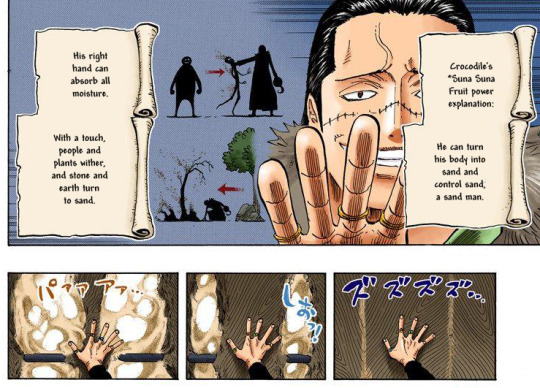
Now, of course this could be mere coincidence. But let’s be realistic here, it’s Oda. He clearly has a reason for it as he’s been true to this detail ever since Crocodile was introduced over a decade ago and the only real question is ‘why’?

Why would Crocodile do that? He clearly loves wearing rings so why not wear them on every finger? Why leave out the ring finger for crying out loud? If one wanted to leave a finger without a ring, one would probably leave out the pinky or the thumb but who puts rings on every finger and leaves out the ring finger? I tell you who.
Crocodile. That’s who.

If you’re one who believes in symbolism and all that stuff, then you’d probably find it interesting that the ring finger symbolises releationships with others especially romantical ones as it is seen closest to the heart and therefore or because of it is the finger a wedding ring is worn on. In most cultures the engagement ring is worn on the right hand and the wedding ring on the left as the right hand is often the ‘physical’ one and has a greater visibility. It’s probably interesting to note that the left hand is considered to represent your character and beliefs. Ha. Interesting that Crocodile is missing that one, huh? Anyhow, in Crocodile’s case left or right hand doesn’t really matter as he only has one left (duh) so an argument can be made that sides don’t matter and the importance lies on the finger itself.
The way it looks right now is that he’s making a statement leaving out the ring finger and there are a few possibilites here. Of course it could be a family ring and he could be from an important family but really, not only would that be a bit to similar to Doflamingo, it would also not make sense to not just replace the family ring on the occations he’s not wearing it. But he never wears a ring on that finger so one can only come to the conclusion that there’s some sentimental thought behind that.
The most logical would be that there is a ring he believes should be on that finger. Either he’s keeping it free for a future event coz he doesn’t have the ring yet (which I doubt) or he’s keeping it free coz technically there already is a ring for the finger. This could be a ring he doesn’t have anymore and regrets it (like he lost it with his left hand or threw it away) or a ring he does have but decides not to wear for his own reasons. Whichever it is, it clearly has such an important value that he doesn’t just covers it up or replaces it.
Now, given the ring finger and it’s symbolism the thought of a wedding ring isn’t too far fetched. We don’t know enough about his past to say that he could never have been married so I think it’s worth looking into.
Let’s just imagine for a second, that the ring missing is indeed a wedding ring, what could that mean?
He could have had a wife but she died and even though he’d technically not be married anymore, people who lost their partner almost always keep their wedding ring as a memento. If they move on, they don’t wear it anymore but they often keep it. This could give another perspective to the ‘wounds’ Daz was referring to after Marineford as he was clearly not talking about Luffy’s physical wounds but about the emotional wounds that came with losing a loved one.
Crocodile could have had a wife but she betrayed him and he took the ring off as to break the relationship and connection. Then the choice to not wear a ring on that finger in the future could serve as a reminder to himself not to trust people, not even those close to you. This could possibly explain his huge trust issues.
However, these two scenarios, while possible, don’t strike me as the most likely simply due to the two following scenes:
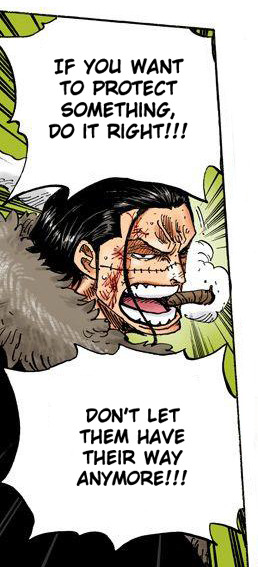
“If you want to protect something, do it right!!”
This could be totally random and only refer to the moment at hand but it could also indicate that he knows a thing or two about how to successfully protect someone. Which leads us to the infamous

“I know one of his weaknesses ...!! But if he cooperates with us ... then I won’t say anything about it!!”
Think about it, the biggest weakness ANY pirate of Crocodiles caliber could have is a loved one or people they care about and their identity and location to be known by the public or enemies (marines, pirates etc.) because no matter how powerful a pirate you are, if information like that was to spread and reach the wrong ears, this could have catastrophic consequences for you and the people you care about. It’s used over and over in OP stories like when the marines hunted down Gol D. Rogers offspring and slaughtered all newborn who could potentially have been Roger’s child or when the marines swore to kill Luffy for being Dragon’s son or when Zeff was used as leverage to force Sanji to comply. I doubt anyone knows Usopp is Yasopp’s son or that he had a woman and child in Syrup village otherwise someone would have probably attacked them to get back at Yasopp. Maybe that’s one of the reasons he left them. As to protect them.
Ivankov and Croc met years ago when Croc was still considered a rookie, so in his early/mid twenties. If there is indeed a ring to that finger and the person is still alive, Ivankov could know her identity or location and this could totally be the weakness Ivankov was refering to. Of course this only works if the person is still alive.
Now I know, you’re probably scratching your head, thinking I might be a bit nuts going this direction considering it’s Crocodile we’re talking about but really, think about it. His choice of jewelry is mega weird so what could be the reaaon for it? Also it’s hardly the weirdest theory out there (looking at you femCroc theorists).
This would also tie in neatly with why he decided to have his Baroque agents working in teams of two with male/female. I mean, unlike other characters, he clearly doesn't seem to see women as the weaker sex and him having his agents work in pairs has to be grounded somewhere. Maybe he was raised like that and his parents where a good example of how well men and women complement each other or maybe he made the experience himself. If so, I tend to think that he wasn't betrayed by the woman... or maybe he was and that's one of the reasons why he was so paranoid and basically expected Robin to betray him. All possible, really.
It’s also apparent that Oda incorporates marriages a lot more often nowadays than he did in the early years of One Piece. Mr 9 and Mrs Mondey got married on a cover page and have a baby, Capone got married and his henchman Gotty married too, Sai and Baby 5 married, Sanji and Pudding were meant to marry and let’s not forget poor Senior Pink’s backstory.
Last but not least, I’d like to point out a seemingly random fan question Oda answered in an SBS which seems just kinda odd once you consider everything I said above.
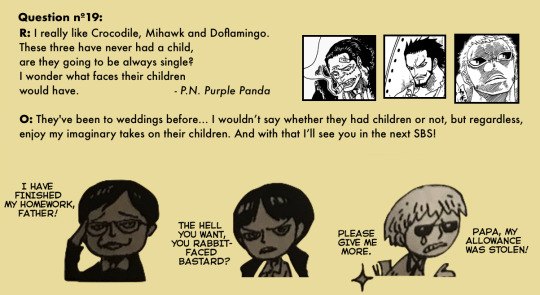
Now the question focuses on “they never had a child” and “I wonder what faces their children would have”, yet Oda starts with “They’ve been to weddings before ...” ... WOW. Really? Why would he say that? XD No one even asked about weddings. Funny. So they’ve been to weddings, huh? As what? Guests? Grooms? You know? It doesn’t seem to mean anything but if you consider Crocodile’s rings and such imo it’s just a weird thing to say. Then the mysterious “I wouldn’t say whether they had children or not ...” .....
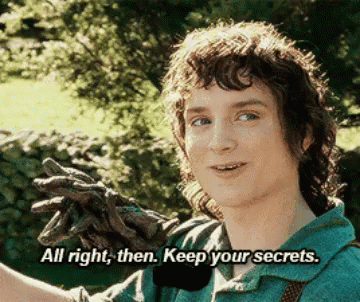
Note: Especially during Alabasta Oda often forgets to draw Croc’s rings at all or accidentally leaves out the wrong finger but he is consistent with the rings since Impel Down. He still forgets them from time to time but he doesn’t switch the fingers anymore so one could reason that he had a vague idea of Crocodile’s reasons behind the rings when he introduced him but only solidified it or gave it more details once Croc showed back up. The anime and games however often just leave out the wrong ring probably thinking that it doesn’t matter.
#one piece#sir crocodile#crocodile#eiichiro oda#one piece theory#crocodile theory#wani yarou#crocoboy
187 notes
·
View notes
Text
Sylvie x Loki Might Not Happen and Here’s Why
***SPOILERS FOR LOKI TV SHOW***
1. They are basically siblings
Even though they have different personalities, backstories, and physical appearances, that doesn't change the fact that they are the genetic equivalent of siblings. No matter what Timeline you're looking at, both Sylvie and Loki are the offspring of Laufey and whoever he had children with. We know this because they are Variants of the exact same person, meaning that if either of them were born to someone other than Laufey, they would have been pruned as a baby. And since they weren't, that means they must be just as genetically similar as siblings are.
Because of this, the idea of Sylvie and Loki engaging in any kind of romantic or sexual relationship is extremely disturbing to a lot of fans. It's too big an oversight to brush past, especially when the show has continued to remind us over and over that they are, in fact, both Lokis. Maybe if them being the same person wasn't such a major plot point, it would be easier to ignore the facts, but it is, and that means that Marvel is basically pushing either an incest or selfcest (depending on how you look at it) type relationship. And that’s extremely risque for a corporation as large as Marvel, especially with a character as beloved by fans as Loki.
2. It is terrible LGBTQ+ representation
And before anyone says anything, no, it is not because Sylvie is portrayed as female and Loki as male. I've seen a lot of Sylvie x Loki shippers say that the reason people don't like the couple is due to it being one between a male and female, but that's not true. Loki and Sylvie were both confirmed to be bisexual, meaning that they can engage in a relationship with anyone of any gender. It would be completely valid for either of them to pursue romance with someone of a different sex and still be bisexual. No one is arguing against that, and if they are, I definitely do not agree with them.
However, the problem comes in when you take into account Marvel and Disney's (who owns Marvel) long history of queerbaiting. There have been countless times that Disney advertises their "first gay character!" only for it to be a single line of dialogue or a brief shot. Marvel in particular has used the popularity of certain LGBTQ+ ships and headcanons in their fanbase to generate media popularity that they don't actually follow through with in their movies/shows. So when Loki was confirmed to be both genderfluid and bisexual in Episode Three, lots of people felt like they were finally getting a win for representation.
But those people, myself included, appear to have been let down again. The first two official queer characters had so much potential to go off and be with anyone they wanted, but instead, the show has set them up to be in a romance with each other. Now, this wouldn't be problematic on it's own, but when you take into consideration the questionable nature of their romance from Point One as well as the fact that the show has explicitly referred to it as "twisted," it raises the question of whether or not this is actually good representation. Because the fact is, in one episode the writers went “look, it’s two queer people!” and in the next, they said “their relationship is disgusting and demented.” Marvel’s first bisexual characters being borderline incestuous/selfcestuous does not sit well with me at all.
All of this is made even more confusing when you take into account the background of the Loki crew, most notably, the director Kate Herron. She also directed the Netflix series Sex Education, which has quite a bit of very well done representation of all kinds. So how is she managing to fail so badly on this project? It makes me wonder whether she truly is just losing her touch or if this is all a misdirection. Personally, I'm hoping for the latter.
3. It does not send the "self love" message people seem to think it does
The writers, director, and cast of Loki have said multiple times that the relationship between Sylvie and Loki is meant to act as a metaphor for self love. And in a way, that makes a lot of sense. Despite creating different identities for themselves over time, they are still ultimately the same person and therefore share a special bond because of it. And there's a lot of potential that can be done with that concept.
Loki is an extremely complex and intriguing character. He has experienced a lot of trauma in his past that has shaped him into the person he is today. And that person is clearly very broken. He has never given away or received any kind of love, with the exception of his mother and possibly his brother, Thor. Other than that, he's had no healthy friendships, romances, or perception of himself. It makes sense for him to be confused by this pull he feels towards Sylvie, who is both alarmingly alike and vastly different from himself.
Something this series does exceptionally well is breaking Loki out of his comfort zone. He is finally forced to see himself from other people's perspectives. It started with the file Mobius showed him in the first episode. Loki was able to view his actions apart from himself, and was hit with the realisation that he had been hurting people, and he didn't like that.
Loki is also confronted by the existence of the Time Keepers and the TVA, who describe him as an antagonist and nothing more. To them, his role is to make those around him look better, even if that means he repeatedly gets the short end of the stick. Mobius mentions that he disagrees with this and that Loki "can be whoever and whatever he wants, even someone good," adding another layer of depth as to who Loki could be in the future of the series.
Another huge moment for Loki's character development is while in the Time Loop Prison with Sif. Though he starts out annoyed with the situation and recalls not feeling apologetic when he cut off Sif's hair, the longer he is in the loop, the more he changes. Loki admits things to himself that we have never seen him say aloud, such as the fact that he is a narcissist that craves attention. Sif telling Loki over and over that he deserves to be alone makes Loki question whether or not he believes that to be true, allowing him an introspective moment where he really has to think about who he is.
Now with all of that being said, I'd like to tie in why this is important to the writing of Loki and Sylvie. They act as a mirror to one another, representing both the flaws and strengths of "what makes a Loki a Loki." For once, Loki gets an honest, unbiased look at himself without layers of expectations or self doubt. On Lamentis, he calls Sylvie "amazing" and praises her for all her accomplishments. That's a huge moment for him because it shows that despite also finding her irritating, he can look past those traits and see someone worth being a hero underneath. And through that realisation, he begins to understand that he can also grow to love himself. That kind of character development for Loki is incredible to watch, and it's the kind of character development I want to see from this series. Unfortunately, them possibly engaging in a romantic relationship will ruin it.
Whenever I'm feeling insecure about myself and my abilities, the solution has never been to look at who I am through a romantic lens. Self love is an entirely different type of love from romantic love, so if the series tries to push this relationship as a romance, it will fail to truly represent the arc that they are trying to show.
4. Nobody likes it
This one's a little on the nose, but it's true. Almost no one likes this ship, and more than that, most people actively hate it. Yes, there is a small minority that like Loki and Sylvie together, but there is an overwhelmingly larger group that is disgusted and angry by the fact that the show paired them up.
After Episode 4 aired, I ranted for about an hour and a half with a friend about how much we didn't want them together. My aunt whom I have never texted reached out to me to say that she hated their relationship. My homophobic neighbour came over and told me that she would prefer any other romance to this. Friends that I haven't talked to much since school let out for summer have all agreed that they collectively dislike Loki x Sylvie. This ship has brought people together purely because everyone hates it more than they hate each other.
There is no denying that the general feedback for Loki and Sylvie being a couple has been negative, even if you support them getting together for some reason. So if there are so many people out there who don't like it, I'm confused as to how it would be approved by a team of professionals.
5. The contradicting information we have gotten so far
Before the release of Episode Four, Kate Herron said that the relationship between Loki and Sylvie was “not necessarily romantic.” During the interview, she continued to refer to them as friends and people who found solace and trust in each other.
However, after Episode Four, the head writer, Michael Waldron, and other members of the crew spoke up about Sylvie and Loki. They said things like “it just felt right that that would be Loki’s first real love story” and “these are two beings of pure chaos that are the same person falling in love with one another.” These kinds of comments very heavily imply something romantic, directly contradicting what Kate Herron said. Even Tom Hiddleston, the actor for Loki, has assessed the situation, highlighting the differing viewpoints. He’s also said before that the end of Episode Four ultimately has Loki getting in his own way.
Now, this could all just be a misdirection on either side to build suspense for the show, but as of right now, it is entirely unclear who is telling the truth. Though it is more likely that the statements made by Michael Waldron are more accurate (as he is the writer), there is still a slight possibility that Loki x Sylvie won’t happen. I’ll link the articles I’ve found on this topic below so you can read them and decide for yourself.
Kate Herron Statement - https://www.cbr.com/loki-sylvie-relationship-not-romantic/
Michael Waldron Statement - https://www.marvel.com/articles/tv-shows/loki-sylvie-in-love
Tom Hiddleston Statement - https://thedirect.com/article/loki-tom-hiddleston-sylvie-romance
6. It is still salvageable
The odds are not in our favour, I’m afraid. It is highly probable that the show will put Loki and Sylvie in a romantic relationship with each other. Yet there is still a way to salvage it and turn their bond into something incredibly satisfying. Like I mentioned in Point Three, the relationship between Loki and Sylvie has the potential to be incredibly empowering and provide both characters some much-needed growth. And I believe that while unlikely, it can still do that.
The only mention of them being romantically interested in each other came from Mobius, who at the time was angry, betrayed, and doing anything he could to get Loki to talk. Then, at the end of the episode, right before Loki is about to confess something important to Sylvie, he is pruned. This results in no explicit confirmation from either Loki or Sylvie that they are in love with each other. The audience is left not knowing whether Mobius was correct in his speculations, and honestly, I don’t think Loki knows either.
Loki is no expert on love, as I explained earlier. It is entirely possible that he doesn’t grasp how he feels about Sylvie and defaults to romance because of what Mobius said. There is undoubtedly some sort of deep bond forming between them, and I would love to see that being explored in the next two episodes. I would love to watch Loki’s journey of realising that he doesn’t want anything romantic with Sylvie, and was simply confused by the new things he was feeling towards her. Loki even says “this is new for me” when talking to Sylvie at the end of Episode Four. Him momentarily believing that he wants to be a couple with her then shifting into them becoming friends who help each other grow is still a reality that could happen. And ultimately, I think that would benefit them both as characters as well as strengthen the overall message of the show.
In a show about self love, acceptance of yourself, and figuring out who you want to be, Loki very much needs people who support him. He has that in Mobius already, and now he’s beginning to have it in Sylvie as well. I just hope that it is done in a way that resonates with the audience and subverts expectations, which just cannot be done through some twisted romantic relationship. I’ve spoken to others watching the show and seen people talking online, and everyone seems to agree that Loki and Sylvie work much better as platonic soulmates or found family than a couple.
Of course, my hopes aren’t that high up. While I’d love for this to happen, I’ve been let down by Marvel before and wouldn’t be surprised if they went for the easy route of pairing characters up rather than dealing with the emotions correctly. Still, I have hope for this series. Everything else about it is wonderful and perfect in every way. It has the potential to become a masterpiece and easily the best thing that Marvel has ever done. However, this romance would ruin it for me and so many others. We already feel incredibly disappointed by Loki x Sylvie being suggested, so I can’t even begin to fathom how people will react if the show makes it canon. I’m begging Marvel to please do better than this. They have a wonderful story to tell and a wonderful team to do it, and I hope from the bottom of my heart that they don’t throw that away.
#marvel#loki#sylvie#mobius#loki x sylvie#loki x mobius#kate herron#michael waldron#disney#lgbtq#representation#tva#loki tv
27 notes
·
View notes
Text
More Magical Enclave Duoverse: Important Characters
In both timelines, Jimmy Reed is reincarnated on September 6th of 1977. In the original timeline, he is born to Rose and Jason Reed (Jason took his wife’s last name). In the enchantment timeline, he is born to Todd and Leticia Wood - and he is considered to be one of the clones.
In the original timeline, Jimmy Reed (as James Mathis Reed) has a twin sister named Jillian and a one-year younger sister named Jessica. While Jillian and Jessica were also born in the enchantment times, Jimmy was instead born as James Reed Wood. He has a sister (one year younger) named Lorina Aduke and a brother (four years younger) named Kingsley Hunter. In addition, Lorina and Kingsley are the offspring of Naveen and Tiana (of The Princess and the Frog).
In both timelines, the Bakers live across the street from Jimmy Reed’s family - just in two different locations. In both timelines, Zacky has a sister (four years older) named Zina and a brother (three years younger) named Matt. He has a brother (two years older) named Zavion Socrates in the Enchantment timeline, who is actually the clone of Socrates himself.
Merith and Elasha Kelthana are very close to Jimmy, his younger sister, and Zacky in both timelines. Neither Gena, Meaghan, nor Hannah exist in either timeline - so, in both timelines, Zacky and Elasha marry. In the original timeline, Merith ends up marrying Jessica Reed - while, in the enchantment timeline, Merith ends up marrying Lorina Wood.
~~~~~
Other important characters in the enchantment timeline include (with age at the moment of enchantment):
The Sewards:
William Henry Seward (10) (Billy the Kid)
Madeline Harriet Seward (8) (daughter of The Mad Hatter)
Alice Pleasance Seward (7) (Alice Pleasance Liddell)
Rosie Heather Seward (5) (Little Red Riding Hood)
Jonathan Lewis Seward (5) (Johnny Christ)
Notes: Madeline Harriet is often called “Maddie Hattie”. Maddie and Alice are less than ten month apart in age. Rosie and Johnny are fraternal twins.
The Schwartzes:
Abraham Lincoln Schwartz (12) (Abraham Lincoln)
Louis Beethoven Schwartz (9) (Ludwig Van Beethoven)
John Harold Schwartz (7) (Hansel)
Gretchen Maude Schwartz (5) (Gretel)
The Darbys:
Amanda Jeanne Darby (14) (Joan of Arc)
Stephen Francis Darby (10) (Sigmund Freud)
Ruby Celeste Darby (6) (daughter of Rose-Red)
Crystal Serene Darby (6) (daughter of Snow-White)
Notes: In Faerie, Ruby and Crystal are cousins born on the same date. On Earth, they are fraternal twins.
Felicity Apple White (14) (daughter of Snow White)
Raven Blanche McQueen (14) (daughter of [not-so-]Evil Queen)
Napoleon and Genghis Khan are present, too - but they live on the other side of Huntington Beach. Napoleon is best friends with M Shadows, while Napoleon and Genghis Khan are frienemies.
An upcoming post will detail how the two timelines connect.
#world building#jimmy reed#zacky vengeance#johnny christ#Avenged Sevenfold#magical enclave#cloning#faerie#wizard of oz#text post#xg
4 notes
·
View notes
Photo



Rhaenys Targaryen: She was Lady of Winterfell when she married Lord Rodwell Stark with whom she had three children: Brendon, Branda and Breton.
The princess was considered a woman not as splendid as hers by other relatives of hers, but it is known that she was cunning, pleasant, intelligent and did not forgive disrespect. It is known that she was always very at odds with Wylla Fenn, the lover of her father-in-law, Brandon Stark, and with her sister-in-law, Aregelle Stark.
It is said that one day Wylla Fenn compared the princess to a snake - "she has a mouth so big that the dicks of four men would go in there." Hearing this, Rhaenys spread the rumor that Wylla wanted to sleep with her brother-in-law, Beron and that she even had incestuous relationships without consent with her own son, Lonnel Snow.
In the end Wylla Fenn was called "The Whore Serpent" and was disowned in Winterfell.
In 184 a. C., Rodwell Stark passed away of smallpox and the son of this, Brendon was the following Lord of Invernalia and the wife of this, Marla Cerwyn, the daughter of Aregelle Stark. Despite the hatred she felt towards Aregelle, Rhaenys loved her daughter-in-law very much and helped her position herself in the northern court so that she would not be in danger if her husband took ambitious lovers.
Rhaenys Targaryen died in 195 at the age of 60 from exhaustion and was buried in the crypts of Winterfell where years later her daughter-in-law, Marla Cerwyn, would be buried.
Sons:
-Lord Brendon Stark was Lord of Winterfell and was known as the "Powerless" because it was said that he could not consummate the bed with his wife, in addition to not being interested in having lovers and it was even said that he was homosexual .
He passed away at the age of 41 and was succeeded by his brother, Breton Stark.
-Lady Branda Stark remained single, but she had an intense affair with her father's bastard brother, Lonnel Snow, with whom she is said to have married.
Their relationship was a scandal and especially when they both had twins, Brandon and Ronnel Snow.
Branda reportedly passed away at age 45 from tuberculosis.
-Lord Breton Stark was Lord of Winterfell upon the death of his brother, Brendon without issue. He married Alysanne Stark and they had seven children together ensuring the Stark offspring.
Aerion I Targaryen: He was king of the Seven Kingdoms for at least thirteen years and was known to be the father of the second queen of the Seven Kingdoms, Rhaenyra II Targaryen.
He was considered handsome and flirtatious, being very different from his older sister, Rhaenys who had more Stark features than Targaryen. He was highly sought after and it was thought of marrying him to Jeyne Arryn or Tyshara Lannister, but he himself would end up discarding them because of Lady Arryn's advanced age and Tyshara because of her love scandals.
Her cousin, Viserra Velaryon, wanted him to marry her so she could become queen, but Aerion was not interested in her cousin at all. In the end Aerion opted for his youngest cousin, Jaena Velaryon who had a sweeter and more sympathetic character, something that made Viserra very angry since she considered herself more beautiful than her younger sister.
Aerion and Jaena married being a happy marriage since Jaena was a flirtatious, sweet wife who made her in love husband laugh. The couple began to share the bed and had five children, but their two sons, Valerion and Aegon died in infancy, leaving only their daughters Rhaenyra, Sara and Vaella to survive.
The inheritance problem distanced the couple a bit, even the young prince had an affair with Lady Floris Baratheon who gave him an illegitimate son, Aerion Mares. This event was painful for Jaena who separated from her husband for a time and the now king, Jacaerys I Velaryon warned her son that the baby would never be her successor and that her daughter, Rhaenyra was the real princess.
The couple reconciled after a year apart and were together again.
During the reign of his father, his cousin, Aenar Targaryen who was the son of Aegon "the youngest" claimed the Iron throne for him, assuring that his uncle and his descendants were bastards who usurped the throne. of his late father.
Aerion played an important role as the book a battle at Harrenhal without dragons ensuring victory for his father. In the end Jacaerys I assured his nephew that he could be King if he married his granddaughter, Rhaenyra who was second in line of succession and Aenar accepted.
In 179 a. C., his parents died of smallpox and Aerion became Aerion I Targaryen being his daughter, Rhaenyra princess of Dragonstone.
Aerion's reign was peaceful despite the numerous tensions he had with his cousin Aenar, whom he distrusted greatly and threatened to be respectful to his daughter.
In 191 a. C., the king fell seriously ill with tuberculosis and was cared for by his wife and his daughters Sara and Vaella, but his condition did not improve and he just died that same year at 54 years of age.
Jaena would keep an eternal mourning for him and died eight years later at the age of 60 due to lack of food.
Aerion was succeeded by her daughter, Rhaenyra as Rhaenyra II and her husband was crowned Aenar I Targaryen, her reign being called "The Age of the Dragon" for the large number of dragons that were procreated.
Sons:
-Rhaenyra II Targaryen was Queen of the Seven Kingdoms after the death of her father and was considered a loyal, cultured and pacifist queen.
She married her uncle, Aenar, her being crowned as Aenar I and with whom she had ten children in common, in addition to being an intense marriage full of pleasure.
She passed away at 55 years of age from puerperal fever.
-Valerion Targaryen passed away before he was 5 years old.
-Sara Targaryen was Princess of Dragonstone by marrying her nephew, Aegon Targaryen and with whom she had four children. Her husband passed away before he was King and he was replaced by her son, Daeron Targaryen.
She passed away at the age of 62 from a heart attack.
-Aegon Targaryen passed away two days after being born.
-Vaella Targaryen remained single and became old, being she more the nurse of her family.
She passed away at 83 years of age from respiratory attacks.
Rhaenys Targaryen: Fue Señora de Invernalia al casarse con Lord Rodwell Stark con el cual tuvo tres hijos: Brendon, Branda y Breton.
La princesa fue considerada una mujer no tan esplendorosa como sus otros familiares, pero se sabe que ella era astuta, agradable, inteligente y no perdonaba faltas de respeto. Se sabe que siempre estuvo muy enemistada con Wylla Fenn, la amante de su suegro, Brandon Stark y con su cuñada, Aregelle Stark.
Se dice que un día Wylla Fenn comparo a la princesa con una serpiente- “tiene una boca tan grande que la verga de cuatro hombres entrarían ahí”. Al escuchar esto, Rhaenys hizo que se esparciera el rumor que Wylla quiso acostarse con su cuñado, Beron y que incluso mantenía relaciones incestuosas sin consentimiento con su propio hijo, Lonnel Snow.
Al final Wylla Fenn fue llamada “La puta serpiente” y siendo repudiada en Invernalia.
En 184 d. C., falleció Rodwell Stark de viruela y el hijo de este, Brendon fue el siguiente Señor de Invernalia y la esposa de este, Marla Cerwyn, la hija de Aregelle Stark. Pesé al odio que sentía hacia Aregelle, Rhaenys quiso mucho a su nuera y le ayudo a posicionarse en la corte norteña para que no se viese en peligro si su esposo tomaba amantes ambiciosas.
Rhaenys Targaryen falleció en 195 a los 60 años de edad por agotamiento y fue enterrada en las criptas de Invernalia donde años mas tarde sería enterrada su nuera, Marla Cerwyn.
Hijos:
-Lord Brendon Stark fue Señor de Invernalia y fue conocido como el “Impotente” debido a que se decía que no podía consumar el lecho con su esposa, además de no estar interesado en tener amantes e incluso se decía que era homosexual.
Falleció a los 41 años de edad y fue sucedido por su hermano, Breton Stark.
-Lady Branda Stark permaneció soltera, pero tuvo un intenso romance con el hermano bastardo de su padre, Lonnel Snow con el cual se dice que se llego a casar.
Su relación fue todo un escandalo y sobre todo cuando ambos tuvieron mellizos, Brandon y Ronnel Nieve.
Branda falleció supuestamente a los 45 años de tuberculosis.
-Lord Breton Stark fue Señor de Invernalia a la muerte de su hermano, Brendon sin descendencia. Se caso con Alysanne Stark y tuvieron siete hijos en común asegurando la descendencia Stark.
Aerion I Targaryen: Fue rey de los Siete Reinos por al menos trece años y fue conocido por ser padre de la segunda reina de los Siete Reinos, Rhaenyra II Targaryen.
Era considerado guapo y coqueto siendo muy diferente a su hermana mayor, Rhaenys la cual tenia mas rasgos Stark que Targaryen. Fue muy pretendido y se pensó en casarlo con Jeyne Arryn o Tyshara Lannister, pero el mismo acabaría descartandolas por la edad avanzada de Lady Arryn y a Tyshara por sus escándalos amorosos.
Su prima, Viserra Velaryon busco que el se casara con ella para así poder llegar a ser reina, pero Aerion no le interesaba para nada su prima. Al final Aerion se decanto por su prima mas joven, Jaena Velaryon la cual tenia un carácter mas dulce y simpático, algo que hizo enfadar mucho a Viserra ya que se consideraba mas hermosa que su hermana menor.
Aerion y Jaena se casaron siendo un matrimonio feliz ya que Jaena era una esposa coqueta, dulce y que hacia reír a su enamorado marido. La pareja empezó a compartir el lecho y llegaron a tener cinco hijos, pero sus dos hijos varones, Valerion y Aegon fallecieron en la infancia dejando solo a sus hijas Rhaenyra, Sara y Vaella sobrevivirían.
El problema sucesorio distancio un poco a la pareja incluso el joven príncipe tuvo un romance con Lady Floris Baratheon la cual le dio un hijo ilegitimo, Aerion Mares. Este suceso fue doloroso para Jaena que se aparto de su marido por un tiempo y el ahora rey, Jacaerys I Velaryon le advirtió a su hijo que el bebé jamás sería su sucesor y que su hija, Rhaenyra era la verdadera princesa.
La pareja se reconcilió después de un año distanciados y volvieron a estar unidos.
Durante el reinado de su padre, su primo, Aenar Targaryen que era el hijo de Aegon “el menor” reclamo el trono de Hierro para el, asegurando que su tío y sus descendientes eran unos bastardos que usurparon el trono de su fallecido padre.
Aerion tuvo un papel importante ya que el libro una batalla en Harrenhal sin dragones asegurando la victoria para su padre. Al final Jacaerys I le aseguro a su sobrino que podría ser Rey si se casaba con su nieta, Rhaenyra que era la segunda en la linea de sucesión y Aenar acepto.
En 179 d. C., fallecieron sus padres de viruela y Aerion se convirtió en Aerion I Targaryen siendo su hija, Rhaenyra princesa de Rocadragón.
El reinado de Aerion fue pacifico pese a las numerosas tensiones que tuvo con su primo Aenar del cual desconfiaba mucho y le amenazo con ser respetuoso con su hija.
En 191 d. C., el rey callo gravemente enfermo de tuberculosis y fue cuidado por su esposa e hijas Sara y Vaella, pero su estado no mejoro y acabo falleciendo ese mismo año a los 54 años de edad.
Jaena le guardaría un eterno luto y falleció ocho años después a los 60 años de edad por la falta de alimentos.
Aerion fue sucedido por su hija, Rhaenyra como Rhaenyra II y el esposo de esta fue coronado como Aenar I Targaryen siendo su reinado llamado “La edad del Dragón” por la gran cantidad de dragones que fueron procreados.
Hijos:
Rhaenyra II Targaryen fue Reina de los Siete Reinos tras la muerte de su padre y fue considerada una reina leal, culta y pacifista.
Se caso con su tío Aenar siendo el coronado como Aenar I y con el cual tuvo diez hijos en común, además de ser un matrimonio intenso lleno de placer.
Falleció a los 55 años de edad de fiebres puerperales.
Valerion Targaryen falleció antes de cumplir 5 años de edad.
Sara Targaryen fue Princesa de Rocadragón al casarse con su sobrino, Aegon Targaryen y con el cual tuvo cuatro hijos. Su marido falleció antes de ser Rey y fue reemplazado por su hijo, Daeron Targaryen.
Falleció a los 62 años de edad de un ataque al corazón.
Aegon Targaryen falleció dos días después de nacer.
Vaella Targaryen permaneció soltera y llego a anciana, siendo mas la enfermera de su familia.
Falleció a los 83 años de edad de ataques respiratorios.
21 notes
·
View notes
Note
3, 7, 10 if you’re still doing the star trek asks :)
3. Favorite chief engineer?
Geordi💕 he’s one of my favorite Star Trek characters overall because (aside from forced romantic subplots 🙄) he’s wholesome and sweet and able to make friends in unlikely places and I find that undeniably charming. Plus I’ve had a crush on Levar Burton since I watched Reading Rainbow as a kid. I also really imprinted on Data when I first watched TNG at like, 9 years old, and enjoyed Geordi’s friendship and patience vicariously through him. So he holds a special place in my heart no matter what!
7. Episode you could watch over and over?
I have three that really stick out to me.
Return to Tomorrow from TOS which has a really cool story structure reminiscent of ancient mythology. With gods and challenges and moral propositions and symbolism, with Bones as the protagonist! I love me some Bones-centric episodes and watching him go on an almost blow for blow classic hero’s journey was super cool. Plus I love Henoch, he’s probably one of my all time favorite Trek antagonists, he was just the right balance of evil and sassy and was of course, played by Leonard Nimoy and that’s always a win.
The Offspring it may be REALLY sad in the end but it’s so wholesome and wonderful otherwise. Seeing what an amazing dad Data is to Lal. Lal getting to choose her gender Hits Different now that I am aware of and honor my own transness. Plus Lal is super sweet and deserved better and all of her character interactions with the rest of the crew are great.
Innocence listen I feel like everyone knows that I am a diehard Tuvok stan, especially when Tuvok allows the fact that he is a father to shine through, and that episode gives him every opportunity. I want to kiss whoever came up with ‘hey Tuvok is a dad right? Let’s strand him on a planet with a bunch of mysterious children!’ Right on the mouth! We got so much of Tuvok being a big softie and I love seeing normally ‘emotionless’ characters do that! Also Tim Russ has a gorgeous singing voice and I wanna hear the other 400+ verses of Falor’s Journey damnit!
10. When did you become a Star Trek fan?
I feel like I’ve only hit like, full blown Trekkie status recently because I abandoned Star Trek as a whole for like a solid 6-7 years before plunging headlong back into it. But if we want to get technical ive been a fan since I was like 4 or 5 years old because I first got exposed to Star Trek through the Animated Series and IMMEDIATELY imprinted on Spock thanks to Yesteryear (baby spock baby spock baby spock!!!). I jumped ship for a few years because my step dad tried to show me Wrath of Khan when I was 7 and I got freaked out by the brain slugs. Then I watched a bunch of TNG as my Emotional Support TV Show while some drama was going down in my family. Then the AOS movies, then watched a bit of every other series throughout middle school. But then I stopped for a while when I started suppressing/ignoring a ton of shit about myself in highschool. But I’m back babey! Imma finish what I started!
#star trek#Star Trek asks#star trek tos#Star Trek tng#Star Trek voyager#star trek the animated series#Star Trek aos#wrath of khan#return to tomorrow#the offspring#innocence#spock#tuvok#data#Lal#geordi laforge
15 notes
·
View notes
Text
Vampire Diaries Universe: The 25 Best Characters, Ranked
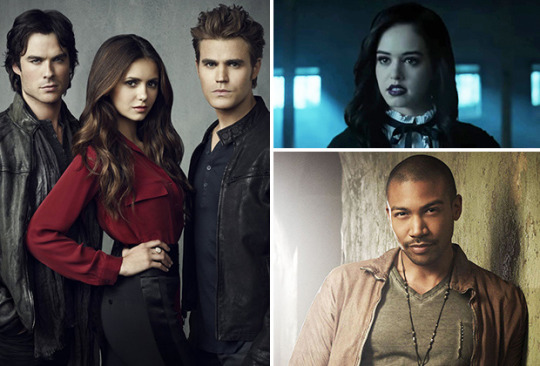
For the first time since 2009, we’re entering a fall season devoid of any new offerings from the Vampire Diaries universe. And like Stefan Salvatore without his daily diet of forest friends, we’re insatiable.
Like so many longtime TVD enthusiasts (those of us to whom the word “thesmatos” really means something!), we’ve spent much of quarantine revisiting the weird, wonderful universe — from Mystic Falls to New Orleans and back again. We’re suddenly spending a lot of time with characters we haven’t seen in years. And we’re having a lot of feelings about them.
In celebration of the franchise’s 11th anniversary, TVLine has assembled another totally non-controversial ranking, this time of the 25 best characters from the Vampire Diaries universe — a category that also includes familiar faces from The Originals and Legacies. (In Legacies‘ defense, the franchise’s latest offshoot hasn’t been around as long to endear itself to us, but that didn’t stop four Salvatore School students from making their way onto our list.)
In lieu of new content from the TVD universe this fall, TVLine is looking back at our 25 favorite characters from the entire franchise, including stand-out favorites from its two spinoffs.
SPOILER ALERT: This ranking discusses major plot points from all three shows. If you haven’t finished The Vampire Diaries (Season 1-8), The Originals (Season 1-5) or Legacies (Season 1-2), proceed at your own risk. Don’t say we didn’t warn you!
25. VINCENT GRIFFITH
Thanks to the magic of body swapping, the Mikaelson siblings have inhabited multiple physical vessels throughout the years, but none have remained in the family’s orbit quite like this Southern gentleman. Powerful, thoughtful and downright Shakespearean in his delivery (Yusuf Gatewood, ladies and gentlemen!), Vincent always has the greater good in mind. And as we learned in The Originals’ series finale, he helped Freya and Keelan pass that good along to the next generation.
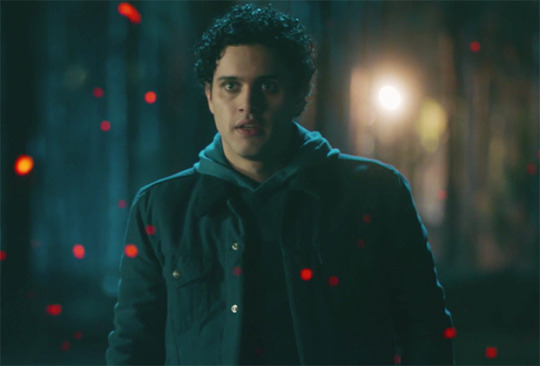
24. LANDON KIRBY
Even though we’re still getting to know him, there’s already so much to like about this pure-hearted Mystic Falls townie. Not only is he the franchise’s first-ever phoenix, but he also looks like he could pass for Damon and Elena’s offspring — and that’s never a bad thing. We could tell he had a long future in this universe the moment he danced with Hope in The Originals’ final season. (So far, so good!)
23. JENNA SOMMERS
Like so many paved paradises, we didn’t fully appreciate what we had with Jenna until she was gone. Her death marked the end of Elena’s innocence — which is saying a lot, considering she was still mourning her own parents when The Vampire Diaries began. And if we’re being honest, Jenna was the ghost we were most excited to see again in the series finale. (For the record, Joseph Morgan has apologized on Klaus’ behalf for killing Jenna several times.)
22. TYLER LOCKWOOD
The First Son of Mystic Falls was kind of a jerk when we met him in The Vampire Diaries‘ first season. He was arrogant, aggressive and reckless — so it actually made perfect sense when he was revealed to be a werewolf. Fortunately, Michael Trevino’s character developed a little more nuance from that point on, especially via his Romeo and Juliet romance with Caroline. (After everything that’s happened since 2013, can you believe that they were once in a love triangle with Klaus?)
21. JEREMY GILBERT
Elena’s little brother (er, cousin?) went through a number of different, wonderful phases during his tenure in Mystic Falls. We loved him in The Vampire Diaries’ earlier seasons as the human embodiment of all things emo (he literally dated a ghost!), and we… um… appreciated his unexpected evolution into a shirt-ripping, wood-chopping vampire hunter.
20. CAMILLE ‘CAMI’ O’CONNELL
The Clarice Starling to Klaus’ Hannibal Lecter, this brave bartender was able to tap into the show’s darkest, most complicated character’s psyche in ways that no one named Mikaelson (or even Forbes) ever could. She helped him conquer a number of his demons in the few short years they spent together on The Originals, and like most people who play a significant role in Klaus’ life, she suffered the consequences. (Side note: Are we the only ones who really dug Cami as a vampire? Justice for that short-lived story arc.)
19. SHERIFF ELIZABETH FORBES
Of The Vampire Diaries’ many maternal figures, none put us through the emotional ringer quite like Caroline’s mother. We weren’t her biggest fans in the show’s early seasons, given her penchant for hunting the undead (including her own daughter), but hey, what was this show if not an endless series of redemption arcs? Also, if you don’t get a little choked up when Caroline felt her mom’s presence in the series finale, you don’t have a soul.
18. FREYA MIKAELSON
The long-lost fifth Mikaelson sibling was a little rough around the edges when we first encountered her on The Originals, but the poor woman was in the midst of escaping a centuries-long imprisonment, so we cut her a little slack. And we’re glad we did, because Freya has since become one of the strongest, most inspiring and all-around likable characters in the Vampire Diaries canon. #FreelinForever
17. MARCEL GERARD
While it’s easy to get swept up in Marcel’s charm and swagger (we were robbed of a second karaoke number, by the way!), it’s important to remember just how far back his time with the Mikaelson family goes. When you consider that Klaus literally freed Marcel from slavery and raised him to lead New Orleans as his right-hand vampire, it adds a whole other layer of tension to their passionate power struggle on The Originals. Though he’s treated like an unofficial Mikaelson sibling, Marcel often feels like more of a Mikaelson than Kol — and definitely more than Finn.
16. REBEKAH MIKAELSON
Arguably the funniest (and most glamorous) member of the Mikaelson family, the woman Damon once referred to as “Barbie Klaus” never fai to tell it exactly like it was, beginning with her thoughts on then-lovebirds Stefan and Elena. (“Honestly, I don’t get you two as a couple.”) And Bex only became more complex as the years went on, from her desperate desire for humanity to her undeniable love for Marcel. Just don’t call her insane — she prefers “spontaneous.”
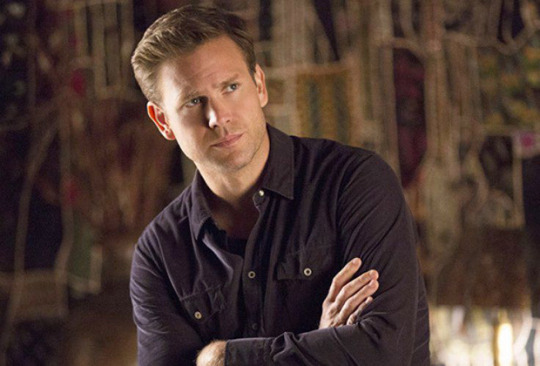
15. ALARIC SALTZMAN
In hindsight, Alaric’s journey from hot history teacher to hot headmaster of a supernatural school makes perfect sense. Still, it was impossible to predict back in The Vampire Diaries’ first season just how much of an impact the man formerly known as Warner Huntington III would have on this franchise. A drinking buddy to some, a father figure to others and a literal father to a lucky pair, Alaric has truly woven himself into the fabric of this universe like few others. (That said, we still wouldn’t recommend dating him if you value your life.)
14. SHERIFF MATT DONOVAN
Only one full-blooded human survived all eight seasons of The Vampire Diaries, and you’re looking at him. The pinnacle of mortal goodness, this blue-eyed patriot hasn’t always been on the same page as his vampire brethren, but that’s only because he didn’t want to see any more his friends and family get eaten. And we can sympathize with that!
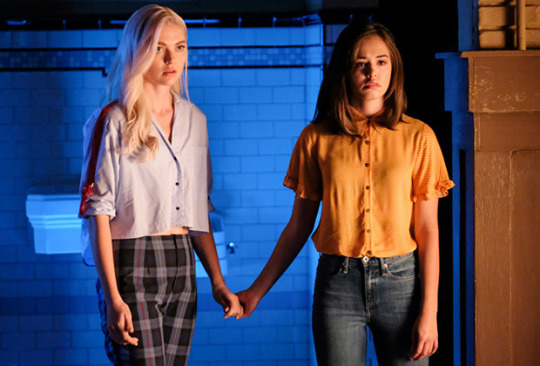
12-13. LIZZIE AND JOSIE SALTZMAN
Asking us to choose between Jo (by way of Caroline) and Alaric’s daughters is an impossible task, which is ironic, considering the Gemini twins are literally destined for a fight to the death on their 22nd birthday. Besides, these sisters have always felt like a package deal, from the moment we witnessed their birth on The Vampire Diaries to the day we reunited with them as teenagers on Legacies. (They also popped up in The Originals’ penultimate episode, putting them in the prestigious category of characters who have appeared in all three series.) Despite their inherent connection, Lizzie and Josie really have grown into two very different people, a journey we hope will continue for years (and shows) to come.
11. MALACHAI ‘KAI’ PARKER
The fact that this remorseless, pork rind-loving psychopath ranks so high on our list speaks volumes about actor Chris Wood, who brought a refreshingly sassy vibe to The Vampire Diaries’ sixth season. The guy was so likable, fans were even ‘shipping him with Bonnie… as if that poor girl hadn’t been through enough already! You also have to give Kai points for longevity — even after his head got knocked off, he managed to make two encore appearances on TVD (Season 8) and Legacies (Season 2).
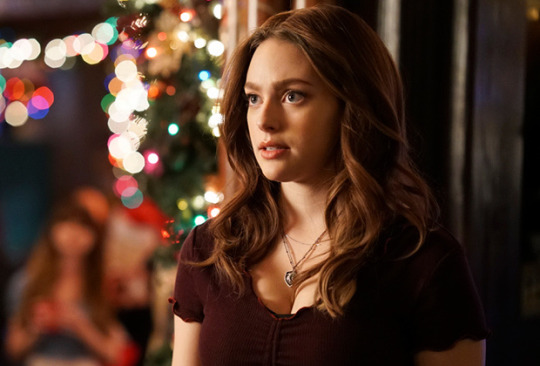
10. HOPE MIKAELSON
As we mentioned with Lizzie and Josie earlier, we feel like we’ve watched Hope grow up before our eyes… because we have. Given the epic circumstances surrounding her conception, birth and upbringing, an adult version of this character had a lot of hype to live up to, and Danielle Rose Russell has proven herself more than up to the challenge. Imbued with her parents’ best qualities, Hope’s power and passion make her both a formidable foe and an invaluable ally. Besides, Legacies showed us what the world would be like without Hope, and it was not a good place.
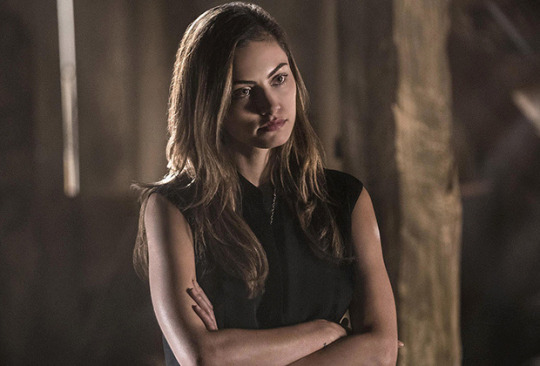
9. HAYLEY MARSHALL
We can’t even think about this fierce, fearless mama wolf without shedding a single tear. Hayley’s story was basically one long tragedy, from her complicated marriage with Jackson to her tumultuous relationship with Elijah. And then there was her untimely demise in The Originals’ final season, which… actually, let’s not talk about that. From the moment she gave birth, Hayley’s heart belonged to Hope, and it was in her most extreme maternal moments that Hayley’s true strength was on display. That’s how we’ll remember her.
8. ELIJAH MIKAELSON
Suits? Pressed. Hair? Immaculate. Vocabulary? Thicc. With his smooth moves and cunning intellect, Klaus’ extremely respectful brother could do it all — well, except keep the people he loved from meeting horrific ends. (Seriously, this guy’s track record for dead lovers is right up there with Alaric’s.)
7. BONNIE BENNETT
Simply put, this is the witch you want in your corner when things go south. Endlessly powerful and selfless to a fault, Kat Graham’s character spent eight agonizing seasons sacrificing herself — often literally, hence her multiple deaths — in order to keep her friends and family safe. No amount of bloody noses or dead boyfriends could stop this badass from crushing her enemies.
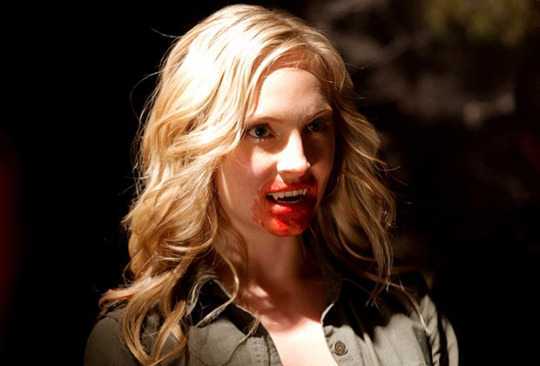
6. CAROLINE FORBES
Getting smothered to death was honestly the best thing that could have happened to Caroline, who evolved from a basic, boy-crazy cheerleader into a bad-ass vampire overnight. And that was just the first phase of her franchise-long evolution into the empowered, globe-trotting mother of two she is today. She’s also responsible for all of The Vampire Diaries’ memorable musical moments, from her sweet song for Matt to her devastating performance at Sheriff Forbes’ funeral. (Now if only she’d pay her old pals at Legacies a visit…)
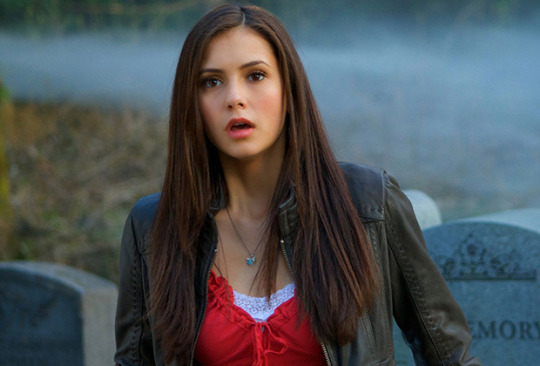
5. ELENA SALVATORE
She may not have Katherine’s chaotic flare, but Elena deserves credit for carrying much of The Vampire Diaries’ dramatic and romantic weight for six years. And for that pink hair she experimented with in Season 4. On top of that, Elena also rolled with the punches better than almost anyone. (You’re vampires? I’m a doppelgänger? Now I’m a vampire? Now I’m human again? Now I’m in a coma? Sure, let’s do this.)
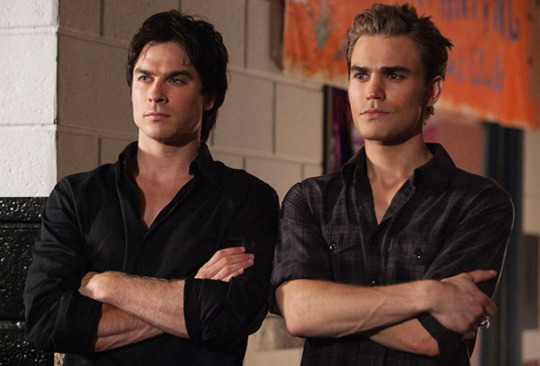
3-4. DAMON AND STEFAN SALVATORE
Two sides of the same brooding coin, these brothers were as proficient at breaking hearts as they were at breaking necks. And while their love triangle with Elena will remain the stuff of TV legend, their relationship as brothers was revealed to be the real heart of The Vampire Diaries in its final two seasons. Honestly, it’s too hard to choose between them, so we’re not going to.
2. KATHERINE PIERCE
Come on, when were you not excited to see this leather-clad lunatic on your screen? Deliciously twisted and infinitely more interesting than her human doppelgänger, Katherine was behind many of The Vampire Diaries’ most jaw-dropping twists, from her iconic encounter with John(’s bloody fingers) to her long-awaited return in the series finale. Honestly, putting Katherine on hell’s throne in Season 8 was merely a formality — she was always a queen.
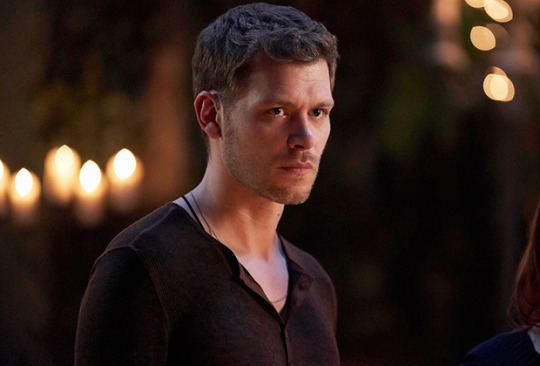
1. KLAUS MIKAELSON
The man, the myth, the legend. To think that the monster who slaughtered poor, defenseless Aunt Jenna on The Vampire Diaries is the same person who gave it all up to save his daughter on The Originals… well, there isn’t a clap slow enough to commend that kind of growth. (Again, Joseph Morgan is very sorry about the whole Jenna thing!) By the time Klaus evaporated on the streets of New Orleans, it felt like we had explored every conceivable nook and cranny of his existence, from his traumatic childhood to his fatal romances — and we relished every second of it.
#Legacies#TheOriginals#TheVampireDiaries#KlausMikaelson#HopeMikaelson#HayleyMarshall#LizzieAndJosieSaltzman#FreyaMikaelson#CarolineForbes#ElenaSalvatore#DamonAndStefanSalvatore#LandonKirby#AlaricSaltzman#ElijahMikaelson#RebekahMikaelson#CamilleO’Connell#VincentGriffith#BonnieBennett#MarcelGerard#KaiParker#JeremyGilbert#TylerLockwood#MattDonovan#LizForbes#JennaSommers#KatherinePierce#MysticFalls#NewOrleans#JuliePlec#TheCW
62 notes
·
View notes
Note
do you have any more nalu fic recs?
Sorry, not sorry - you’ve unleashed more than you could’ve guessed. ^^ Always happy to Recommend a List of Fics ~ And thank you for asking! Admittedly there’s a few Recs that aren’t Nalu - I got excited to share my favs. ;)
A Girl Worth Fighting For: Natsu navigates unspeakable horrors to win Lucy’s love or Natsu goes shopping, looking for the perfect white day gift.
A Lesson: Natsu and Lucy can’t keep themselves from expressing their passions - and the results are bed breaking. Short but smutty - smexy in fact. ;P
A Solidly Constructed Kiss: Erza strong-arms Lucy and Natsu into working the Kissing Booth to raise funds for a school trip. Lucy’s never been kissed and Natsu acts like he’s never entertained even the idea of kissing another person. Things naturally come to a head when Lucy and Natsu are given the task to build the actual booth; will they fight over construction or build themselves some kind of relationship?
Fairy Tail Week: A collection of drabbles from tumblr prompts to celebrate Fairy Tail. Fairy, Ladies, Lads, Magic, Guild, Ultimate Team, Stronger, Mashima, Tail. Only rated teen to err on the side of caution, family friendly content featuring most of the Fairy Tail Guild!
Feathers and Scales: Angel/Demon AU. Devils are more than they seem and Angels no less. Pitted against each other in a never-ending battle for souls, a single Angel and Devil trade mercies and fall in love. Warning: major character death(s).
Full Moon Secret: Natsu had wanted to tell Lucy his secrets, to share his family history with the fey…it had just never been the right time. Tonight the truth was going to be revealed, one way or another.
Okay, I could just keep hyping all of my own fics individually - but I won’t - other than to just put in a link to ALL OF THEM. ;) Fair warning, I have a few other fandoms works in all the Fairy Tail stories - from Brooklyn 99 to The Flash, Snow White with the Red Hair, RWBY, Blue Exorcist, Teen Titans and some Hakuouki. Yes, I’m a shameless self-promoter. Speaking of that - one more I need to rec! Natsu’s Stars in Lucy’s Sky. I swear Imma finish this.
I also have more than a few favourite authors who write for Fairy Tail (and other fandoms) ~ some have not contributed lately to Fairy Tail or chosen to concentrate on other fandoms - but I like them and their excellent writing.
ObsessedwithNalu: One of my first fandom friends and pretty much any of her FT stories is gold. @obsessedwithnalu
Christmas Treats: Admittedly a gift to me and very cherished for that fact - and - it’s frigging awesome. Lucy does a little holiday baking at home before Fairy Tail’s Christmas party. Natsu, as always, is there. One thing leads to another…
Thanks, Krov: When Krov decided to relax at his favorite bar after work, he never imagined that he’d be seeing some of his old guild members, especially since he thought they had died long ago. Nalu fluff.
Edo-Nalu love fest: Submissions for the Nalu love fest week of 2014. But instead of regular Nalu, these ones feature Edo-Nalu. Smut-tastic and delightfully mature.
ImpracticalDemon: Another early fandom friend who’s still writing this, that and the other thing - and she’s just GREAT. Again, a link to all her works and a few that are special to me follow. XOXOX @impracticaldemon
May the Best Man Survive: “Gray would never have in a million years thought he’d host Natsu’s bachelor party (Nalu pairing). Why is it his job to herd the bunch of rowdy mages from bar to bar, ending up at the guild where the real surprise party is? Oh yeah, the idiot had asked him to be the best man at his wedding. Hijinks, chaos and hilarity ensue.” ^^ A prompt supplied by me and I’m smirking so wide because the fic Imp came up with delivered more awesomeness than I could have hoped for!
A Star At His Side: “Accidentally Fall Asleep Together” for Endragoneel on tumblr. Natsu and Lucy spend the day together at a festival in Magnolia. Natsu ends up watching more than just the stars when the festival is over…
Christmas Gifts: When Erza walks Wendy home from the Guild’s Christmas Party, Wendy realizes how alone her friend and mentor is feeling. She sets out to recruit Lucy, Natsu and the rest to break Jellal out of prison for just one night, as a Christmas gift for Erza. Meanwhile, Natsu has accidentally burned some of Lucy’s writing. Will she forgive him?
Dark Shining Light: One of the best and most welcoming writers I have ever interacted with! I’m still gobsmacked she’s a friend! She’s a legend and I don’t know what else I could add to any discourse about her writing - but the classics are classic for a reason, yeah? Here’s a few of my personal favourites of her works and just know there’s too many to list them all! AKA @ff-darkshininglight
Mischievous Cat: Let’s just say there have been a few incidents where Happy has come in at a bad time.
What Belongs to a Demon: Everyone knew she belonged to the great demon lord and she would prove that she deserved to stand by his side.
The Truth Revealing Cards: Lucy should have known if there was a card that would reveal her secrets, Natsu would want it.
Eliz1369: Got introduced to her for her Hakuoki fics but she’d dipped her toes into FT as well ~ and this is a great fic. ^^ @eliz1369
The Light of Fairy Tail: The members of Fairy Tail may be their own brand of crazy, but their hearts are always in the right place.
rougescribe: Shame on me for not reading more of this author’s works! @rougescribe
Fire Sprite No 5: For him, Heaven wasn’t a place or a single moment in time. It was a feeling built on memories upon memories, past and present and a hope for future ones all tied down together. All sharing one common denominator: Her. Nalu. Tumblr Valentine’s Event.
Fallen Ark Angel: Admittedly I only have interacted from afar with this writer. I mainly read Nalu fics but I love her take on Mira and Laxus and her next gen offspring characters. She’s got a lot to offer and it’s all superb. @fallen029
Loving Satan: Loving Satan is never easy. But when she loves you back, its twice as bad.
Madartiste: Another one-sided love affair with someone else’s writing. And her stories are all wonderful and prolly appear on hundreds of Fic Rec Lists - but here’s one of my Favs! @madartiste
Hoarding: Getting interrupted gets old fast.
UranoMetria: I added her to my stable of fav authors 05-03-2014. Wow. Eons ago and even if I’m not sure she’s still active in the fandom, I salute her. Kudos.
The Goddess Gate: With six years of partnership, Natsu and Lucy are torn apart by a mysterious visit from a secret magic council. Lucy is kidnapped and her memories suppressed. She fights her way back home to regain her life - with a startling secret revealed as she begins to remember. The lives of all Earthland hang in the balance. **Okay, this is a wicked old fic - but amazingly written and fuelled my own desires for writing. Last updated in 2018 but who knows? Some current attention may slay any demons on her back in regards to writing - and even if not - the hours of enjoyment reading this is worth giving a comment just to say, ‘thank you for writing.‘
Wild Rhov: Do I even need to say anything about this author? Famous, famous, famous. Excellent. Writes a lot of pairings and fleshes every relationship into something REAL. I Can’t Even. @wildrhov
Beastly Possession: Something is murdering people in Magnolia. When Lucy is attacked, Natsu goes on a rampage to find the culprit, and everyone in Fairy Tail wants revenge. But could this bloodthirsty attacker be someone they know? Warning: High octane nightmare fuel! Do not read while eating, and beware of red eyes in the dark!
Shell1331: Introduced via Imp. This writer is in a few fandoms and is worth reading. @shell-senji
Juicy: Impulsivity and poorly chosen words get Natsu into more trouble than he’d expected, which is saying something for him.
AbsentAngel: Everyone should know this writer. Been stalking her since 2014 so that says something. Tho, it’s prolly just that I’m creepy. ;) My suggested fic here is being re-written/has been? into something original and worth being purchased when it becomes available and re-read over and over. No, I am not being paid to shill but I am open to having senpai notice me. @absent-angel
To the Flame: She stares, transfixed, as the blood runs down his fingers and begins to pool in his palm. He holds his hand up to her lips in offering, and she tears her eyes away from the blood to study his face. He is smiling softly. “Go on Luce, I didn’t cut them for nothing.” [Vamp AU]
HawkofNavarre: Loved for awesome and delightful Gruvia content. Looks like there’s a tumblr but I can’t manage to link it. :(
You Stole the Rain: He just wanted to be friends; fine, she just needed to change his mind. Gray x Juvia
Ricardian Scholar Clark-Weasley: Not sure I spelled that right even after checking three times! I usually short hand that to RS-CW in my head. And she’s prolific - has a tonne of fandoms and is a tower of talent. Is anyone reading all my fangirl gushing? 'Cause she follows one of my fics and comments (sorry I haven’t updated that fic in a while) and it’s a source of happiness that someone who writes so well happens to enjoy some of my content. Okay, bragging over - back to the Recs!
Tales of Fairies: A collection of oneshots exploring different friendships, ideas, sad themes, comical scenarios, and lots and lots of pairings…but mainly Nalu.
snogfairy: Another giant in the FT fandom. Impressive talent. @lineffability
naughty nalus: smutty nalu oneshots B) ***Mature content!***
Rivendell101: Another giant in FT and other fandoms. This author would be considered required reading if I ran a fandom course in a University setting. Just sayin’ @rivendell101
Crave: /krāv/ Verb. To feel a powerful desire for (something). They crave each other. And satiation doesn’t come easily. He growls against her again. “Beg for it,” he demands, lips ghosting against her.
Lakerae aka @hidetheremote : Did you think I’d forgotten you? Ha! Gotcha good! You’re an inspiration to me because you’re working so hard to publish your children’s books. Kudos to you li'l sis! You’re busy but still make it a point to talk to me and I love you for that and everything.
The Gift of the Magi: A Gajevy Twist: A retelling of the classic Christmas story “The Gift of the Magi,” with your favorite Fairy Tail couple Gajeel and Levy! It’s Christmas time and Gajeel and Levy exchange gifts. They both are surprised what they receive and learn a lesson of the true meaning of Christmas.
I could add more and more as I search my saved favs on FF.net ~ and I’m sorry to not include all of them - but this is crazy long as it is. If you read and like any of the recommended fics, please be sure to let the author know. To the authors of these and all fanfics, Thanks for everything.
#fic list#rec fic list#fan fics galore#mainly Nalu rec'd fics#sorry not sorry#asks#answered#more than poor anon bargained for
155 notes
·
View notes
Text
Fic: this body yet survives, ch. 5
Relationship: Lán Zhàn | Lán Wàngjī/Wèi Yīng | Wèi Wúxiàn
Characters: Lán Zhàn | Lán Wàngjī, Lán Huàn | Lán Xīchén, Lán Qǐrén, Wèi Yīng | Wèi Wúxiàn, Jiāng Chéng | Jiāng Wǎnyín, Jiāng Yànlí
Additional Tags: No War AU, Recovery, Trauma, Dissociation, Courtship, Courting Rituals
Summary: Wangji approaches the Jiang siblings with betrothal gifts, hoping for their approval. More of Wei Wuxian's self-esteem issues rear their ugly heads.
Notes: See end
Parts 1 & 2
Chapter 1 | 2 | 3 | 4
AO3 link
-----------
Wei Ying offered to help carry the baskets, or even the two cages containing a fat white-feathered wuguji rooster apiece, but Wangji refused to let him—it seemed improper to have him carry any part of the betrothal gifts.
Fortunately, xiongzhang and the outer disciple were both able to help. Wangji could not recall the young man’s name, only that he was an average cultivator with merely adequate guqin skills. Wangji himself carried the cages.
On the way to the guest house Jiang Wanyin and Jiang Yanli were staying in, Wei Ying stayed close, one hand grasping the edge of Wangji’s sleeve, the other holding the box with his forehead ribbon with a sort of reverence. He kept looking at it, his expression tinged with wonder and disbelief.
Wangji knew it would take time for Wei Ying to process the events of today; he wondered if perhaps everything was moving too quickly—telling Wei Ying he wished to court him, the clarification of his acceptance to GusuLan as a disciple, and now formally delivering betrothal gifts to his siblings. Wei Ying was still recovering, after all, but it was too late to change course now.
If he stopped now, Wei Ying might interpret it as changing his mind, and that would be so much worse. Wangji did not want to give him any cause to doubt, not after all he had been through. If he could shield Wei Ying from everything that might hurt him, he would—but he also knew that way of thinking could turn him into his father.
He would not cage Wei Ying, even to protect him.
Jiang Yanli was writing outside in the early afternoon sunshine when they arrived, and Wangji could see her immediate understanding and joy at seeing the decorated baskets before she schooled her expression and called for Jiang Wanyin.
He froze coming from the guest house, a stunned look on his face.
Wei Ying noticed and stopped short, his expression shifting to uncertainty. He didn’t know how his brother would react, Wangji realized. Wangji hovered next to him, not sure how to help.
Fortunately, Jiang Yanli seemed to know what to do. She came to Wei Ying and tucked her arm into his, pulling him forward, then called Jiang Wanyin’s name with a hint of exasperation in her voice.
Quickly, the three siblings were seated at the table, Wei Ying in the middle. He still looked uncertain, almost overwhelmed, and Wangji longed to go to him and draw him into his arms.
He was relieved when Xichen stepped forward, that xiongzhang would handle this part. Technically neither himself nor Wei Ying should be present for this, but on a similar note the Jiang siblings were the family of Wei Ying’s heart, not blood, so nothing about this was strictly traditional. They were both orphans, and thus no parents were involved in this betrothal process.
Xichen directed the disciple to place the baskets he was carrying and set his own down as well. At his pointed look, Wangji placed the cages with the roosters on the table as well.
“Wei Wuxian received his ribbon today,” Xichen began calmly. “As only family and cultivation partners may touch it, Wangji thought perhaps he could show Maiden Jiang how he ties his into his hair.”
Jiang Yanli looked delighted, and Wei Ying opened the box to show her the ribbon.
“Oh, it has little embroidered clouds,” she exclaimed.
“An inner disciple’s ribbon,” the outer disciple said, sounding surprised.
“Wei-gongzi has contributed much to Gusu Lan already,” Xichen clarified. “Shufu and I made the decision.”
Jiang Yanli eyed his hair, clearly thinking ahead to the lesson, and she smiled.
“Oh, is that a new guan?”
To Wangji’s delight, Wei Ying blushed.
“Mine broke this morning. This one belonged to Lan Zhan’s mother.”
“A love token?” Jiang Yanli asked, her smile widening. “It is lovely.”
“You have a whole bag of guan,” Jiang Wanyin muttered.
Wei Ying froze, his eyes going distant. The Jiang siblings looked startled by his reaction.
“The guan in his bag all had lotus on them,” Wangji stated.
He offered nothing more, but they realized anyway if the grief on their faces told him anything. As Wei Ying has predicted, they were sad, but there was a determination there as well.
“I’ll go through your bags for you,” Jiang Wanyin told him softly. “Get rid of anything with lotuses.”
“I’m sorry we didn’t realize, A-Xian.”
Wei Ying attempted a smile, but it was weak.
Both of his siblings looked as though they felt guilty for not having realized, but Wangji had only noticed this morning, had connected his fugue with the fallen lotus guan scattered across the floor.
“I didn’t tell you,” Wei Ying murmured. “How would you know?”
“Tell us what’s bothering you, you idiot. We can’t help otherwise.”
The smile turned more true, and sheepish.
“I’ll try.”
Xichen cleared his throat delicately and gestured to the baskets on the table, and he and Wangji bowed and took their seats across the table as the outer disciple started to unwrap the cloth covering them.
“Regarding the love token…”
Inside the baskets was white tea from Gusu Lan’s stores, aged decades to develop its delicate flavor. Sweet osmanthus cakes stamped with dragon designs—no phoenix, as both he and Wei Ying were men. A pair of dragon candles. One of the baskets contained cuts of pork, obviously purchased in Caiyi; this gift implied Jiang Yanli was a maternal figure. Another basket contained an assortment of seafood to symbolize a long and happy marriage. Oranges and apples, dates, dried tangerine and melon slices, lotus seeds, candies symbolizing prosperity, good fortune, luck, peace, and offspring—perhaps the hope he and Wei Ying would adopt? Sprigs of pine for longevity. Carved jade in different hues—green dragons and turtles, red and purple birds, white clouds, a black bat, orange fish, blue butterflies, flowers in all colors, and other auspicious symbols—all to show Wei Ying’s worth.
Gold had a value; jade was invaluable.
“We have brought a betrothal gift for you, Wei-gongzi’s siblings, to seek your approval for him to be wed to Wangji.”
“I asked him if he would consent to be courted, and he agreed,” Wangji offered.
Instead of responding, Jiang Wanyin looked at Wei Ying with what seemed like anger at first glance but was actually disappointment and grief.
“You’re not coming back to Lotus Cove,” he said.
It wasn’t a question, and he clearly already knew the answer. Jiang Wanyin’s voice was resigned and rough, as though he had held out hope all this time while knowing it was unlikely.
Wei Ying flinched, his face pinched with his own emotions. His throat worked soundlessly for a moment.
“I can’t,” he finally said, his voice shaky. “I’m sorry, Jiang Cheng.”
“Don’t apologize,” Jiang Wanyin told him. “It’s not your fault. After what happened…”
“I promised I’d be your right hand man,” Wei Ying murmured.
His hand was fisted in his sleeve, Wangji noticed, his knuckles as white as the robe, as he fought his emotions.
“But I can’t go back. Not now. Maybe not ever. I’m sorry.”
Jiang Wanyin took him by the shoulders and shook him slightly.
“It isn’t your fault!” he hissed as Wei Ying stared at him wide-eyed. “You have nothing to be sorry for, A-Xian!”
Instead of releasing him, he pulled his brother into an almost violent hug. Then they were both crying, as was Jiang Yanli, who put a hand on Wei Ying’s back.
“It’s enough that you’re here,” she said. “That you’re alive.”
Wangji knew from her expression she was seeing Wei Ying wan and bloody in the mud.
“You will always be his siblings,” he said impulsively, trying to stave off those same memories. “That cannot be taken from you.”
“Yes,” Jiang Yanli whispered. “A-Xian is the brother of our hearts.”
Jiang Wanyin released Wei Ying and fixed Wangji with a calculating look, measuring him as though trying to decide if he was worthy of his brother. Wangji did not begrudge him that—he should do so.
“You’ll protect him?”
Wangji nodded.
“He lies. He’ll pretend he doesn’t need help or protecting when he really does. You’ll protect him from himself?”
Wangji nodded again, reflecting on the way Wei Ying has, how he often put himself last in sneaky ways. He would need to compensate with that in mind.
Jiang Wanyin nodded back, looking very much like he was struggling to find words.
“He’s afraid of dogs. Terrified of them. Even the tiniest puppies. You have to protect him from them. And he forgets to eat. Even before, he forgot when he was working. He gets too focused and forgets to eat and sometimes even sleep.”
Wangji realized abruptly that these instructions were Jiang Wanyin’s way of expressing his approval. It would be his responsibility to care for Wei Ying.
Jiang Yanli expressed the importance of spice, of nutritious and delicious foods, of hugs and affection.
“Xianxian is three,” she said softly, tweaking Wei Ying’s nose between two knuckles and then dabbing at his tears with her sleeve. “He doesn’t say when he’s hurting. He keeps it inside, like with the lotuses. He fears becoming a burden.”
Wei Ying sat still between his siblings, his face flushed, clearly overwhelmed by their discussion of him and his needs.
“Wei Ying is never a burden,” Wangji said. “Wei Ying is a joy.”
His face flushed deeper, and he hid behind his sleeves.
“You can’t just say things like that, Lan Zhan.”
“Mm, can.”
“Lan Zhan!”
“Xianxian deserves to be spoiled,” Jiang Yanli said with a smile, nudging him playfully.
Wei Ying peeked out to shoot her a tremulous smile, but otherwise kept his face hidden. Jiang Wanyin shoved him lightly.
“I won’t be able to get away with staying here forever,” he said regretfully. “I’m the heir. Eventually I’ll be expected home.”
He fixed Wangji with a scowl.
“But if I can be sure Wei Wuxian is protected before I have to leave, I’ll feel better.”
“He is a Gusu Lan disciple,” Xichen pointed out softly. “He will be protected even without the courtship and marriage.”
“Unlike in Yunmeng,” Jiang Wanyin muttered bitterly.
Though Wangji knew xiongzhang hadn’t meant it in that way from the way he winced, he didn’t disagree with the Jiang heir’s interpretation. As a disciple—as head disciple—Wei Ying should have been protected, even from the fury of Madam Yu. She should have faced consequences for attacking a disciple alone, not protected by Meishan Yu with Wei Ying dismissed as a mere servant, as though he was property to be done with as she pleased.
These things still angered Wangji a year later, and probably always will.
“A-Cheng,” Wei Ying said. “It wasn’t—”
“You should’ve been protected,” Jiang Wanyin interrupted. “A-die should’ve protected you. We failed you.”
“You didn’t,” he whispered. “It wasn’t your fault.”
Jiang Yanli reached out and took Wei Ying’s hand.
“A-Xian, we want to be sure it never happens again. A-Cheng and I couldn’t protect you well enough, and Father should have protected you from a-niang, and he failed to.”
“Shijie…”
Wei Ying ducked his head, and Wangji knew he was trying to avoid thinking poorly of the man who he’d been raised to consider an uncle. But there were other issues as well—in truth, Jiang Yanli was no longer his martial sister, but he had called her that since he was young and perhaps hadn’t fully realized. Or, more realistically, he didn’t know what to call her otherwise.
“He could have officially adopted you, A-Xian,” she said gently. “He could have made you our brother officially. She wouldn’t have dared touch you then.”
“It isn’t too late,” Xichen interjected. “The three of you could become sworn siblings.”
The Jiang siblings froze, blinking at each other in surprise. They had not considered the option, but Wangji had not either. The act would send a clear message to the cultivation world at large, would serve as further protection for Wei Ying.
“It would mean you still have a connection to Yunmeng Jiang,” Jiang Wanyin said after a moment.
Wei Ying looked flummoxed, surprised beyond words by the suggestion, and perhaps a bit torn. With his reaction to lotuses, his trauma, a connection might not be a good thing.
“You could call me jiejie,” Jiang Yanli whispered, squeezing Wei Ying’s hands. “I’m not really your shijie anymore, but I’d really like to be your jiejie.”
That was apparently the final straw for Wei Ying, who let out a sob and buried himself in her arms. Jiang Wanyin managed a smile, putting a hand on his shoulder, but looked close to tears himself. Becoming sworn siblings would just make official the relationship they had had most of their lives, would solidify their connection to one another.
“We can set up the ceremony for tomorrow,” Xichen said, smiling gently. “As Jin-furen and Jin-gongzi are visiting, they could serve as witnesses.”
Jiang Yanli glanced at Wei Ying in concern.
“Jin-furen?”
“We met her in Caiyi,” Wangji stated. “She has dissolved the sworn sisterhood and wished to commission Wei Ying.”
The news clearly comes as a surprise to the Jiang siblings—apparently in previous visits Jin Zixuan hadn’t mentioned it.
“They are having tea with shufu presently, but likely intend to visit you,” Xichen added.
The Jiang siblings were watching their brother with concern, and he managed a smile, straightening.
“I’m fine. Lan Zhan was with me. We rescued a turtle at the fish market and released it in the pond at the jingshi. And we got a book about turtles and poetry and oil for my hair and tanghulu.”
None of his rambling mentioned the Jin, and Wangji could hear exhaustion in his voice, despite how he tried to keep his tone light. From his siblings’ expressions, they could tell as well.
“It was a long day for Wei Ying,” he said softly.
A broken guan and slight breakdown, consenting to be courted, rescuing the turtle, shopping, encountering Jin-furen unexpectedly, receiving his ribbon and clarification that Cloud Recesses was now his home, and now this. Too much for him while he was still recovering, almost certainly. He wanted to take him somewhere quiet so he could rest, or to the meadow to bury him in soft rabbits.
“You’re already protecting him,” Jiang Yanli commented approvingly.
“We’ll need to establish chaperones,” Jiang Wanyin said, frowning.
They were agreeing to the betrothal, Wangji realized, and warmth spread from his chest in a way he usually only felt around Wei Ying. Joy. He was feeling joy. The siblings of Wei Ying’s heart had accepted their courtship. They would wed.
Xiongzhang smiled and nudged him gently, clearly happy for him.
“Wei Wuxian deserves no less,” Xichen agreed. “We want to make his worth very clear. Chaperones through the courtship period will be appropriate.”
Wei Ying looked embarrassed by this, as though he felt the fuss was too much for him.
“A-Xian has faced enough questions over his worth. He is precious to us and will be treated as such.”
Jiang Yanli was watching Wei Ying, too, he noticed, and was speaking in part to him.
“A-Cheng and I will be happy to chaperone,” she finished.
“For times when you are indisposed, or if myself or shufu are unavailable, I’m sure we can have some of the outer disciples act in that capacity,” Xichen added. “They are often responsible for escorting guests.”
“Wei Ying may need rest before dinner, while you are visiting with Jin-furen and Jin-gongzi,” Wangji stated, watching him. “I would like to escort him to his quarters once Jiang-guniang has tied his ribbon.”
In truth, their lunch in Caiyi had been more of a second breakfast, too early to truly be lunch. There were still several hours left before dinner.
“I’ll just take it off to rest, won’t I?” Wei Ying protested.
“And I will help you put it back on before dinner,” Jiang Yanli said. “I’m happy to.”
“Disciple Su can chaperone your return to Wei-gongzi’s quarters before he returns to his other duties,” Xichen said.
The disciple bowed. He had a somewhat petulant look on his face, but as Wangji recalled that seemed to just be his natural expression.
“Yes, Lan-zongzhu.”
Jiang Yanli reached into the basket of osmanthus cakes and presented the disciple with one, bowing.
“Thank you for your help.”
He took the cake, blinking at her in a startled way, then quickly returned her bow and retreated.
She moved around the table to study Lan Wangji’s hair, and he removed his ribbon and demonstrated how he wove it through his hair for her twice before she was satisfied she understood.
Within minutes, Wei Ying was wearing his ribbon, the pale fabric making the skin of his face look less pallid, demonstrating how much healthier he looked in comparison to only weeks ago. He looked beautiful as a Gusu Lan disciple, with a proper ribbon—but he was always beautiful to Wangji, so perhaps he was biased.
“It suits you,” Jiang Yanli told him softly. “The clouds almost look like wings from a distance. Perhaps the wings of a crane.”
Wei Ying blushed, and Wangji felt his ears heat. A pair of cranes alluded to a wish for a long married life. He had never considered the resemblance of the embroidery to wings, but he could see it now.
“Or lucky roosters, like these,” Jiang Wanyin muttered, pointing at the cages. “I don’t know what we’ll do with them.”
Jiang Yanli brushed her thumb against the embroidery on the ribbon, smoothing what must have been a minute wrinkle. The gesture was almost motherly.
“They’re for Xianxian’s wedding, to lead him to his husband. We’ll keep them until then, of course. They’re lovely.”
She sat beside him, and Wei Ying leaned his head against her shoulder, a beautiful smile gracing his lips. He looked radiant, if tired, filled with a joy Wangji felt as well.
“Shufu and I will consult to select an auspicious date,” Xichen said. “I would be honored if you two would assist in the planning of the wedding.”
Jiang Yanli looked overjoyed, and Jiang Wanyin nodded, his expression of a man about to embark on an important mission.
“A-jie and I had ideas,” he said.
Wei Ying stared at him, open-mouthed in shock.
“What, you thought we didn’t do that for you like you and I did for A-jie? Like I’m sure you two did for me?” Jiang Wanyin demanded.
“Of course we made plans for you, A-Xian.”
“I didn’t expect to get married,” Wei Ying whispered. “I was going to help Yunmeng Jiang.”
Wangji was surprised by that, but perhaps he shouldn’t have been—Wei Ying was exactly the type to deny himself to do what he saw as duty. His siblings were looking at him in horror, as though just realizing that terrible truth.
“You were allowed to marry, you idiot,” Jiang Wanyin exploded, then took a deep breath, trying to calm himself. “Even if it meant marry out. You didn’t have to stay.”
“I did. I promised.”
Jiang Wanyin looked to his sister, clearly trying not to lose his temper.
“Xianxian,” she whispered, looking like she felt helpless. “We would never want you to give up your future for Yunmeng Jiang. You always talked so much about Lan-er-gongzi, I always assumed…”
Wei Ying blushed and glanced Wangji’s way, then down at his lap. He was struck again by how exhausted he looked.
“He did not know my regard for him,” Wangji realized aloud.
Worse, Wei Ying had thought he’d been rejected, that he was despised. And, knowing him, he had probably justified to himself that he deserved it.
He could see Xichen’s surprise, but his brother had always known how he felt, before he could even understand himself.
“He thought I disliked him,” he clarified for xiongzhang.
A look of guilt passed over Jiang Wanyin’s face, and Wangji realized perhaps he had thought similarly, had said something to Wei Ying about it. But ultimately the fault lies with Wangji, for not expressing himself more clearly, not until it was almost too late.
Xichen also looked somewhat guilty, as though he felt he should have done something himself, but Wangji wouldn’t let him blame himself.
“I will strive to be clearer. Wei Ying should know he is loved.”
Wei Ying made an almost strangled sound.
“Lan Zhan, my heart can’t take it,” he groaned, hiding his face dramatically again. “You’re too much!”
“As much as Wei Ying deserves. Wei Ying will acclimate.”
Jiang Yanli patted her brother’s shoulder, looking softly fond, but also concerned. Wangji wondered if she too realized that Wei Ying might disbelieve he was loved. Jiang Wanyin stayed quiet, but watchful, his jaw still clenched, his expression still stormy.
“Xianxian will need to get used to it, I think. Lan-er-gongzi will need to use the courtship period to help him adjust.”
Wei Ying gave her a mock betrayed look, and she laughed gently and tweaked his nose. He blinked at her cross-eyed, looking like a sleepy kitten.
“But I think perhaps you could use a nap.”
The lack of protest was enough of an indication, but Wei Ying swayed when he stood, steadied by his siblings. Jiang Yanli pulled out a handkerchief, then put some of the dates, dried tangerines and melon, candies, and an osmanthus cake on it before tying it into a pouch and pressing it into Wei Ying’s hands.
“A snack would do you good,” she said, leading him around the table to Wangji. “I’ll send A-Cheng for you when dinner is ready. Lan-zongzhu and Lan-er-gongzi are welcome as well.”
Wangji took Wei Ying’s arm in his own to help steady him and received a tired smile. Disciple Su frowned at him, as though scolding him for touching his betrothed, but he ignored him. Xichen smiled.
“I will discuss courtship etiquette and terms with Wei-gongzi later, Wangji. You are aware of them. I trust you to respect them.”
He nodded to his brother and led Wei Ying toward his quarters.
Respecting courtship etiquette was the same as respecting Wei Ying, particularly to the rest of the cultivation world. Wangji was disappointed, in some ways, that he had been right; the trip to Caiyi was to be their last time spent together alone for some time to come, and part of it had not been.
But as Wei Ying leaned closer, starting to wilt, Wangji focused on him alone, ignoring the disciple accompanying them. He would ensure Wei Ying ate at least some of what Jiang Yanli had packed before leaving him to rest, and the disciple could simply wait as he did so.
Wei Ying’s health came above all else.
---------
Lots of symbolism in this chapter. Different colors of jade have different meanings. Green, which is the most prized, is for friendship, harmony, and renewal. Red for energy, life, and love. Yellow for optimism, success, and generosity. Orange for ambition, vitality, and libido (lol, like WangXian need help in that department). Blue for loyalty, freedom, and faith. Purple for insight, peace, and devotion. Black for elegance, security, and pride.
There are a lot of meanings involved in carved jade specifically as well. The bat, for instance, would represent happiness and longevity. Butterflies are a symbol of love. Dragons, power, strength, and goodness, as well as masculinity. Fish represent wealth and abundance, and when paired, harmony and connubial bliss. Different birds have different meanings as well, though Lan Wangji doesn’t specify which ones there are, or which flowers are carved.
I am not as familiar with betrothal customs as I would like to be, but it seemed killing and cooking the roosters would be crass at best, at least before the wedding. Apparently some customs include putting the betrothal chickens under the marital bed for the wedding night. In essence, this betrothal is different in a lot of ways because they’re both grooms and both orphans. Because of Wei Wuxian’s lack of blood family, the decision to go to the Jiang siblings is more a courtesy and recognition of their relationship than anything.
“Gold has a price/value; jade is priceless/invaluable” is a Chinese saying that seemed apt for a betrothal gift.
Wuguji are black-boned chickens, specifically silkies. They’re a smaller breed, but prized in cooking.
Also, I keep meaning and forgetting to thank my amazing beta, @missyriver, for all her help!
#the untamed#mo dao zu shi#chen qing ling#cql#mdzs#mdzs fanfic#mdzs fanfiction#cql fanfic#cql fanfiction#untamed fanfiction#untamed fanfic#lan zhan#lan wangji#wei ying#wei wuxian#jiang yanli#jiang wanyin#jiang cheng#lan xichen#su she#my fanfiction
11 notes
·
View notes